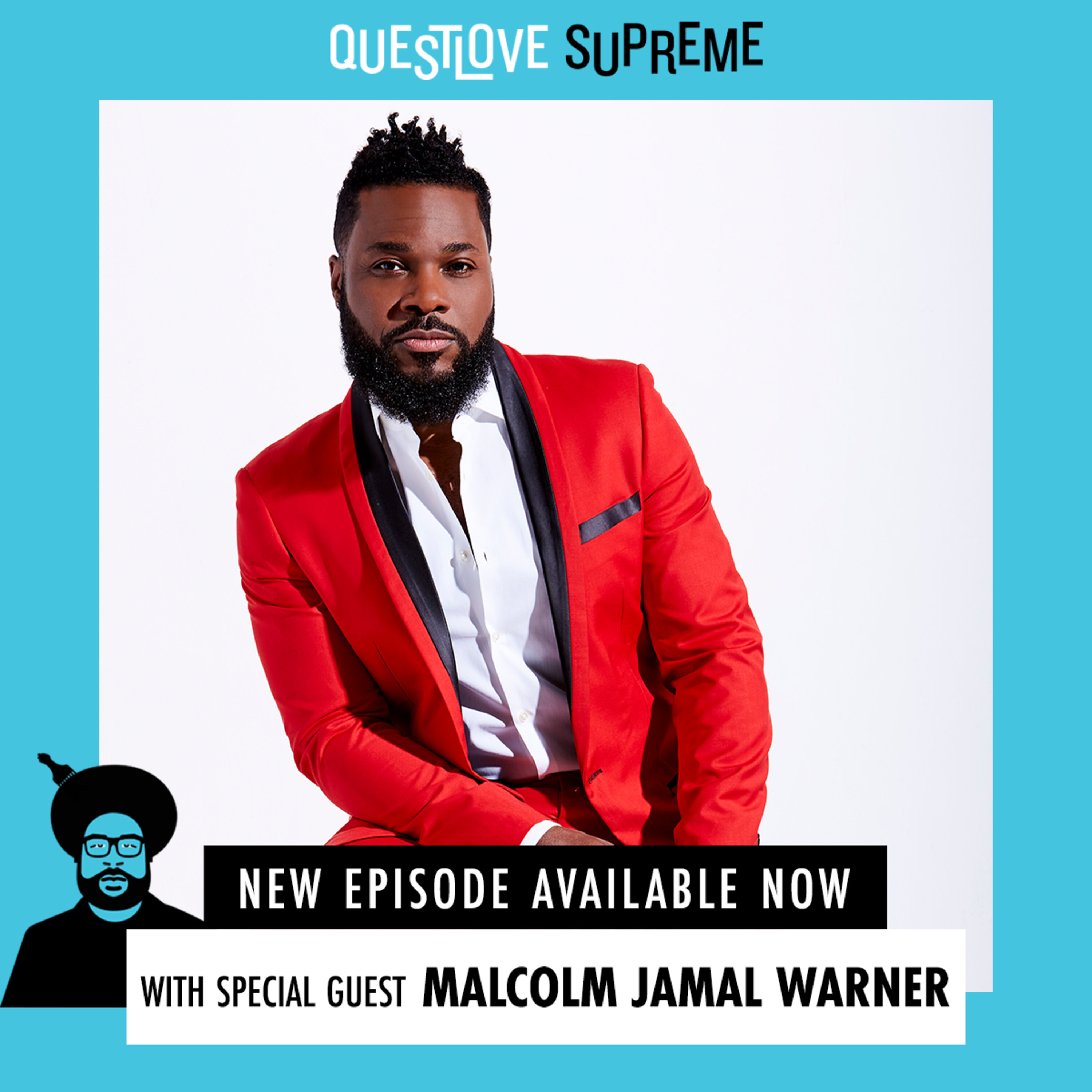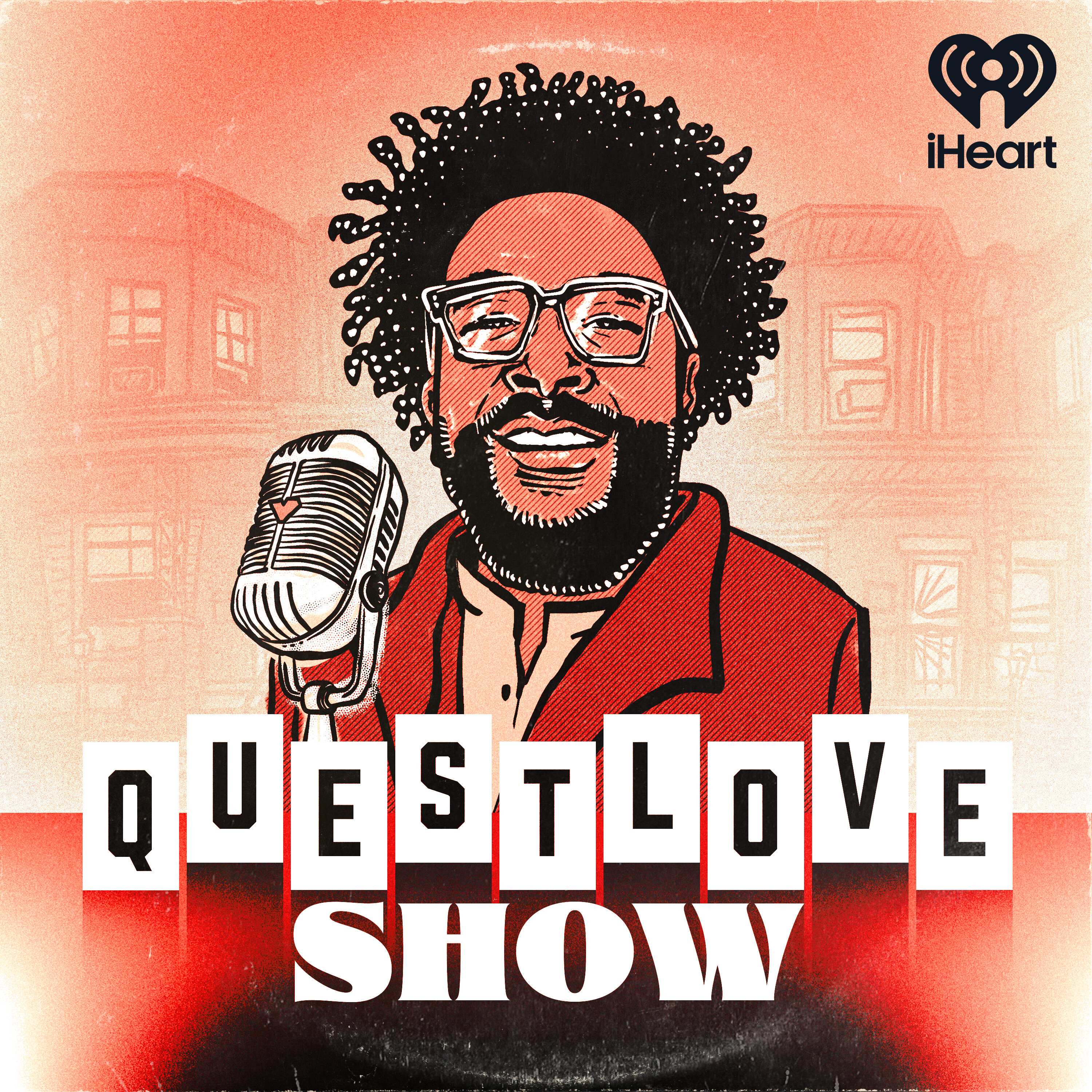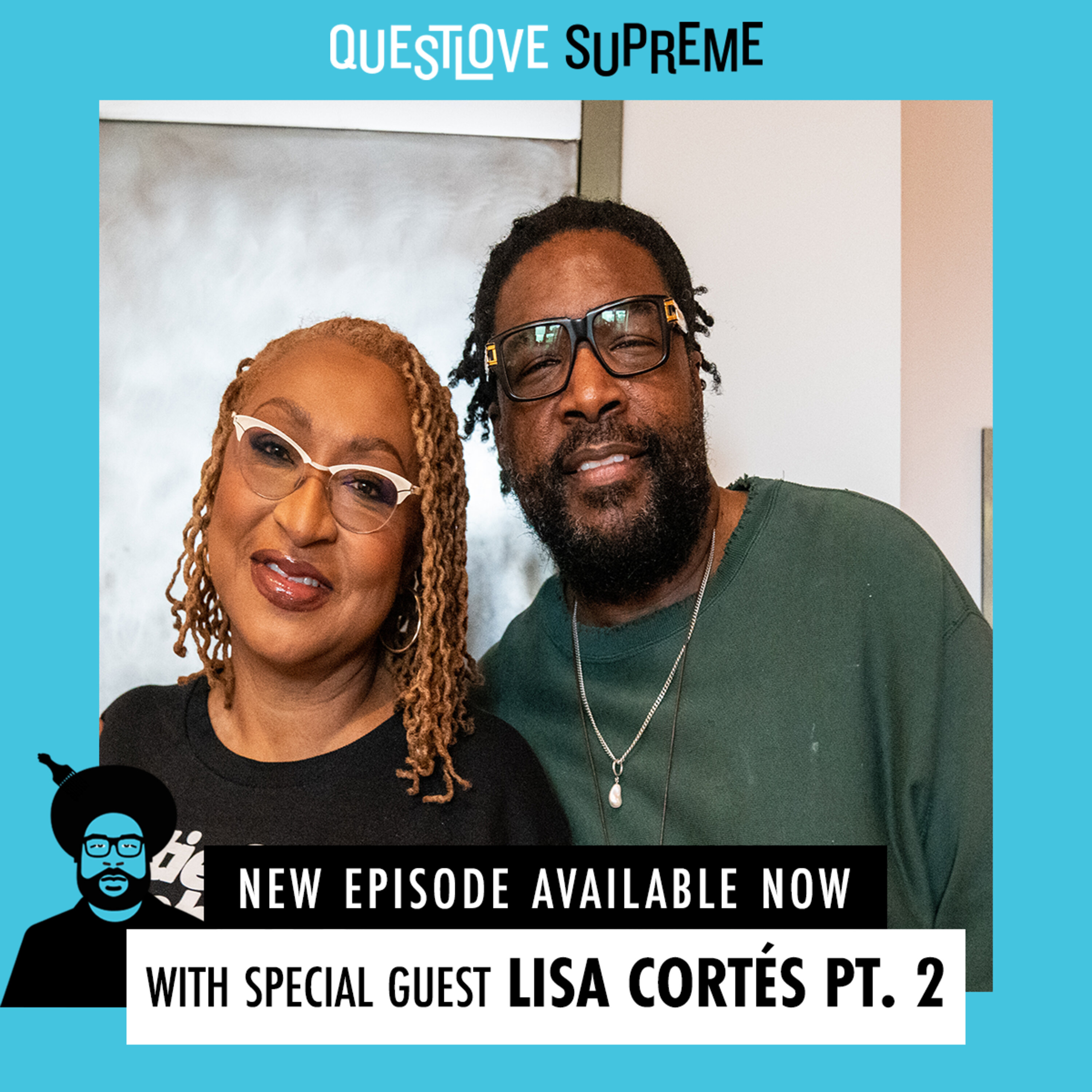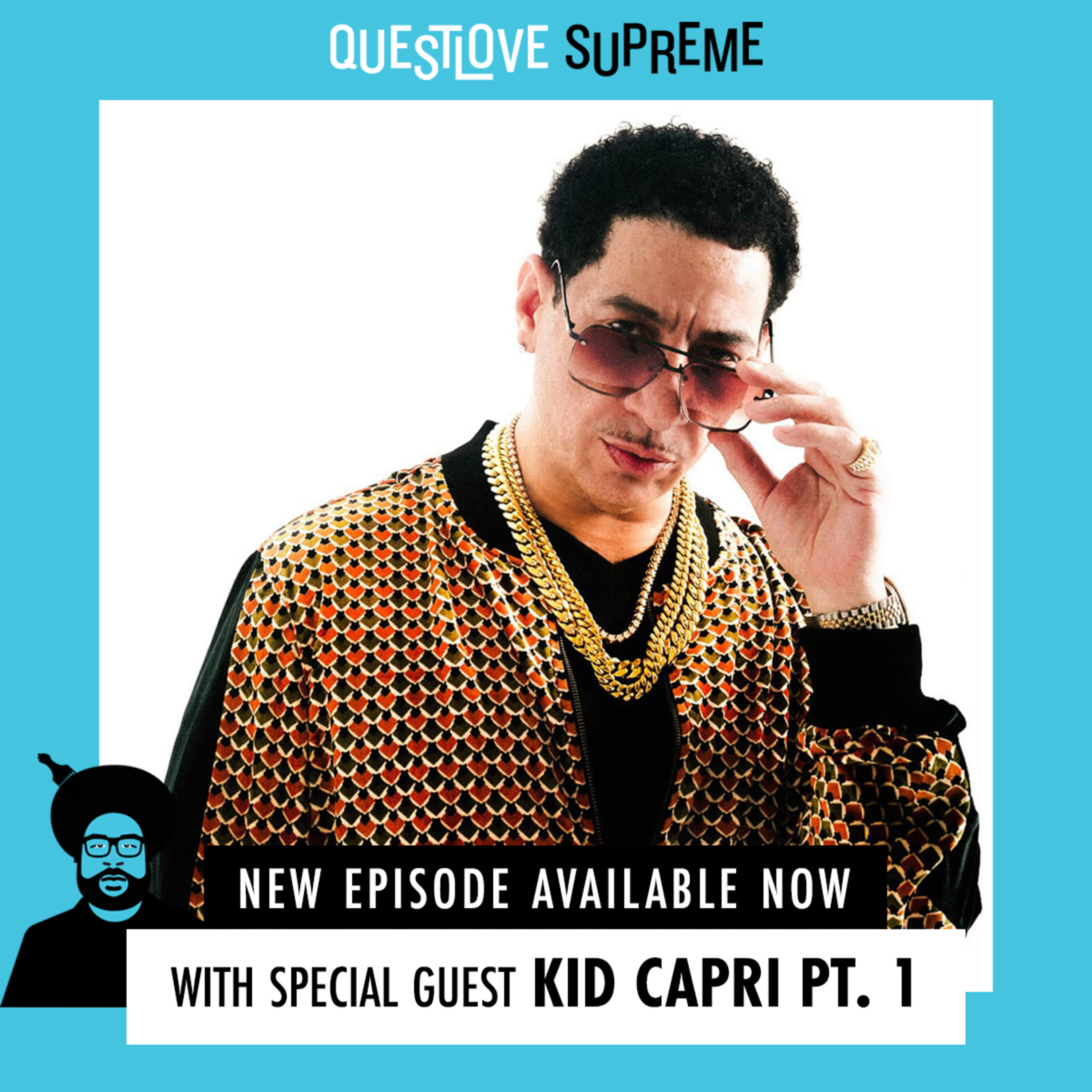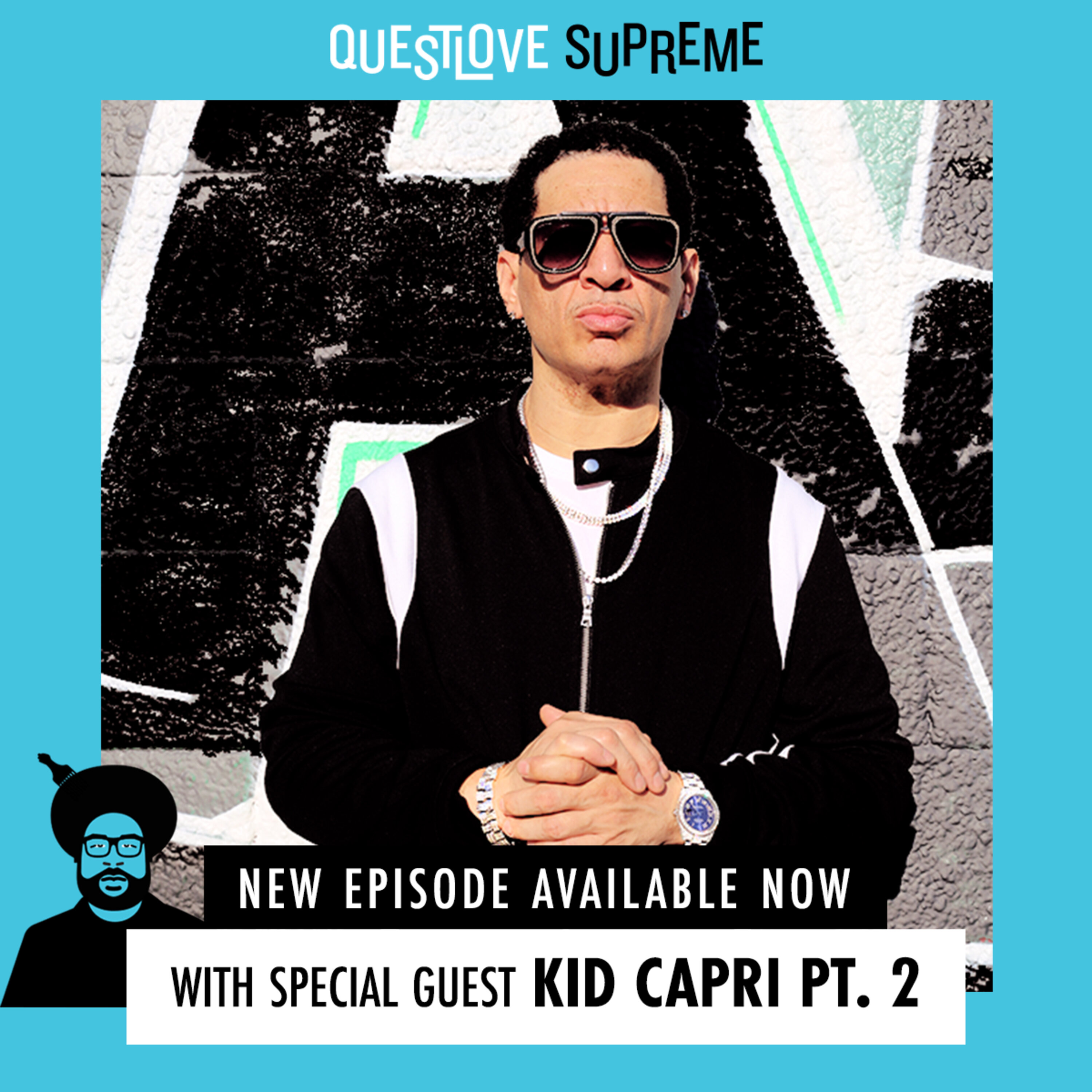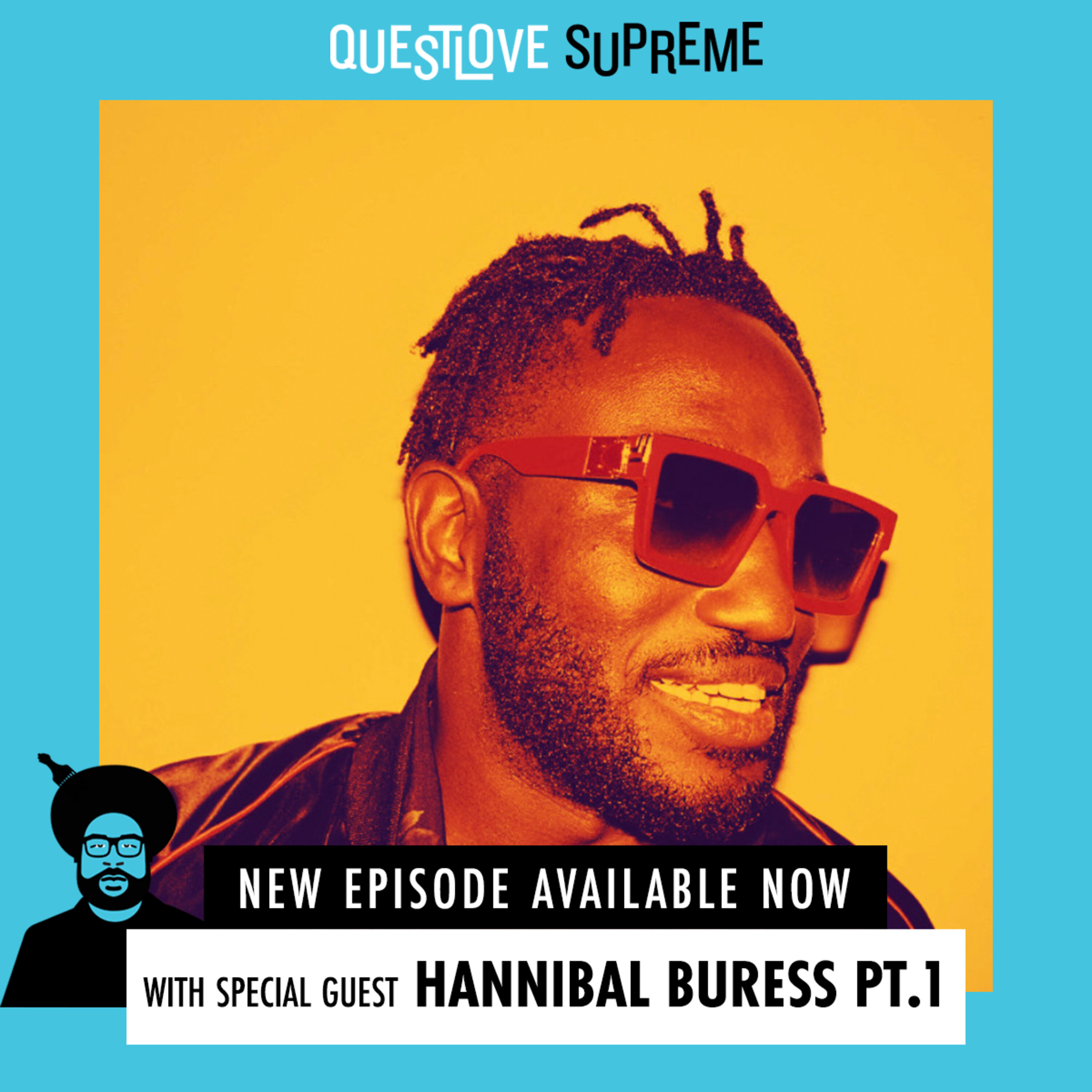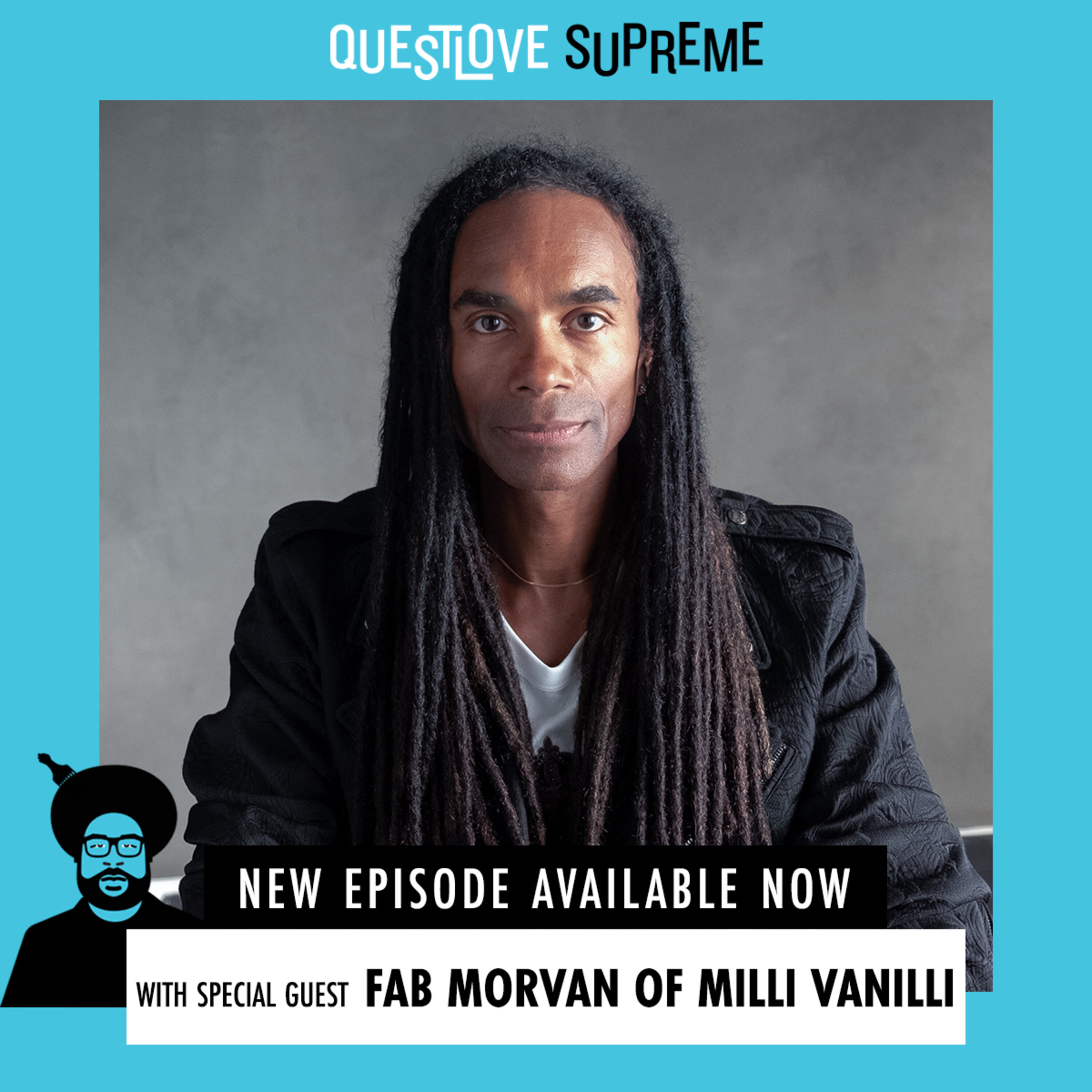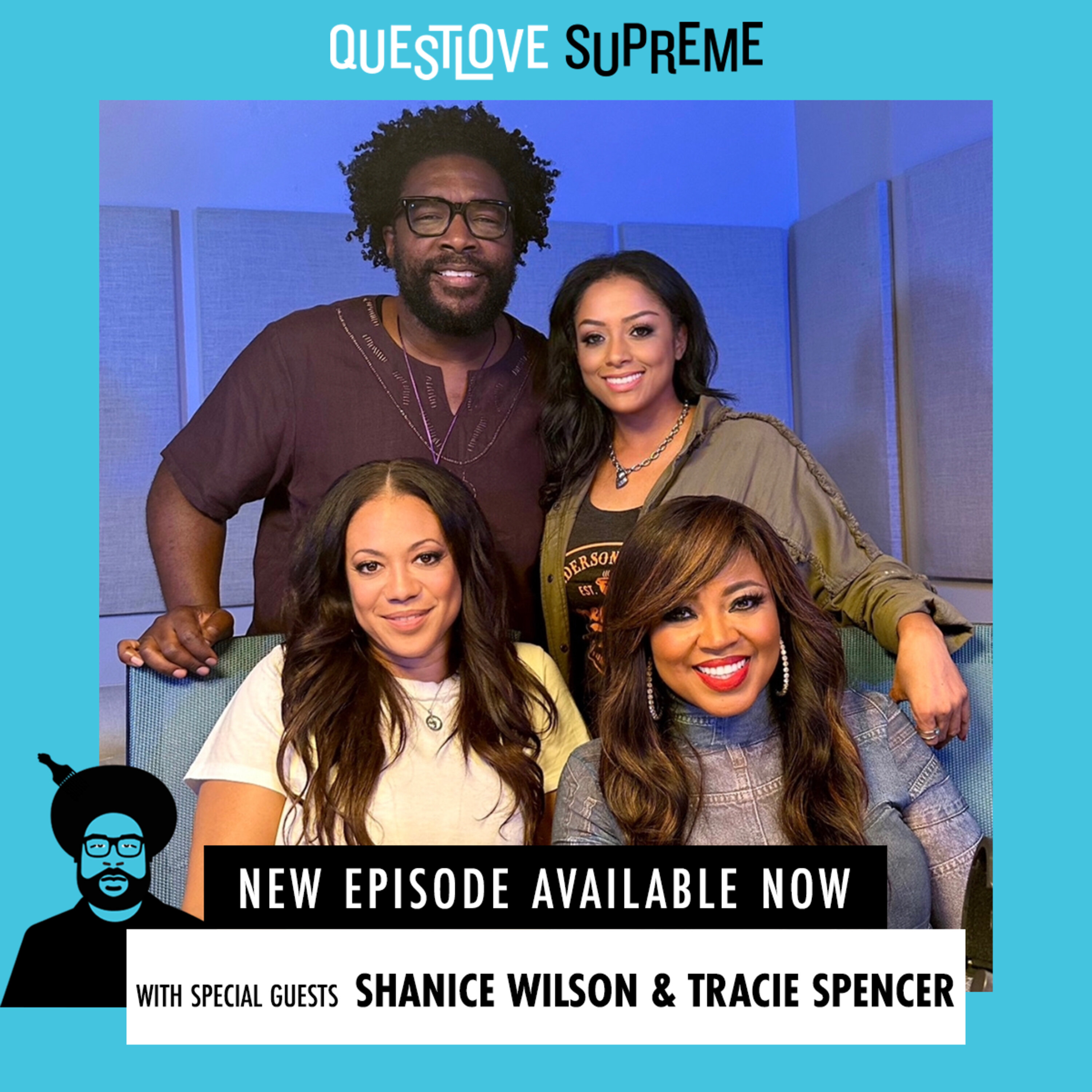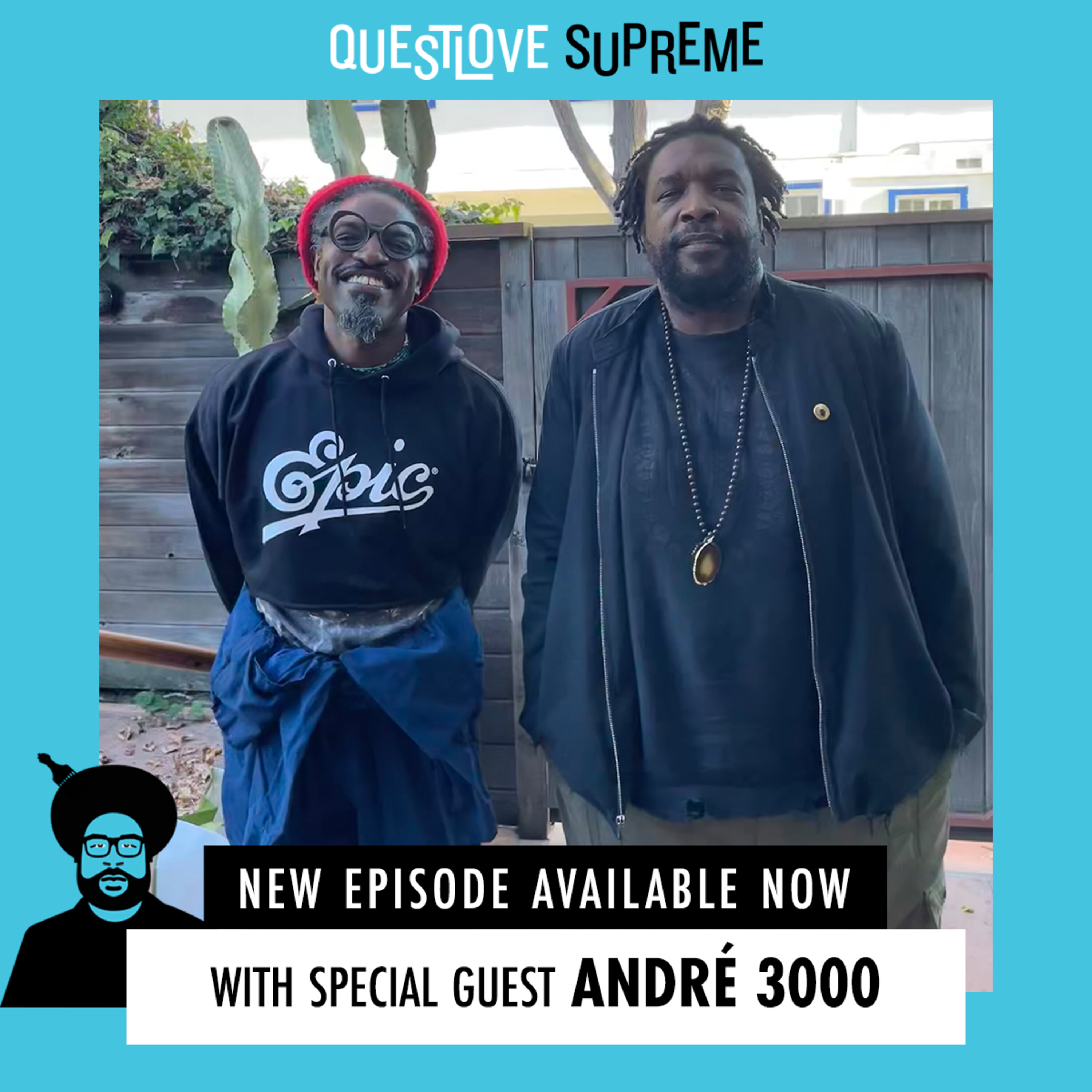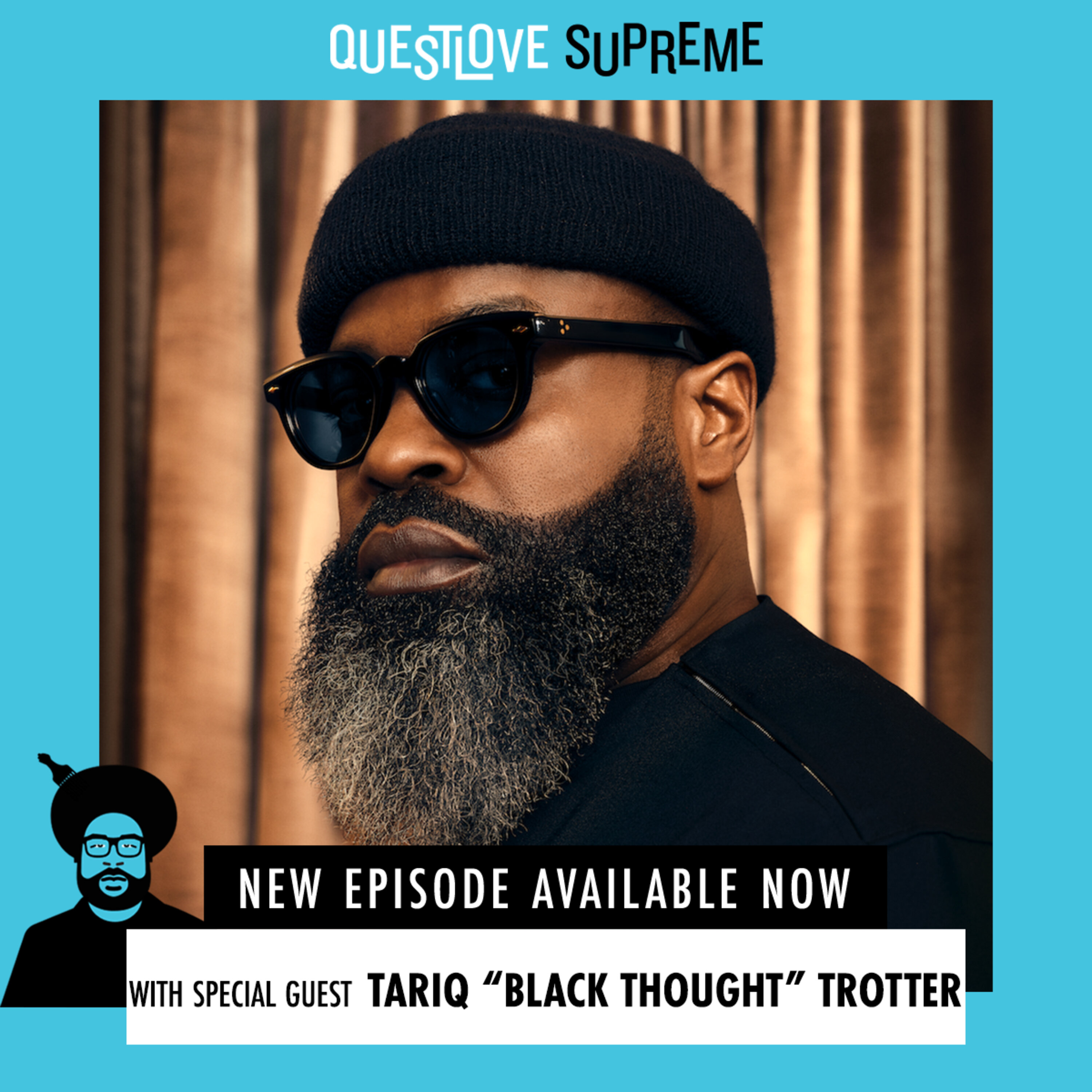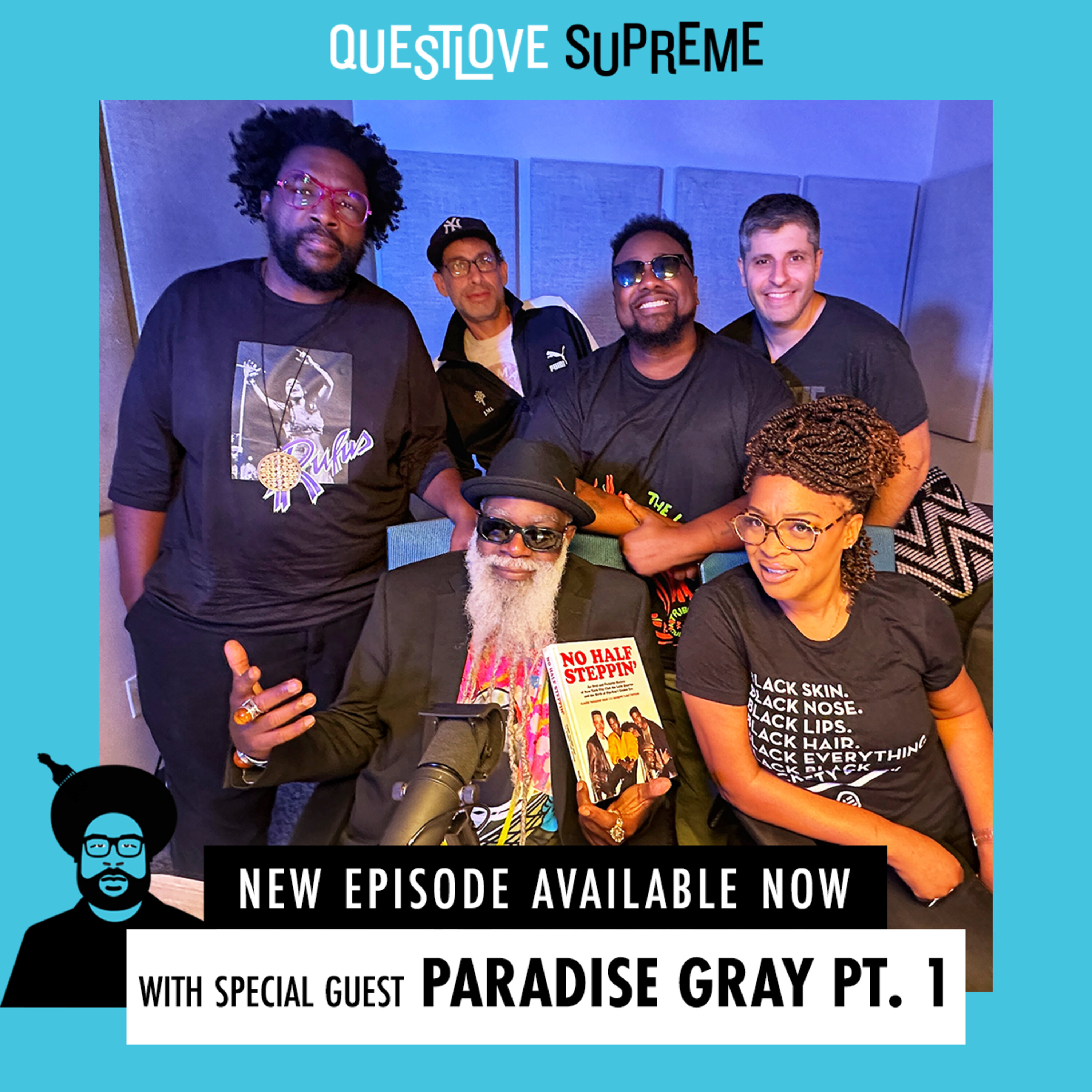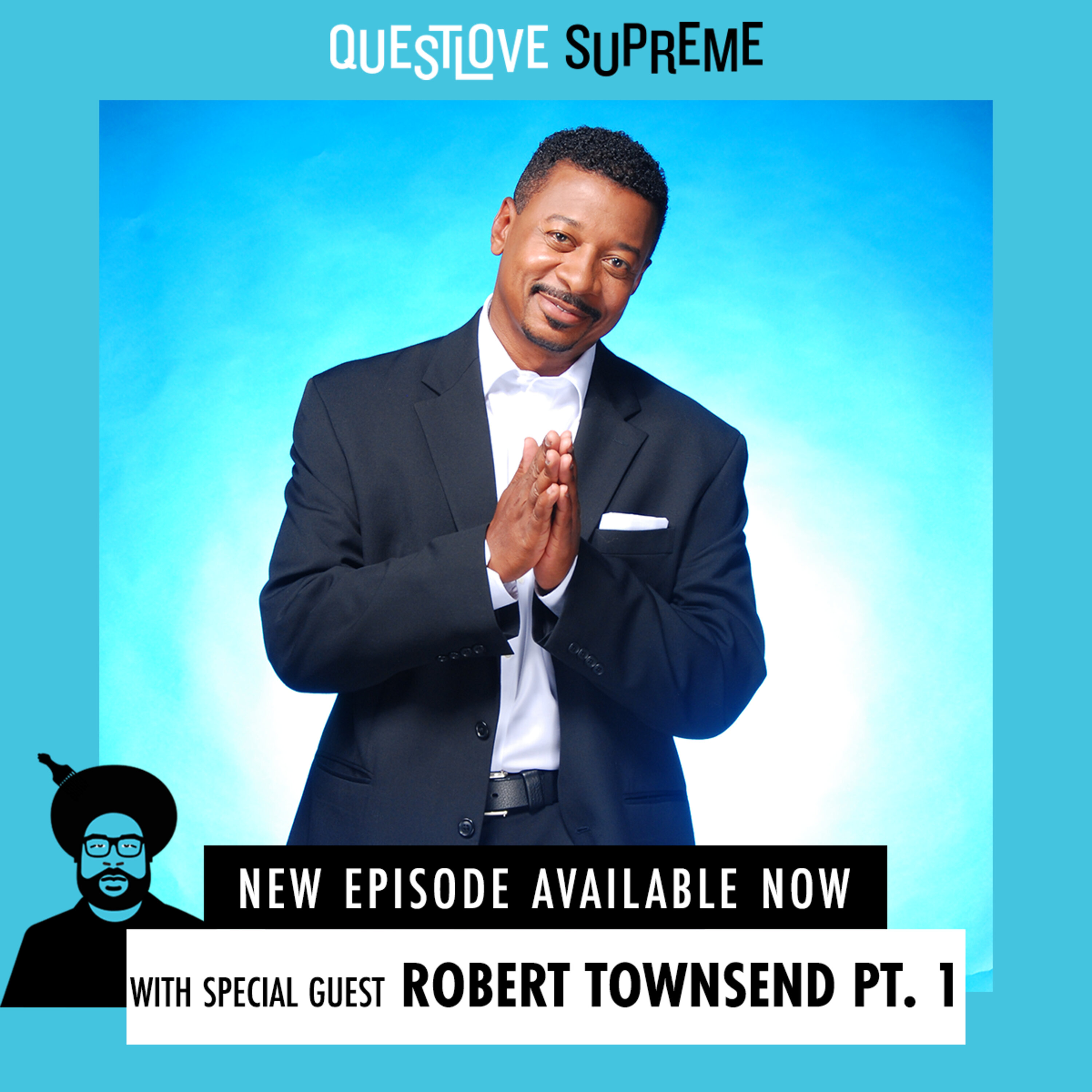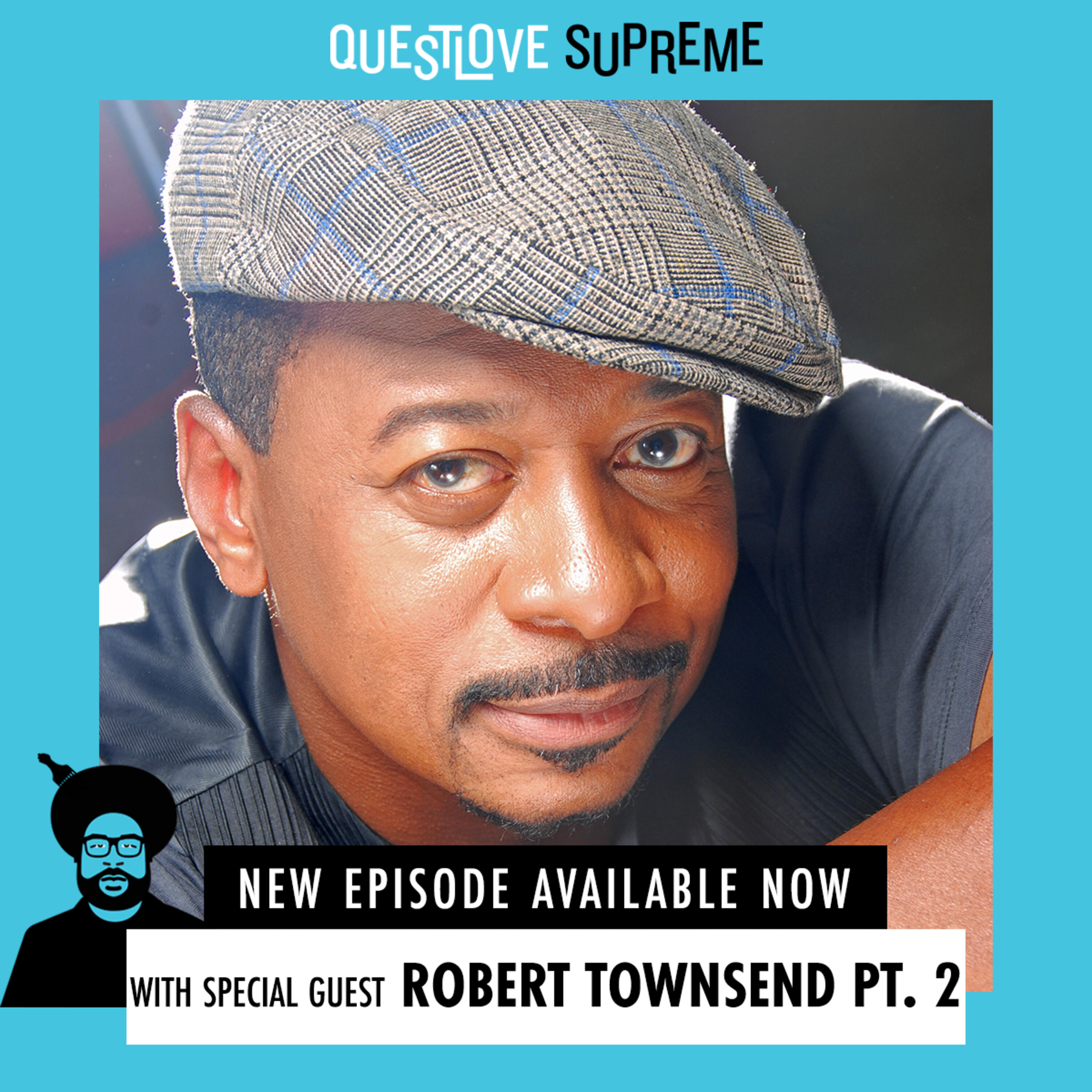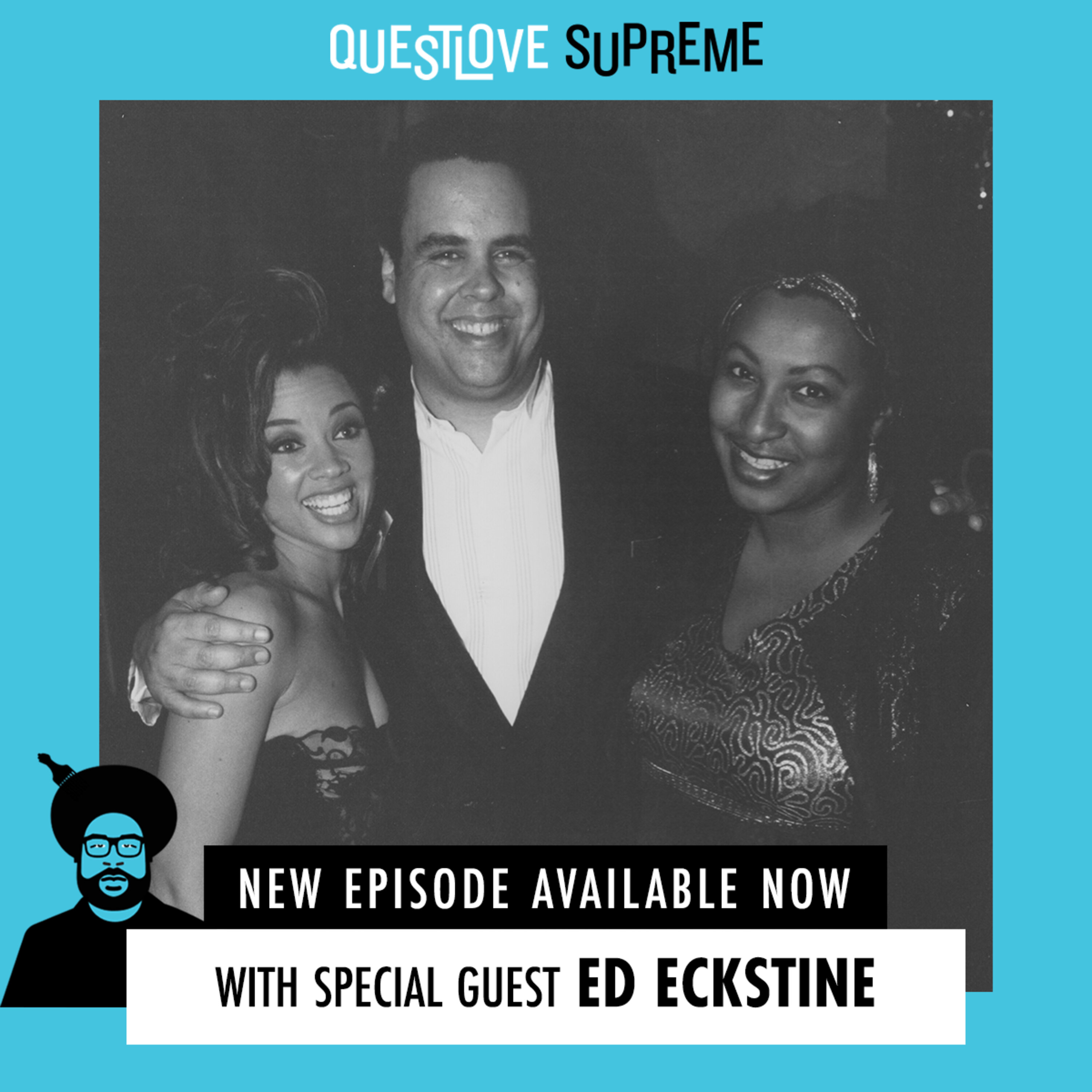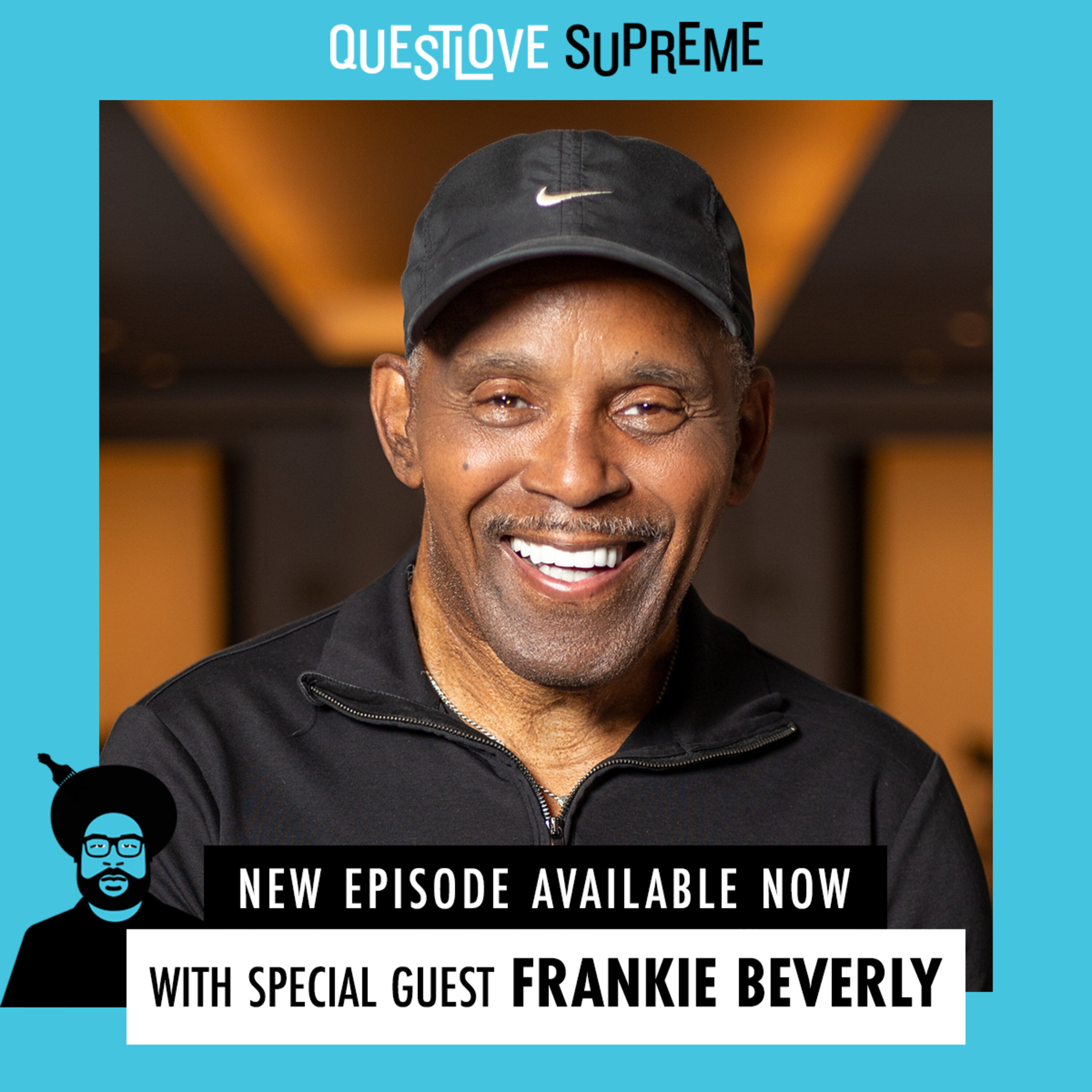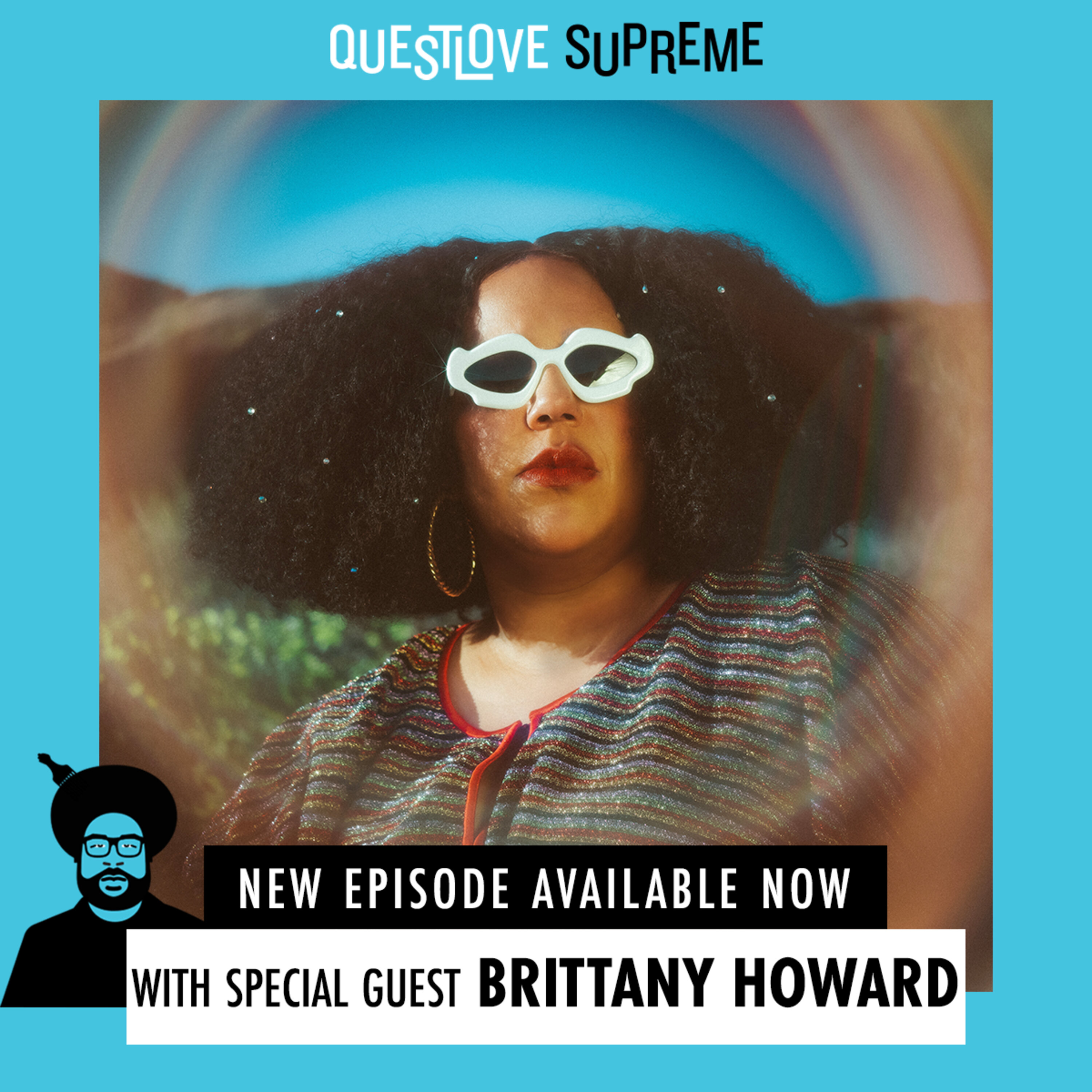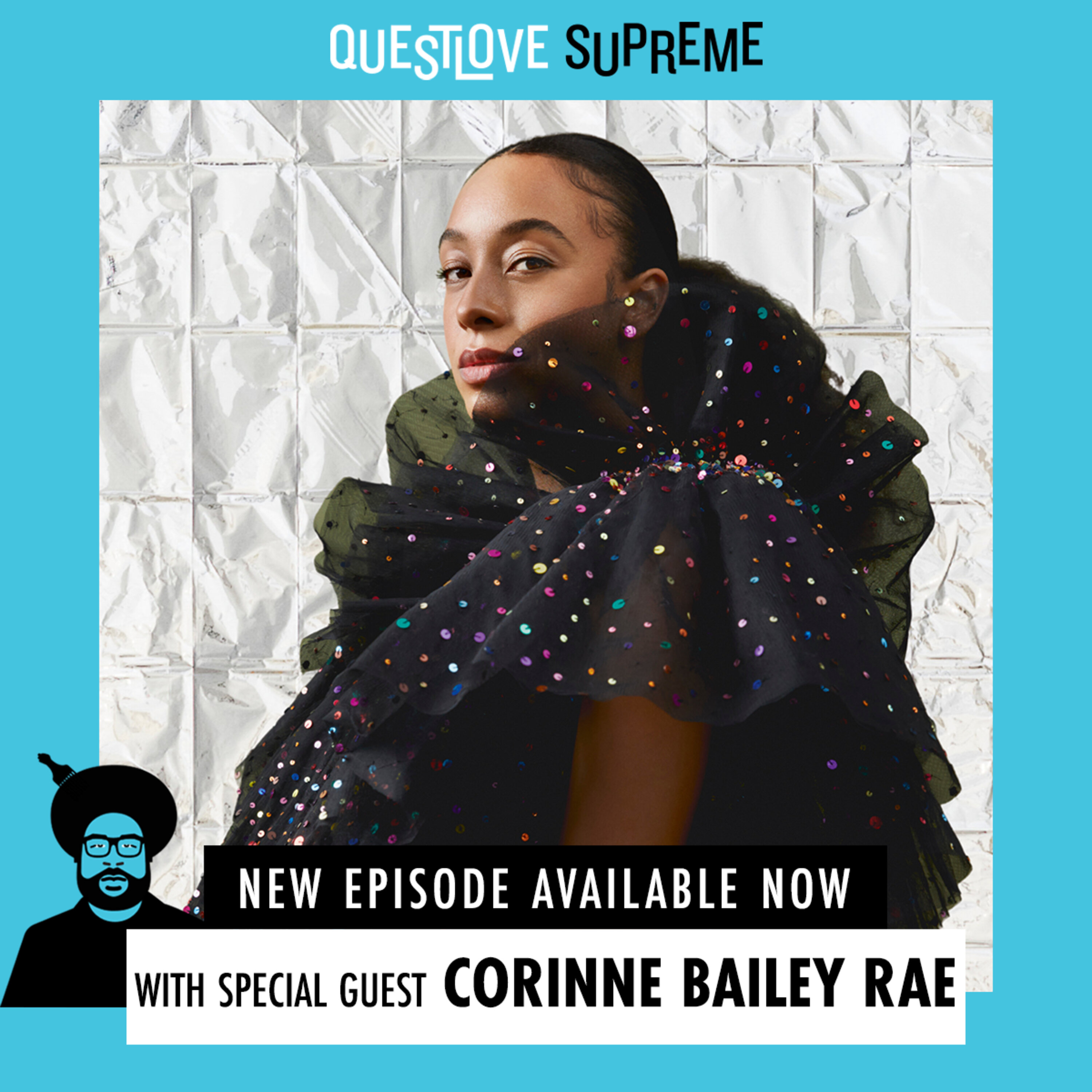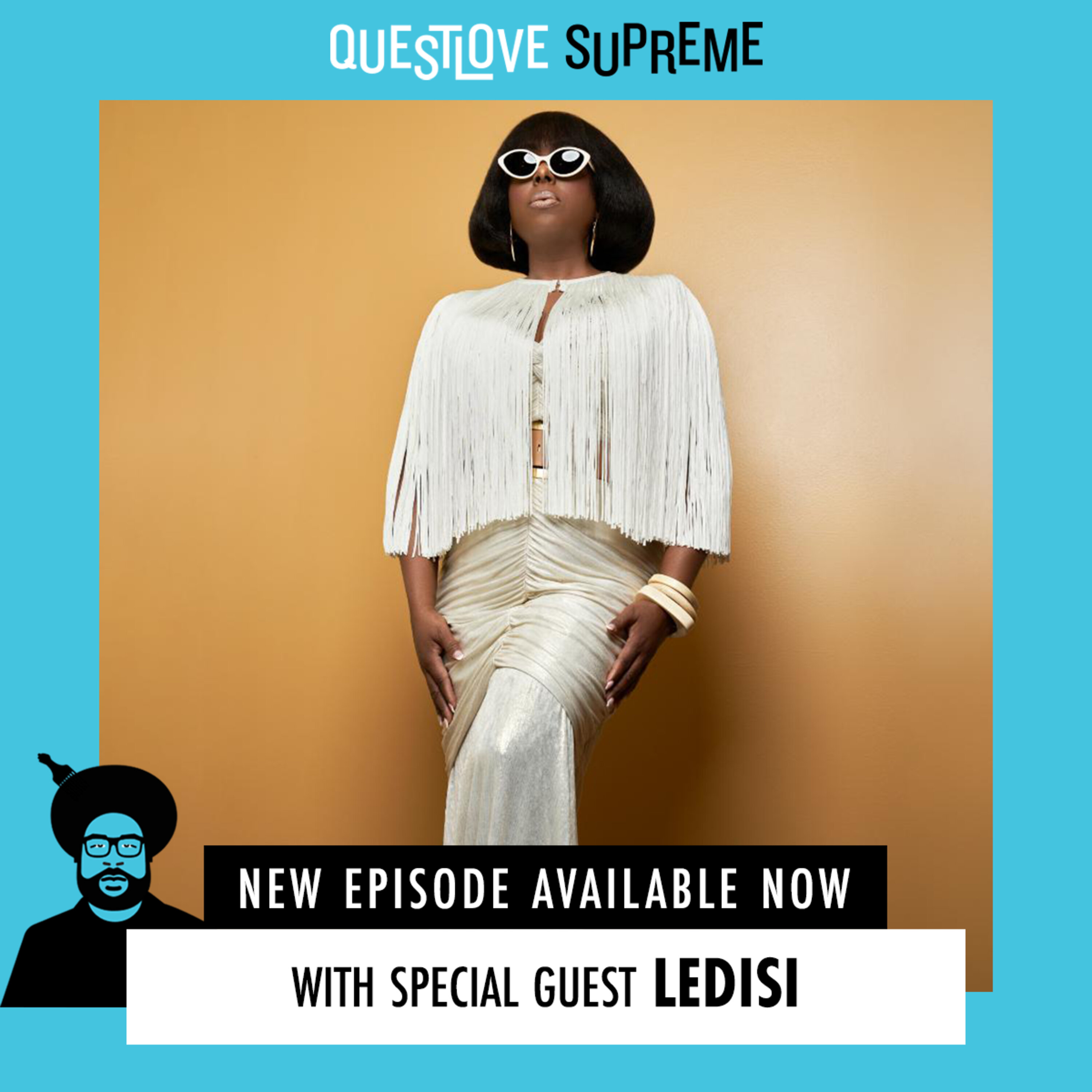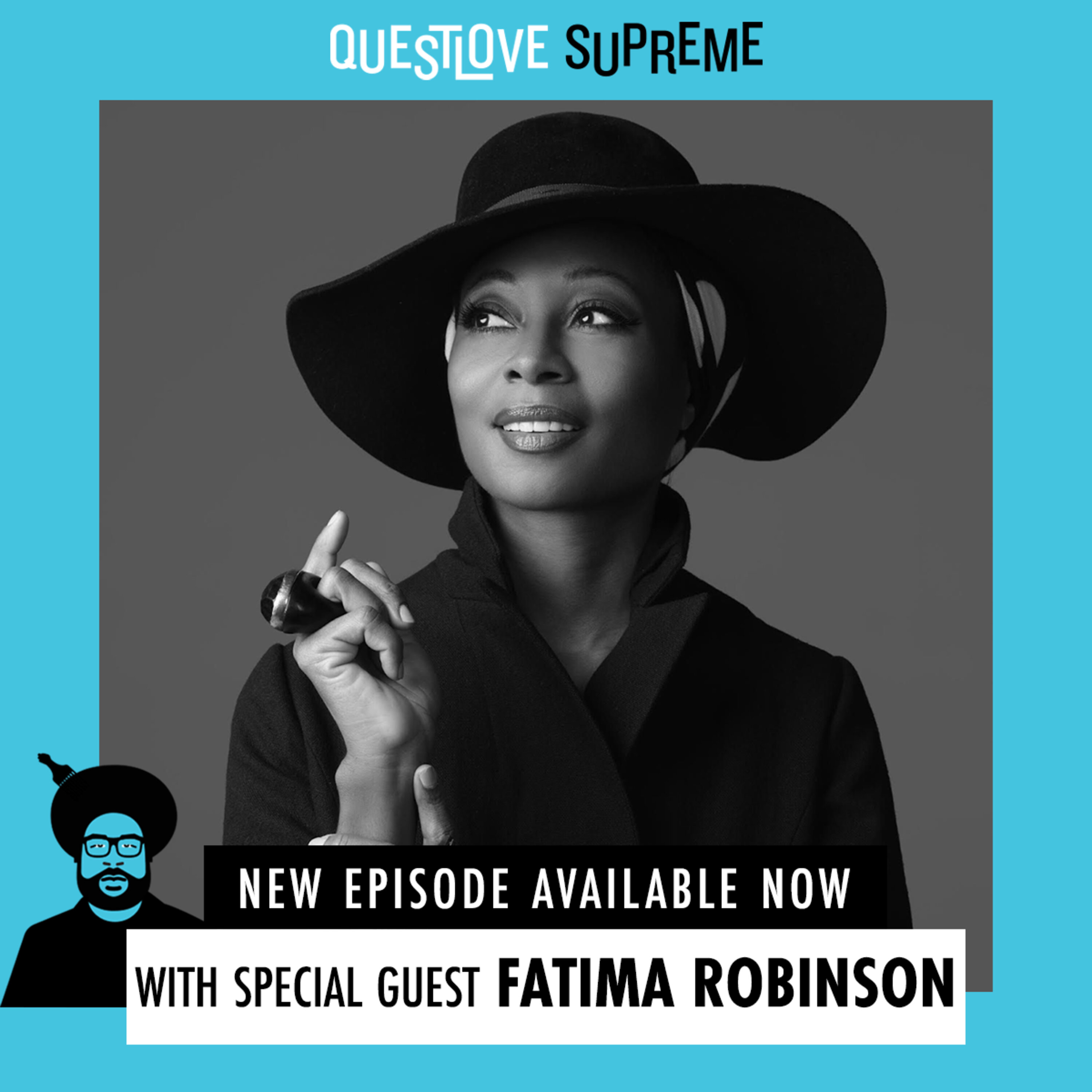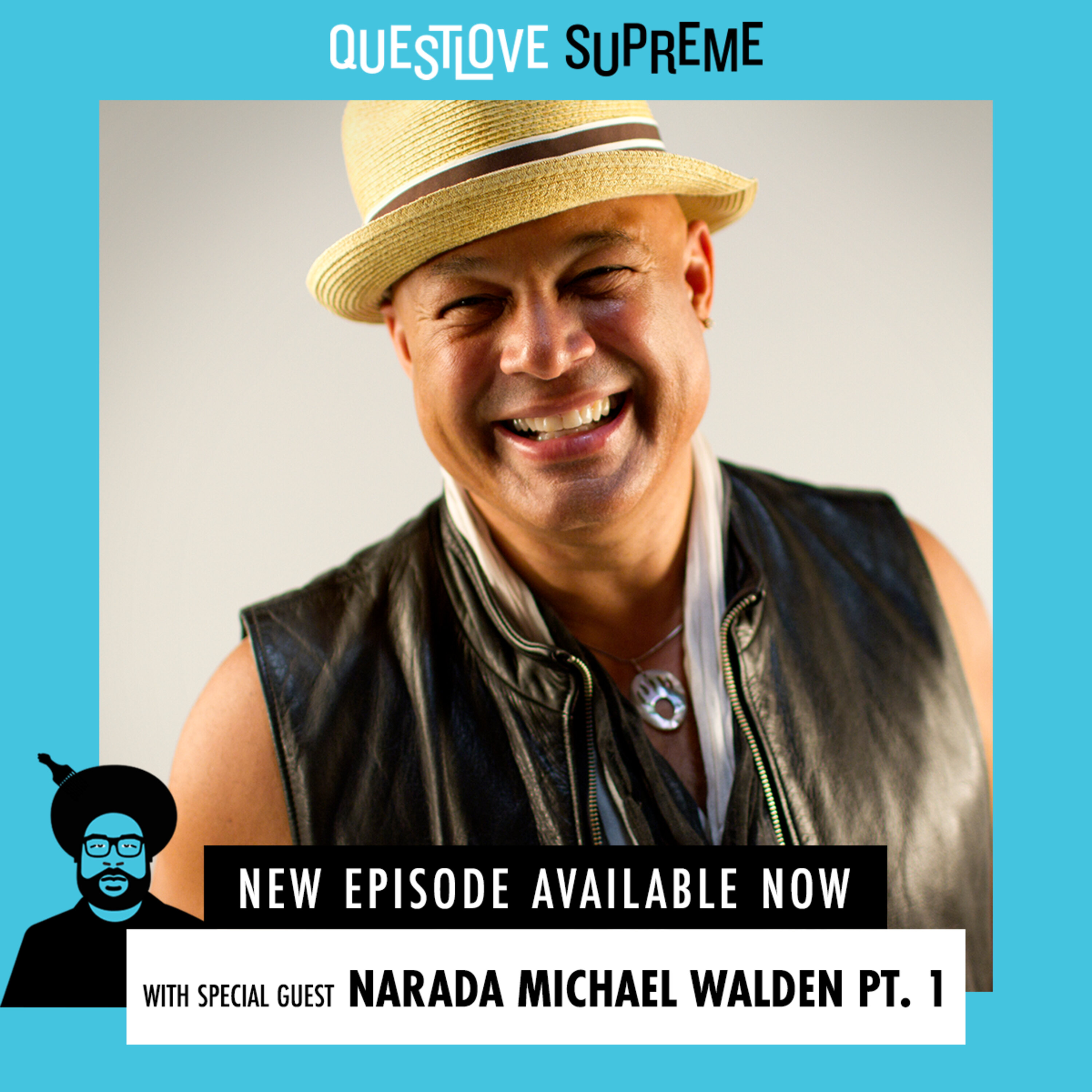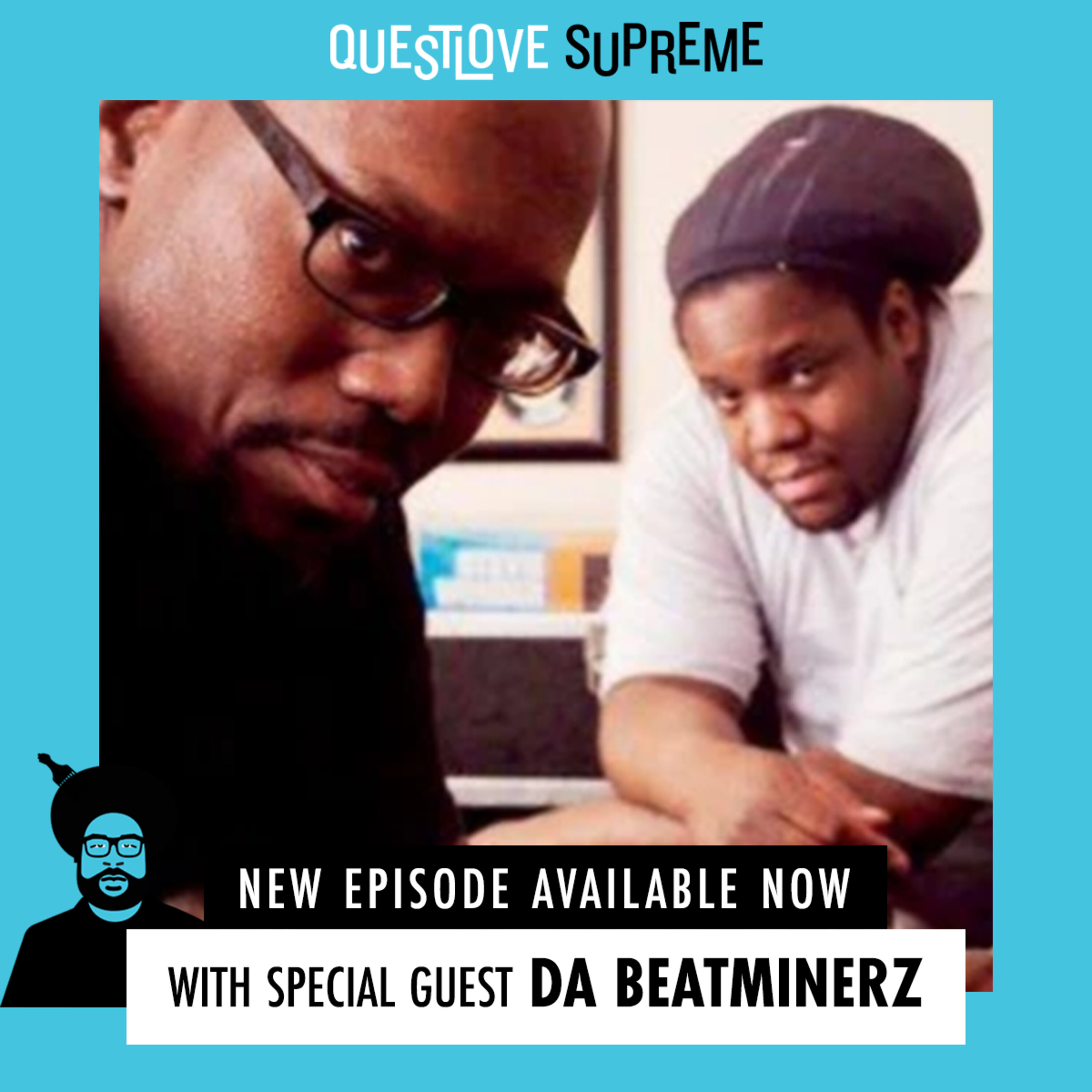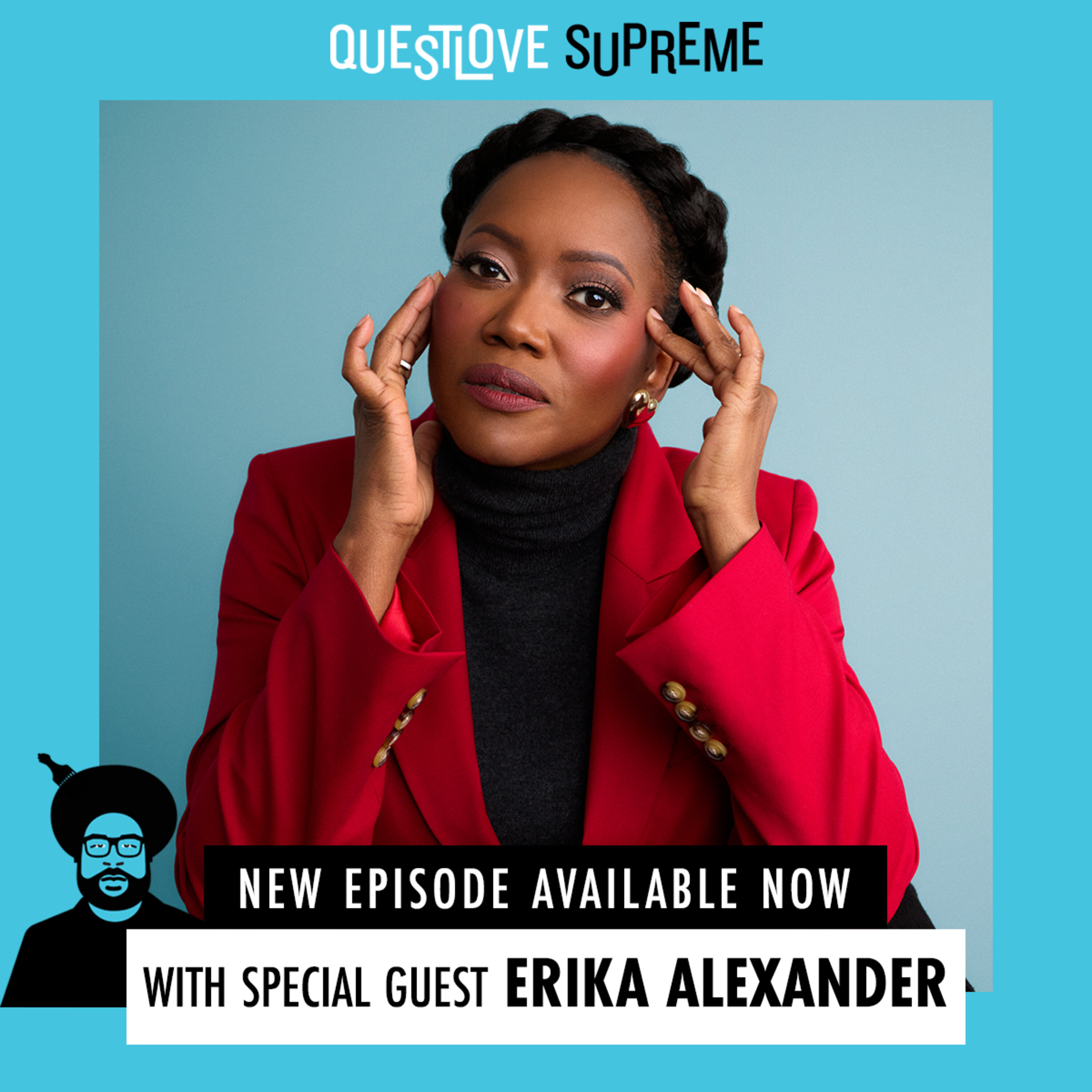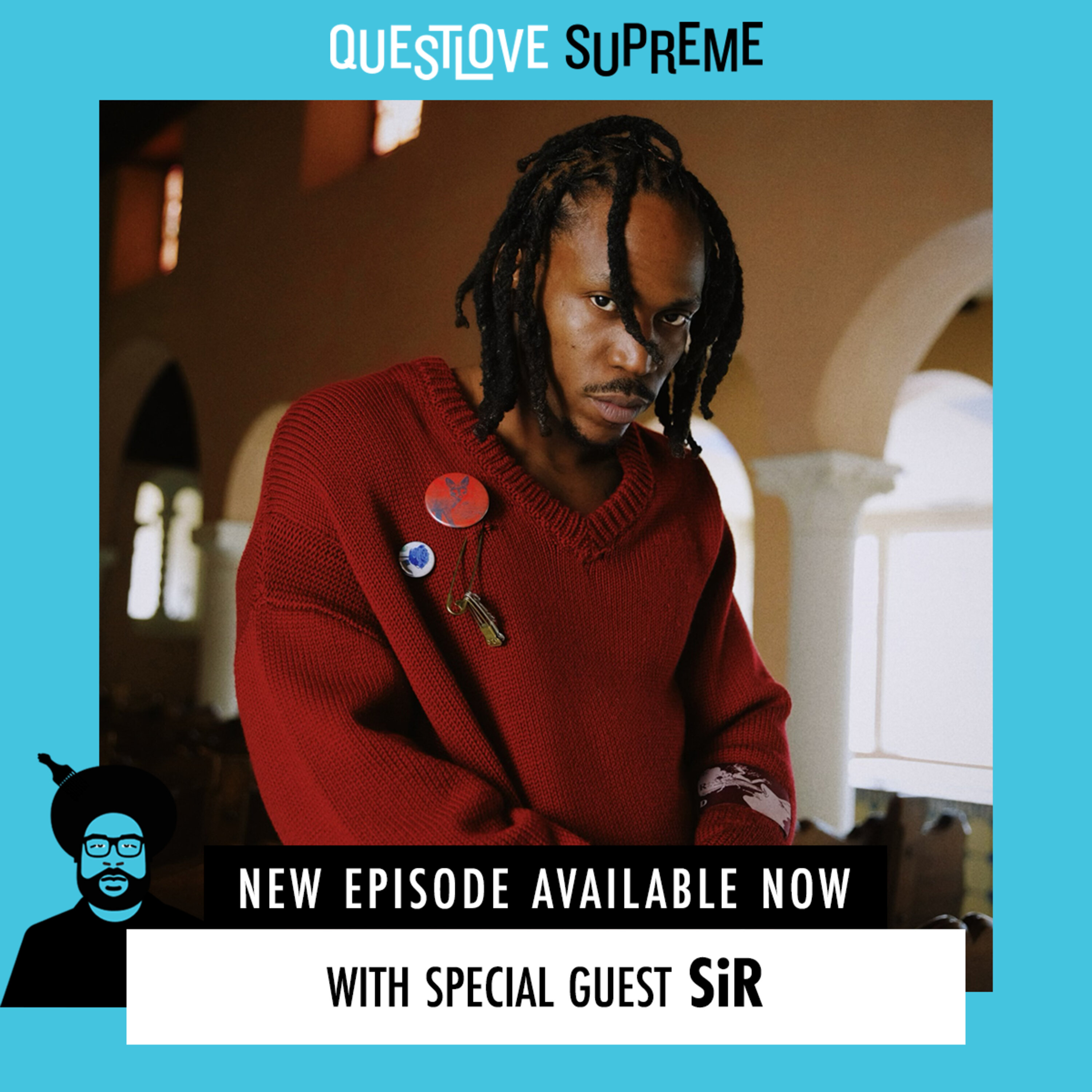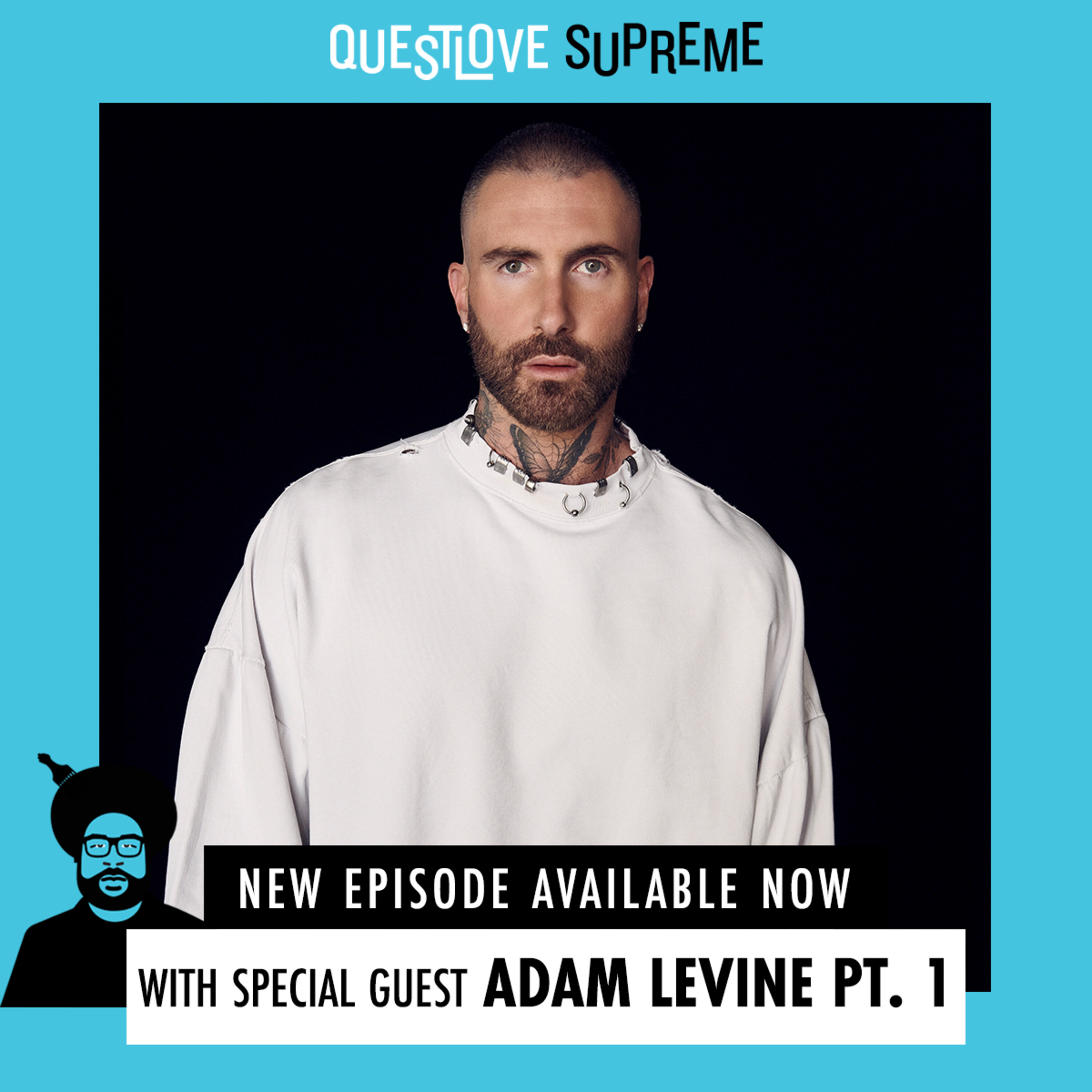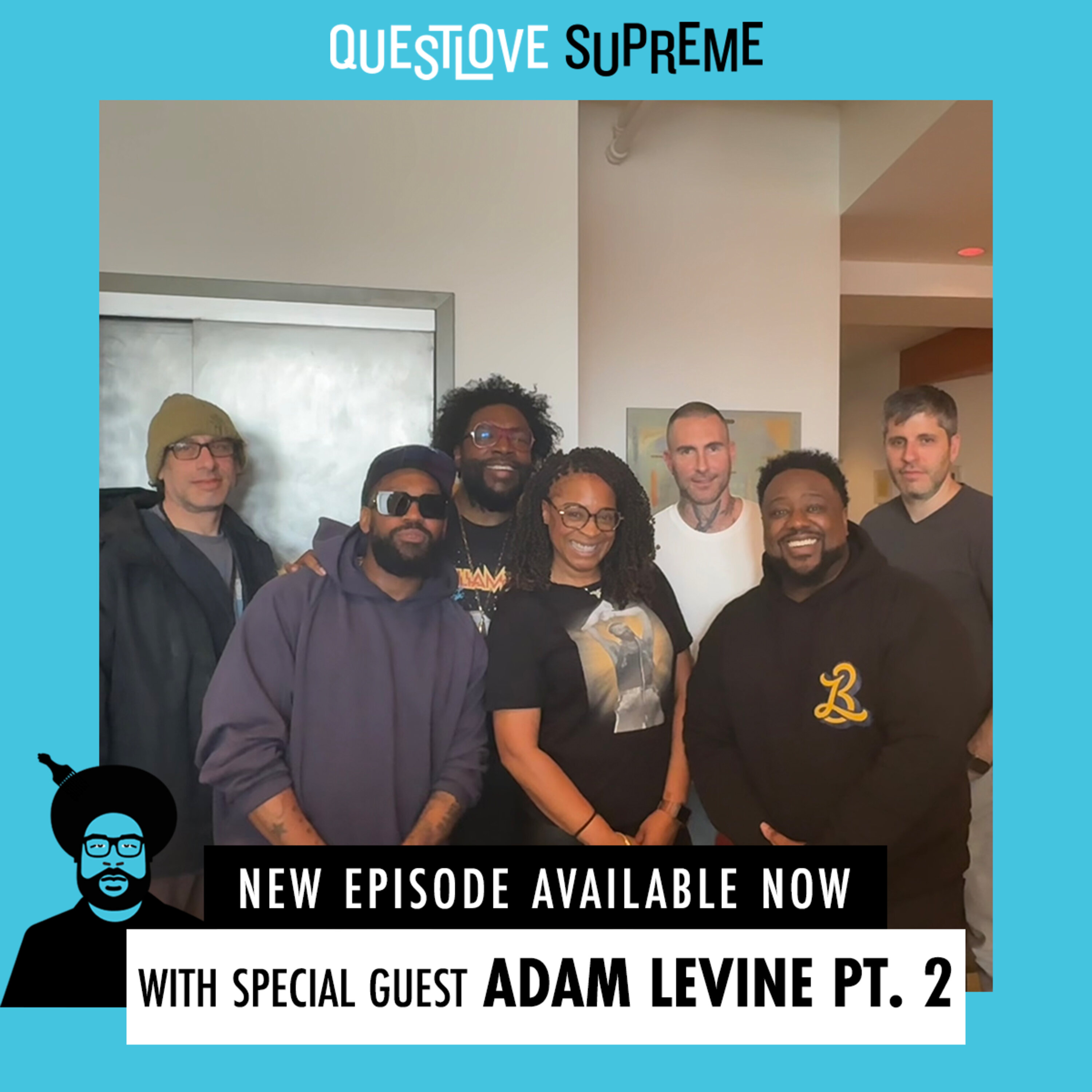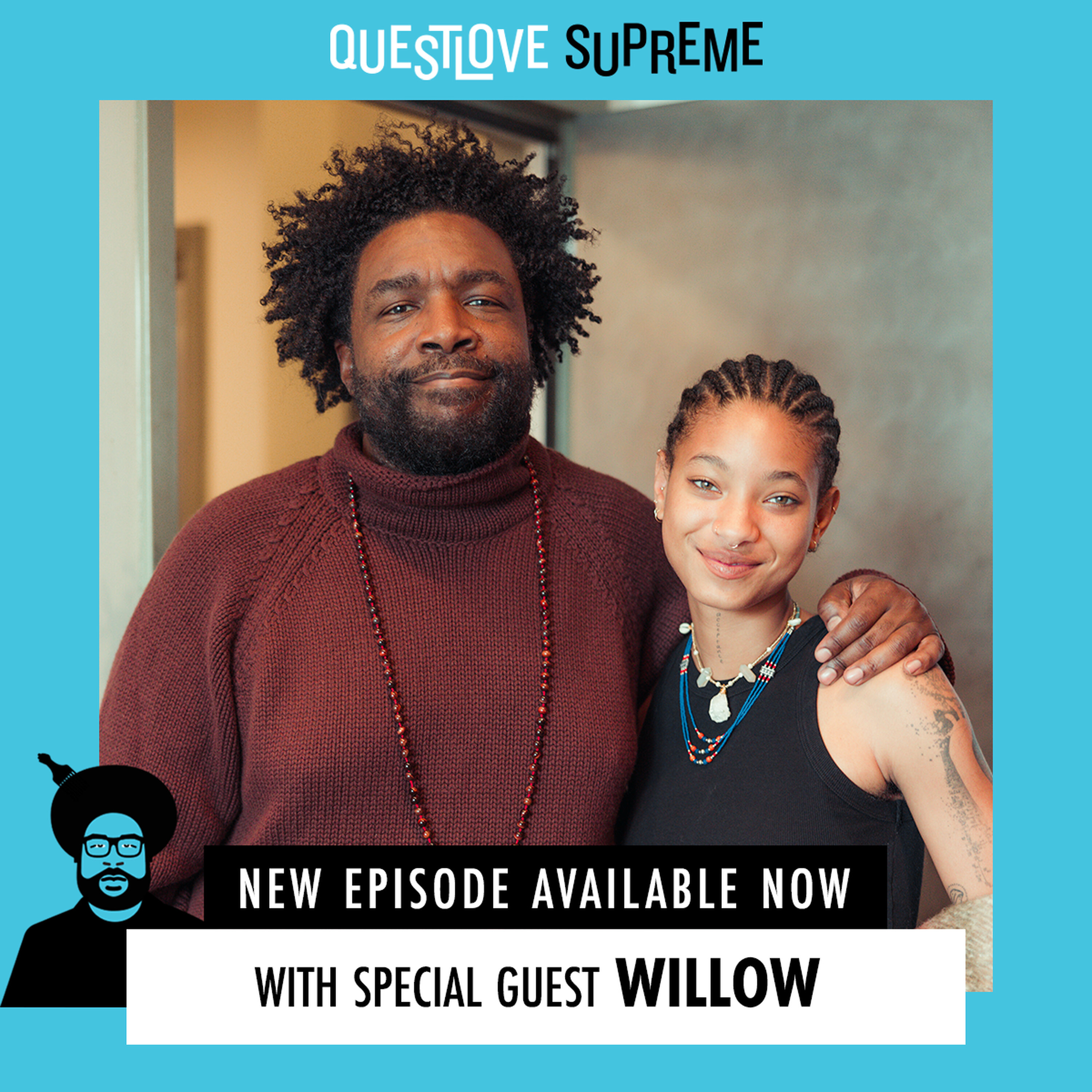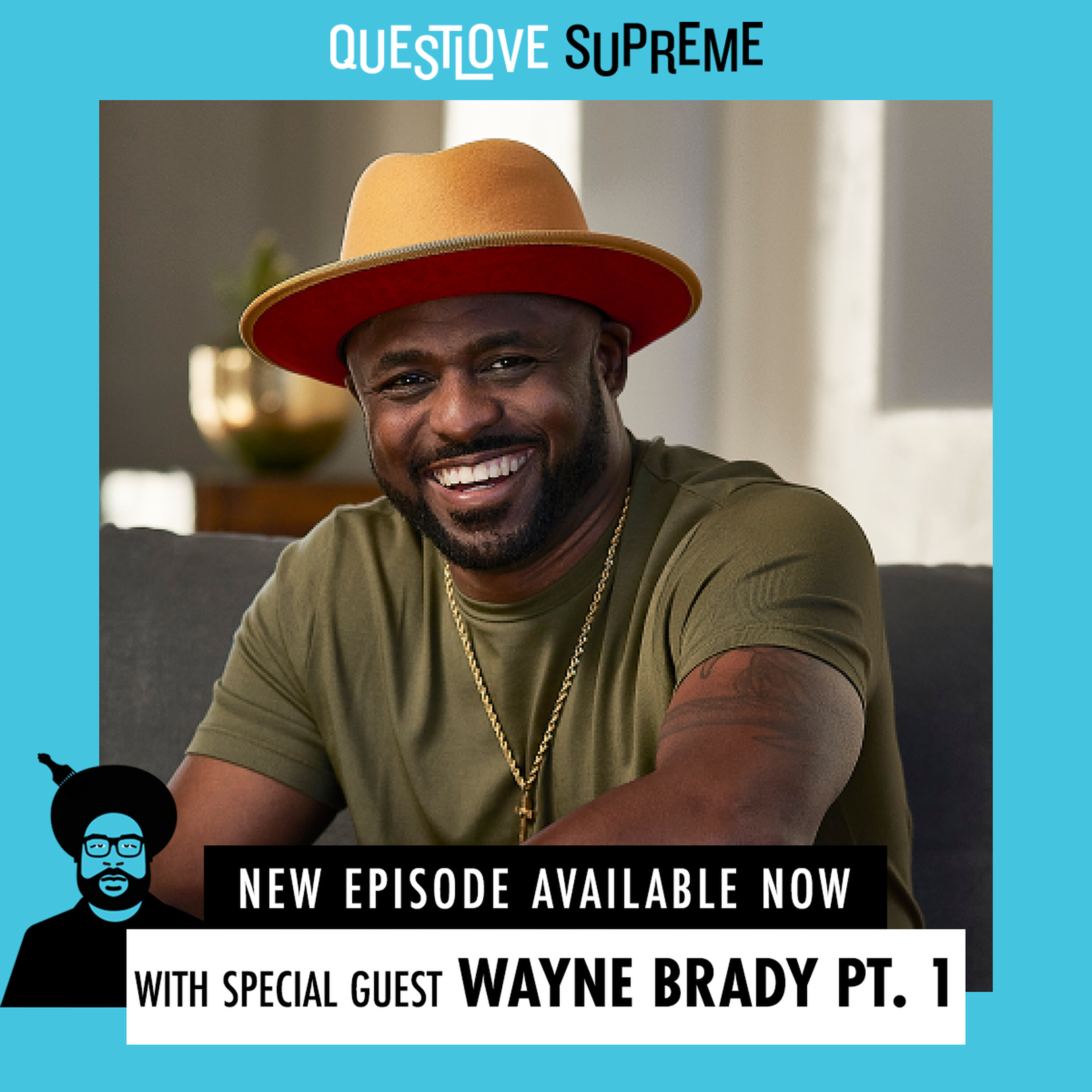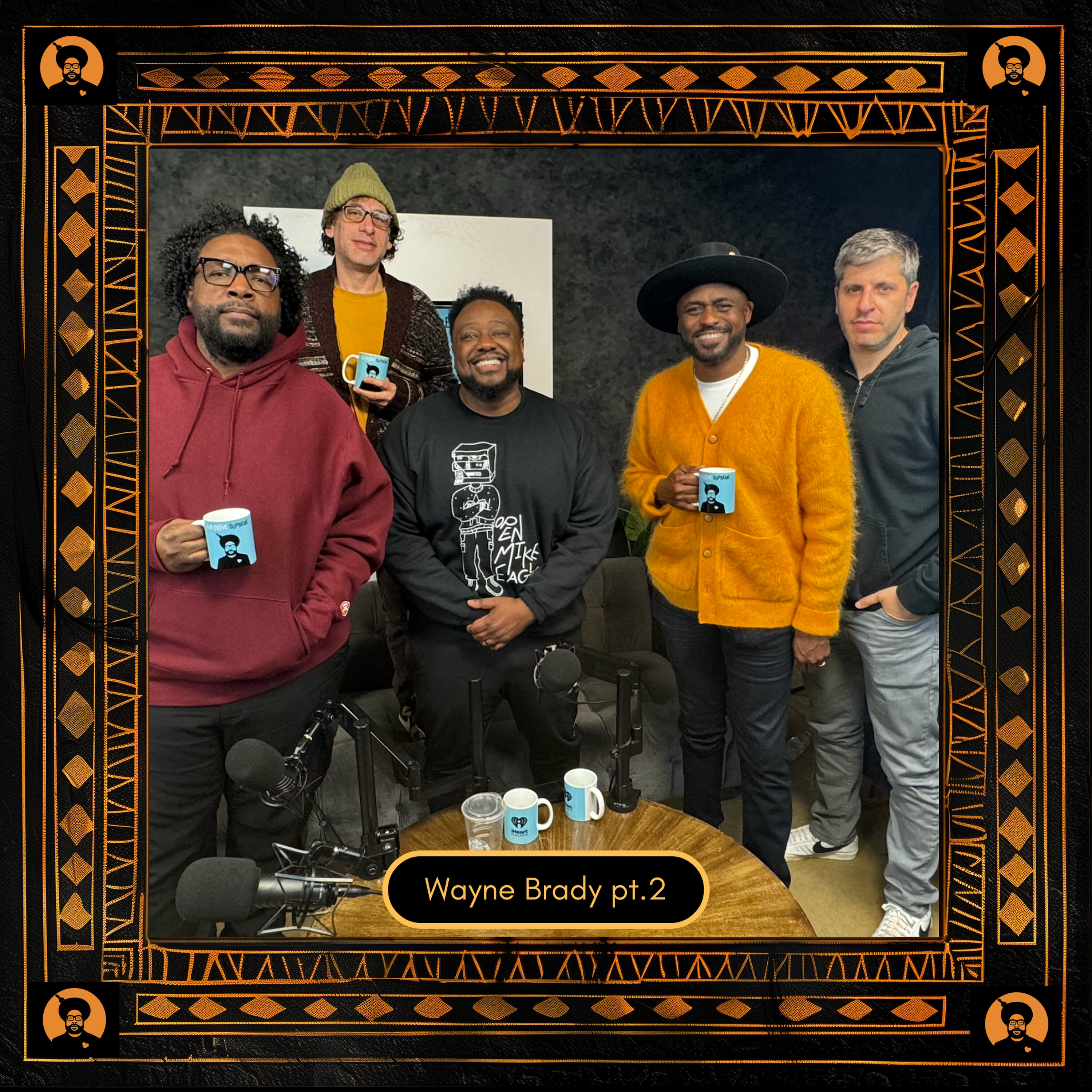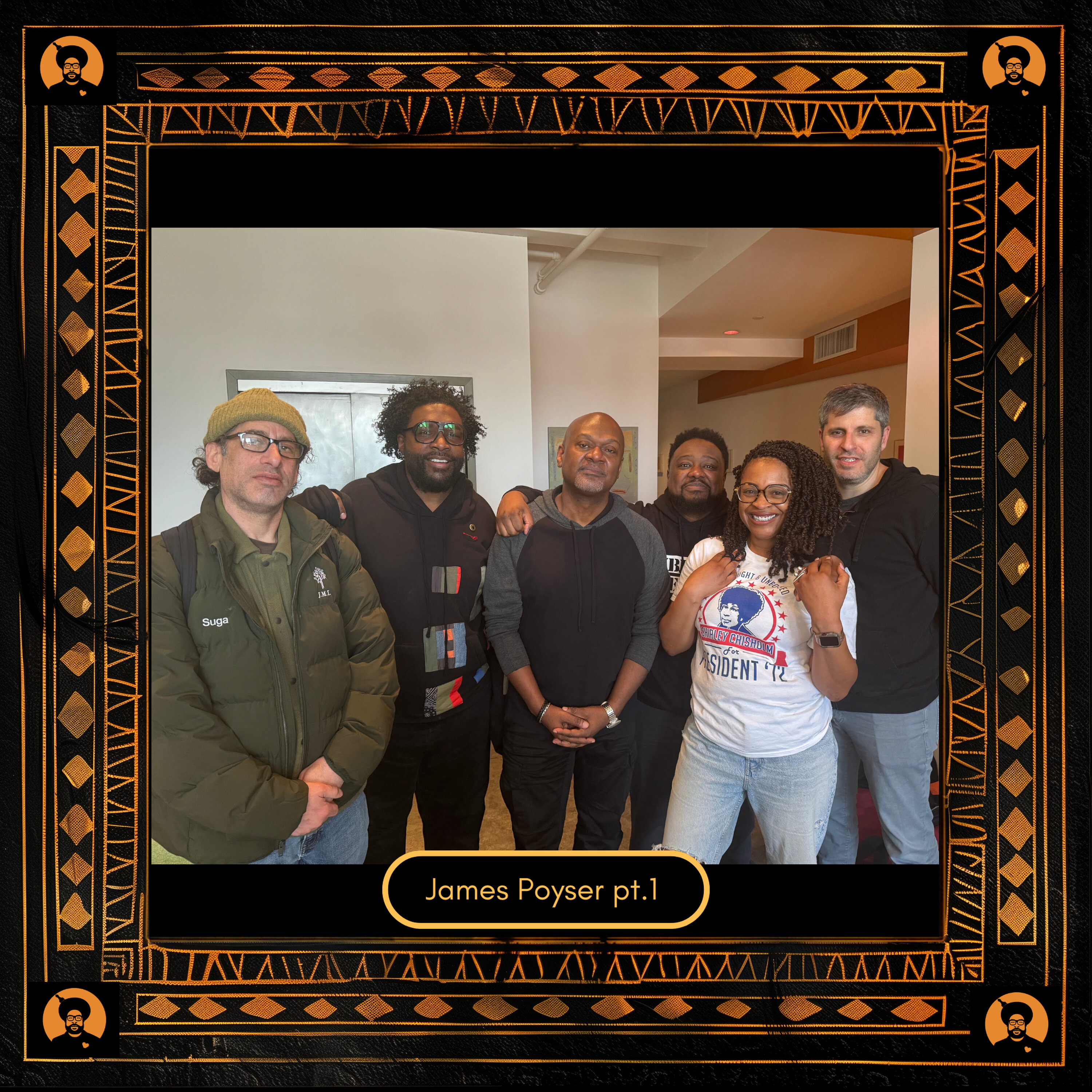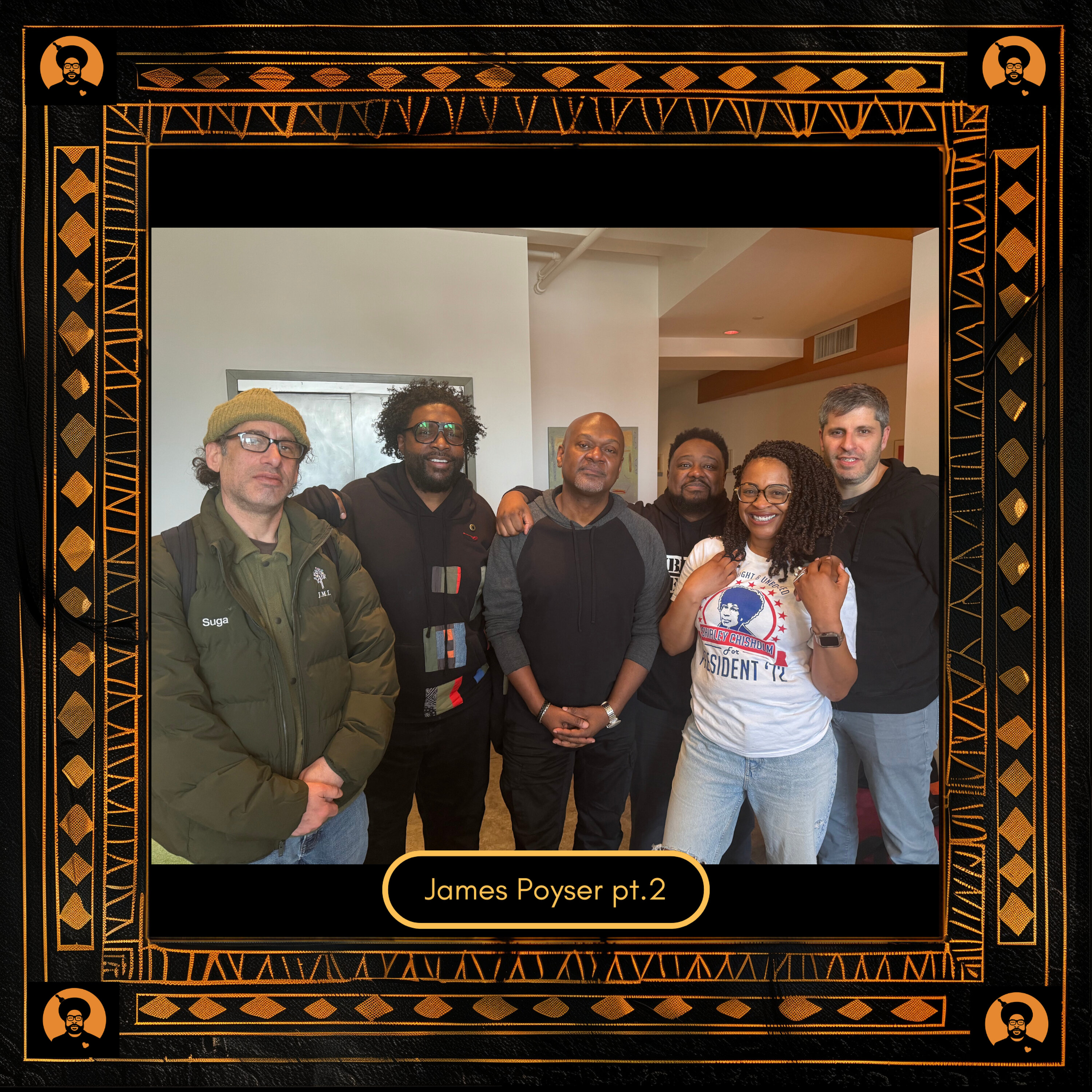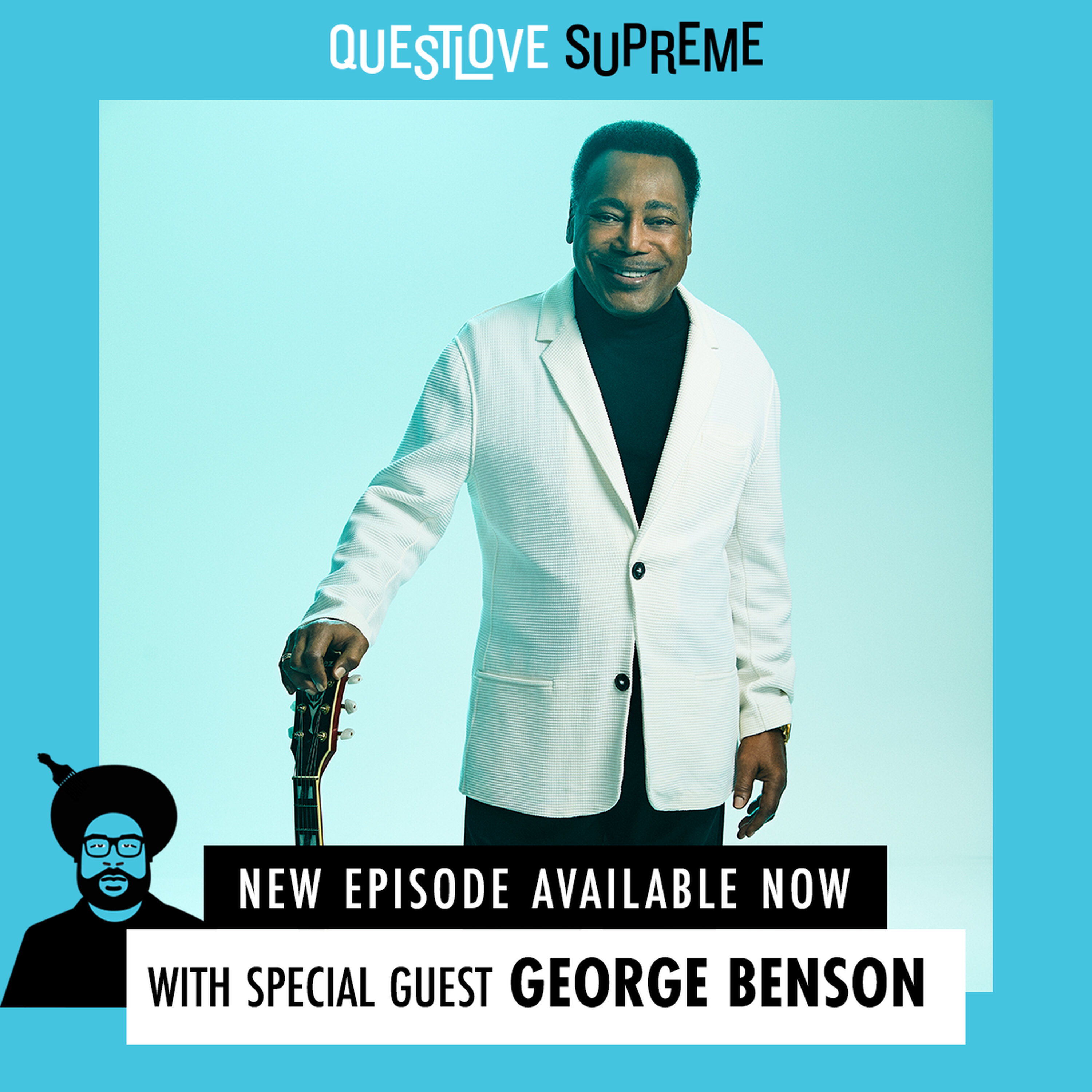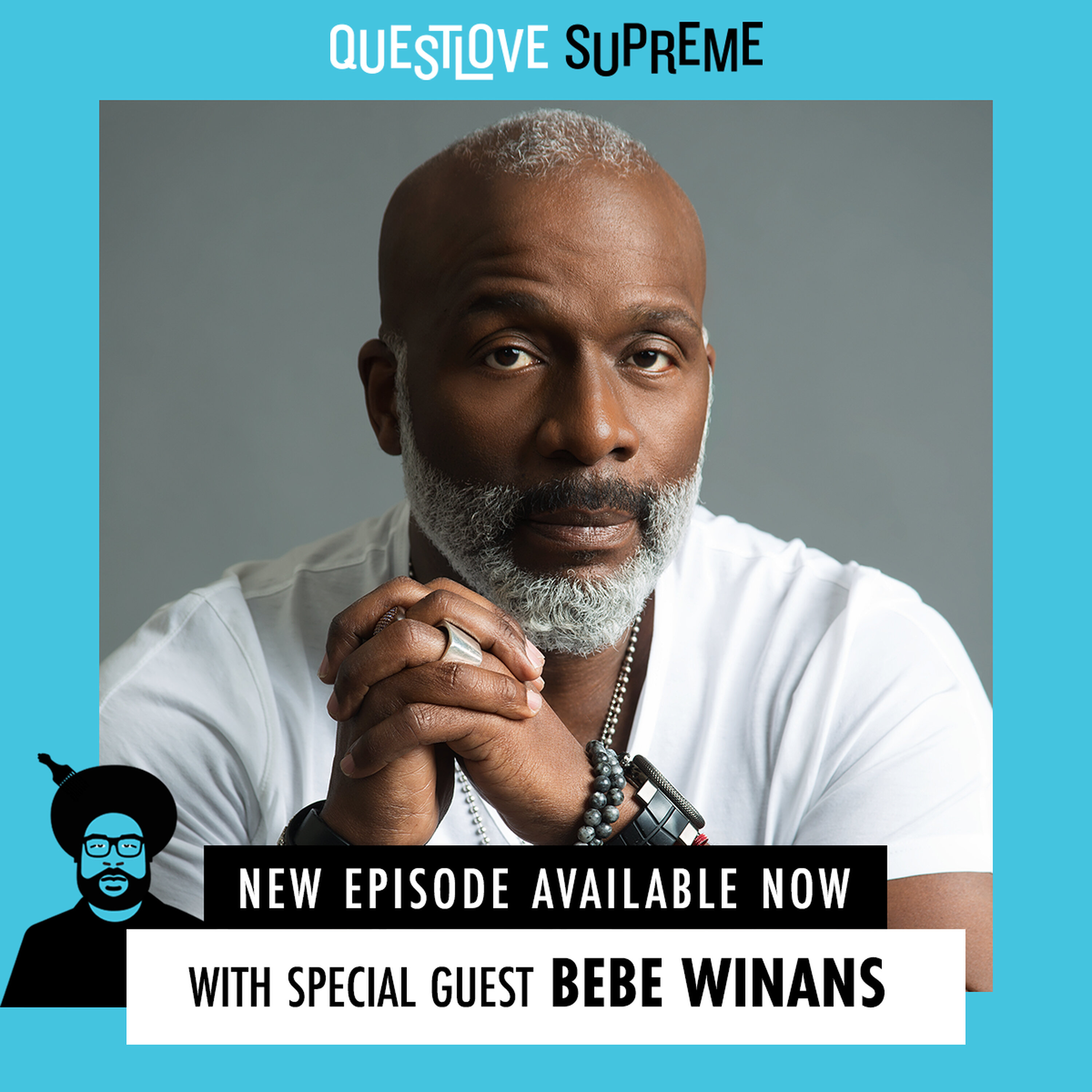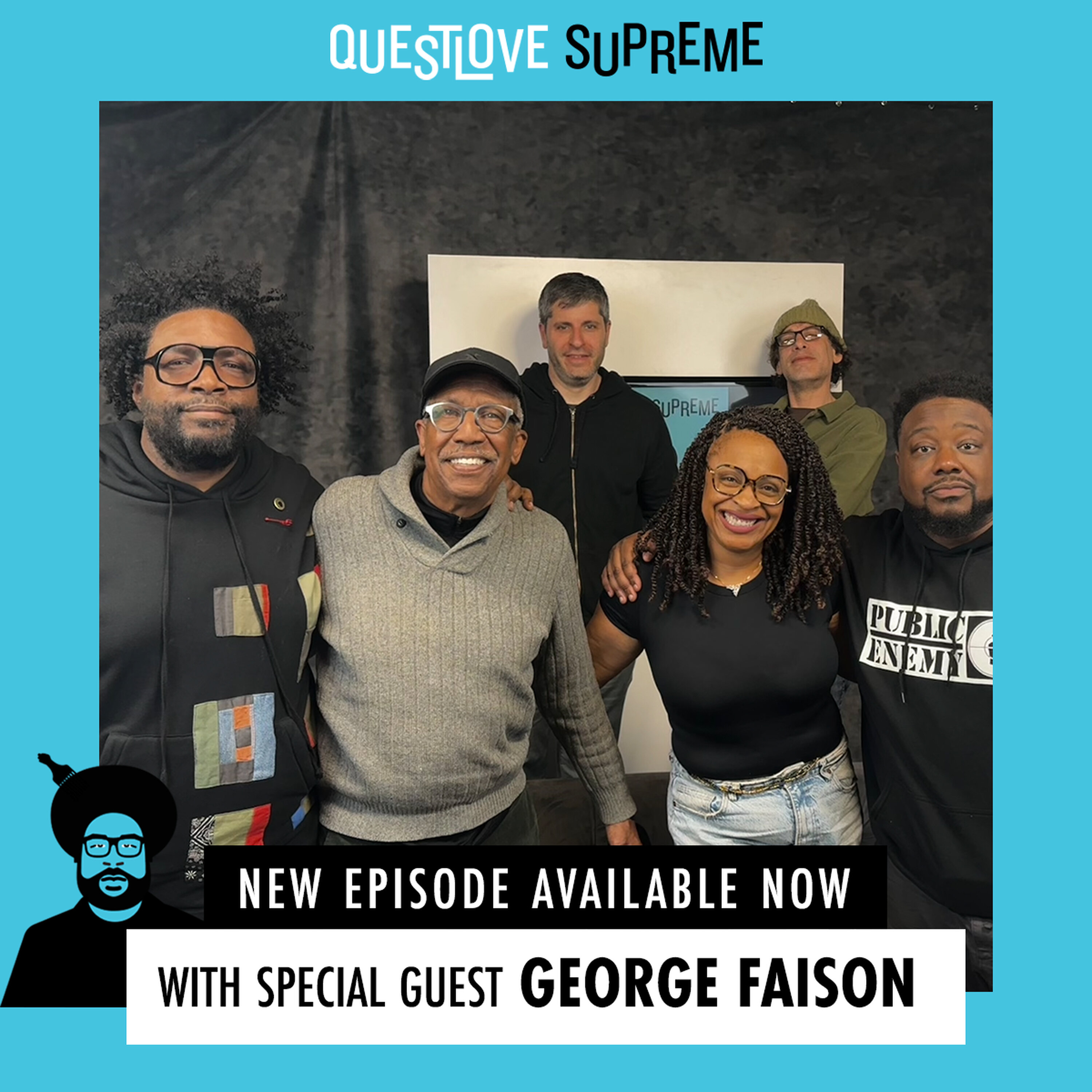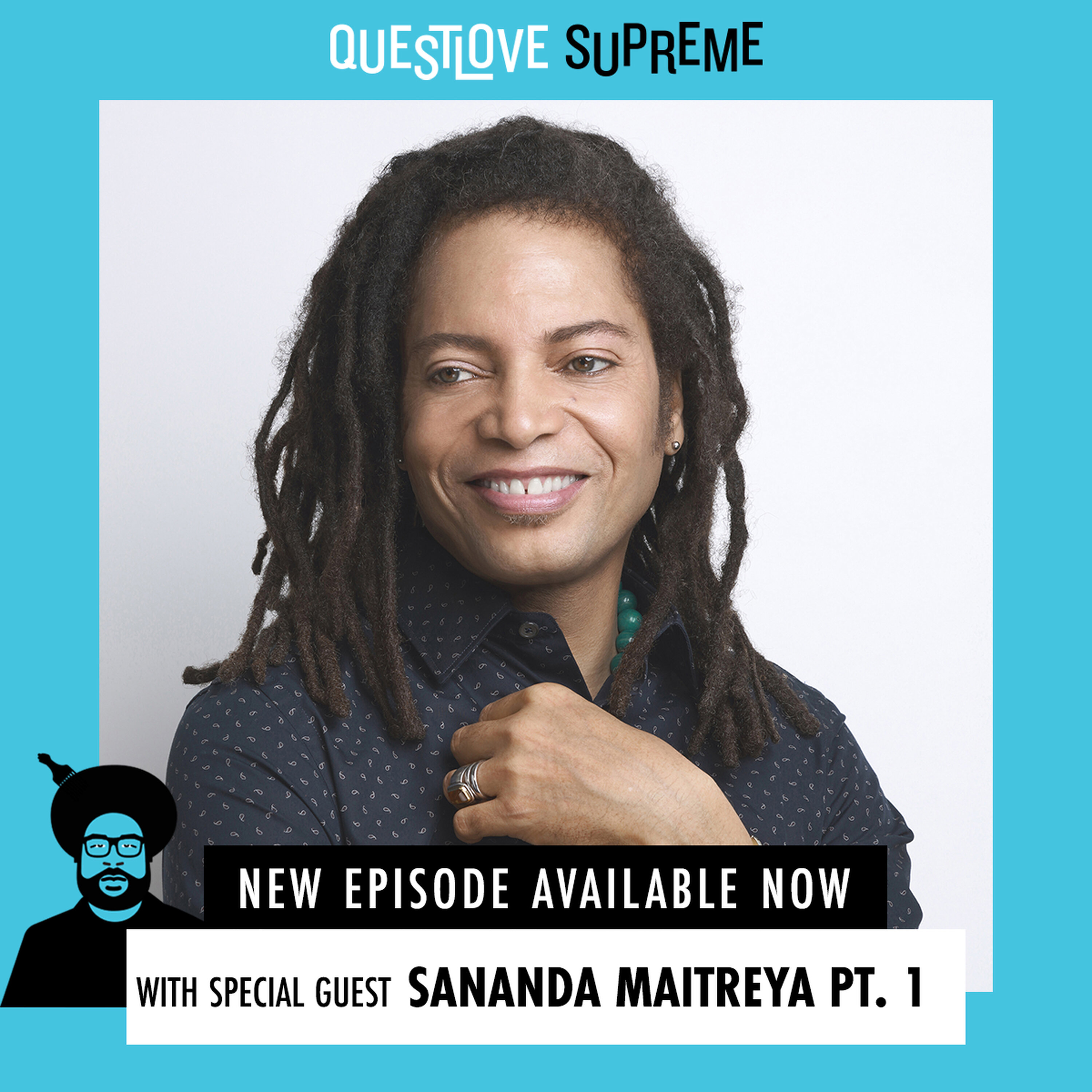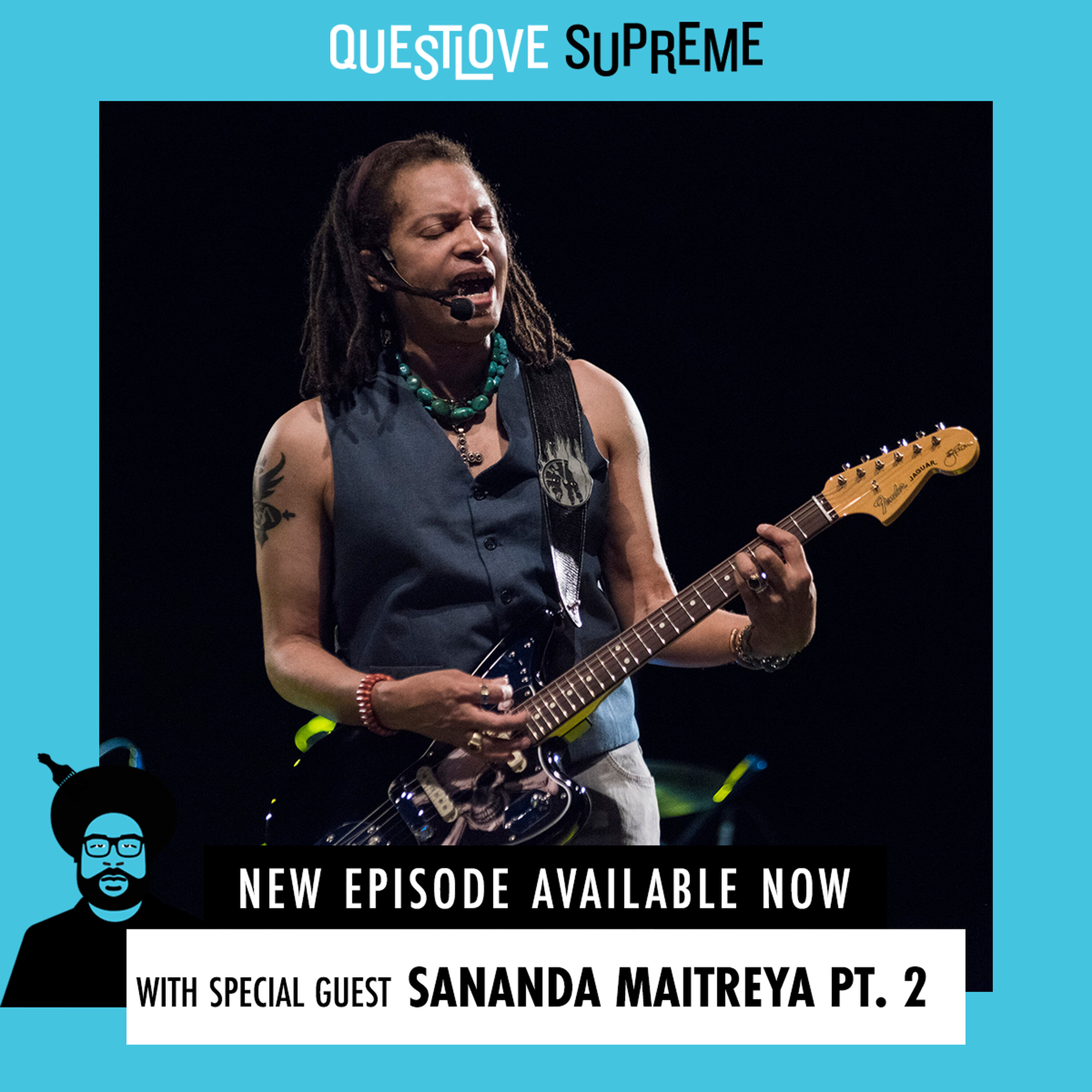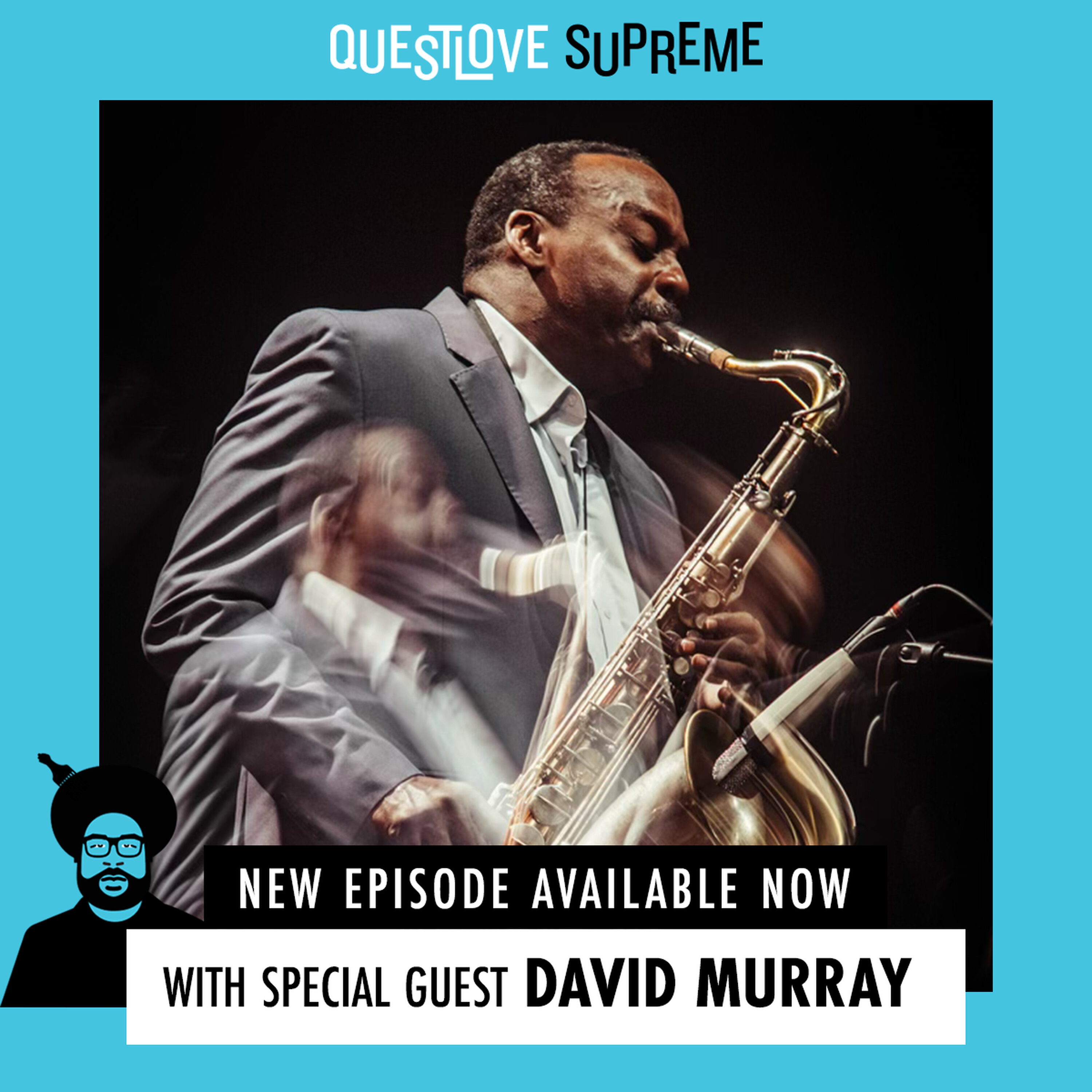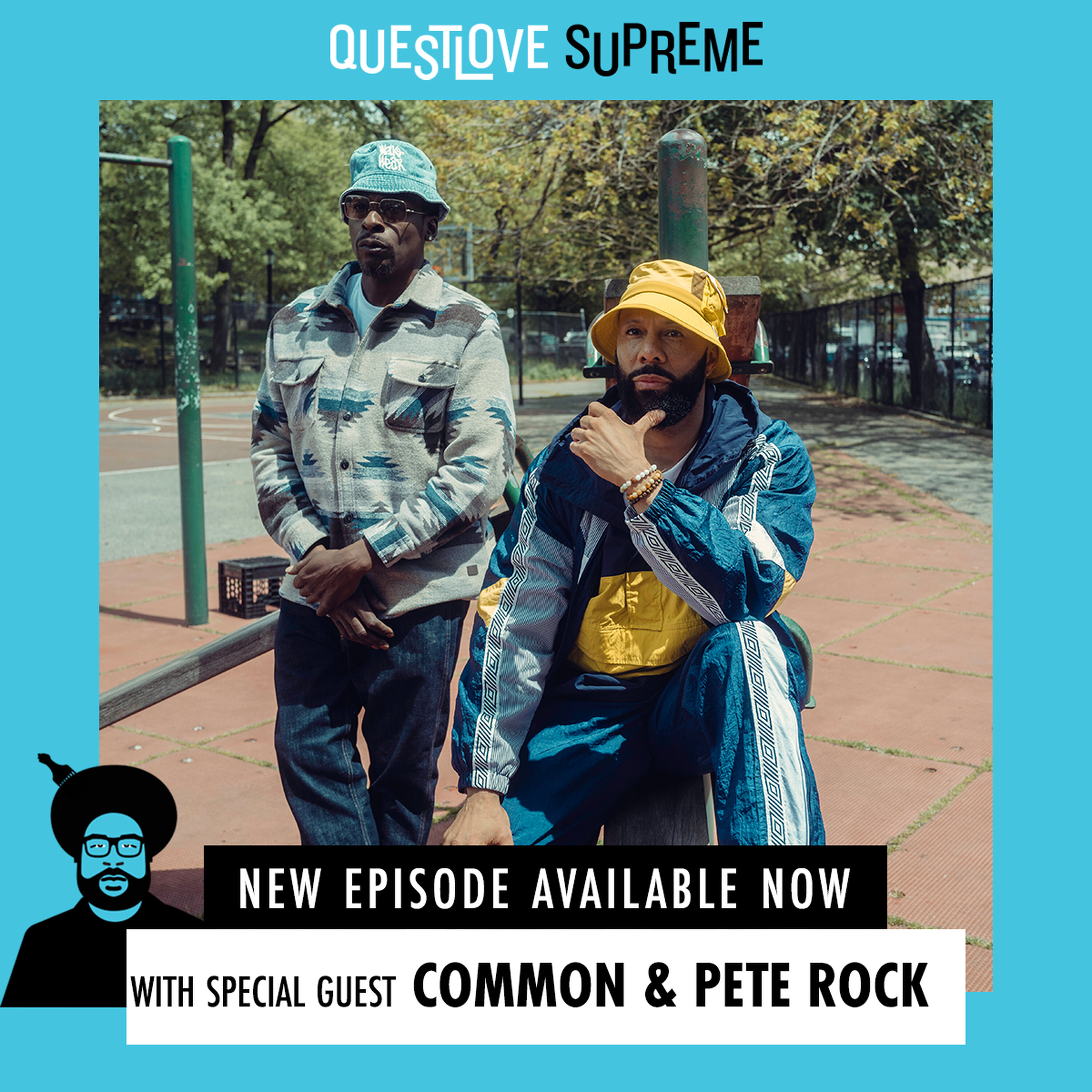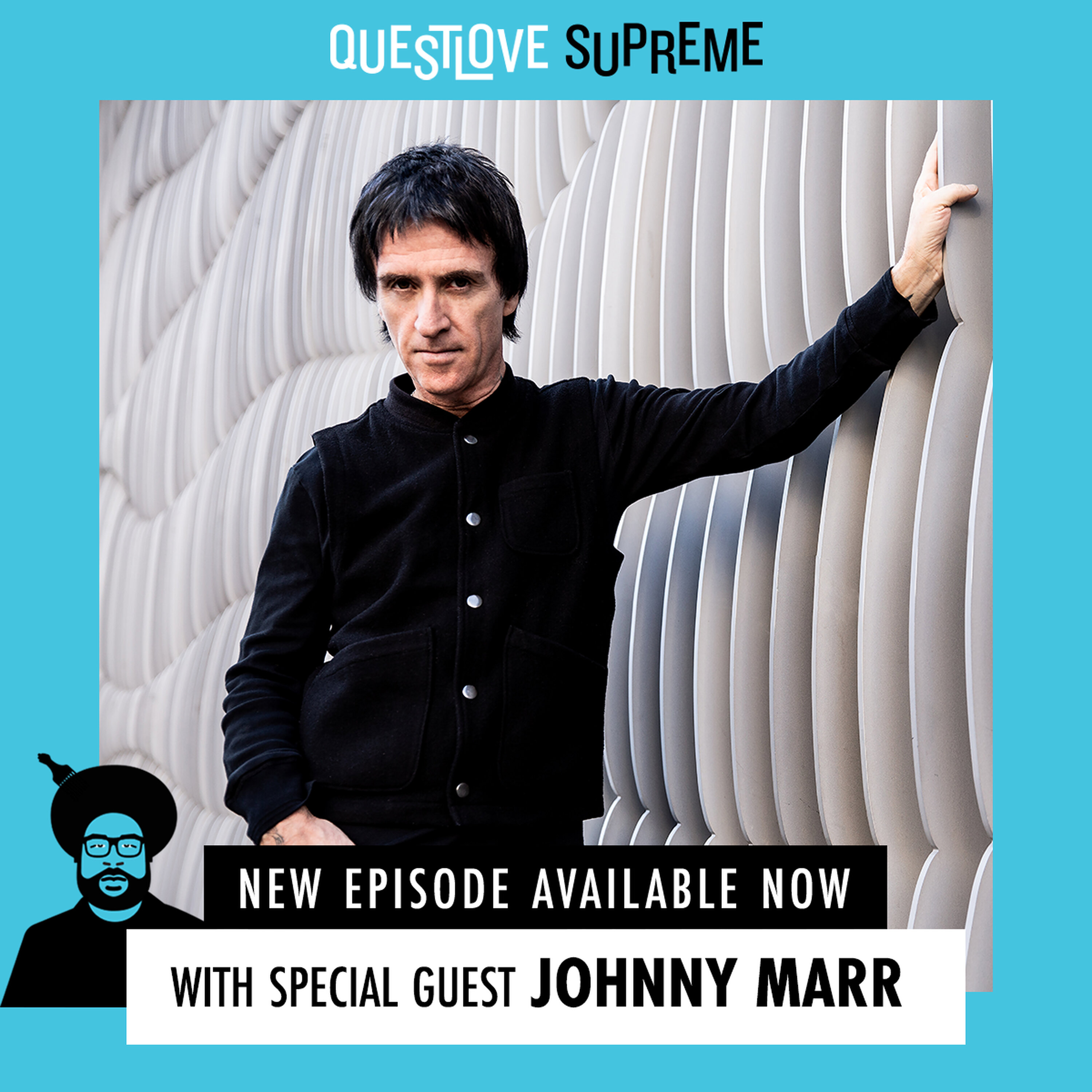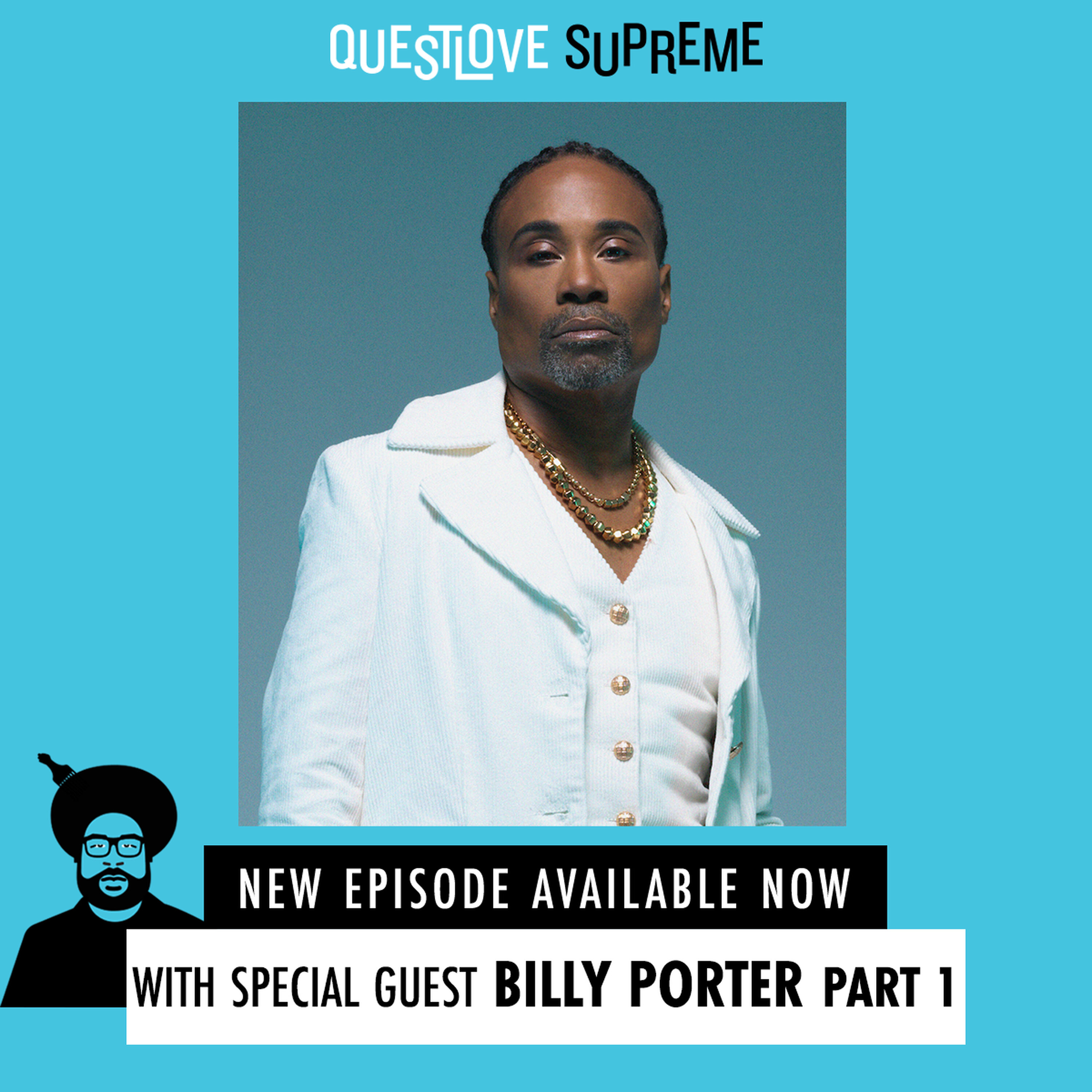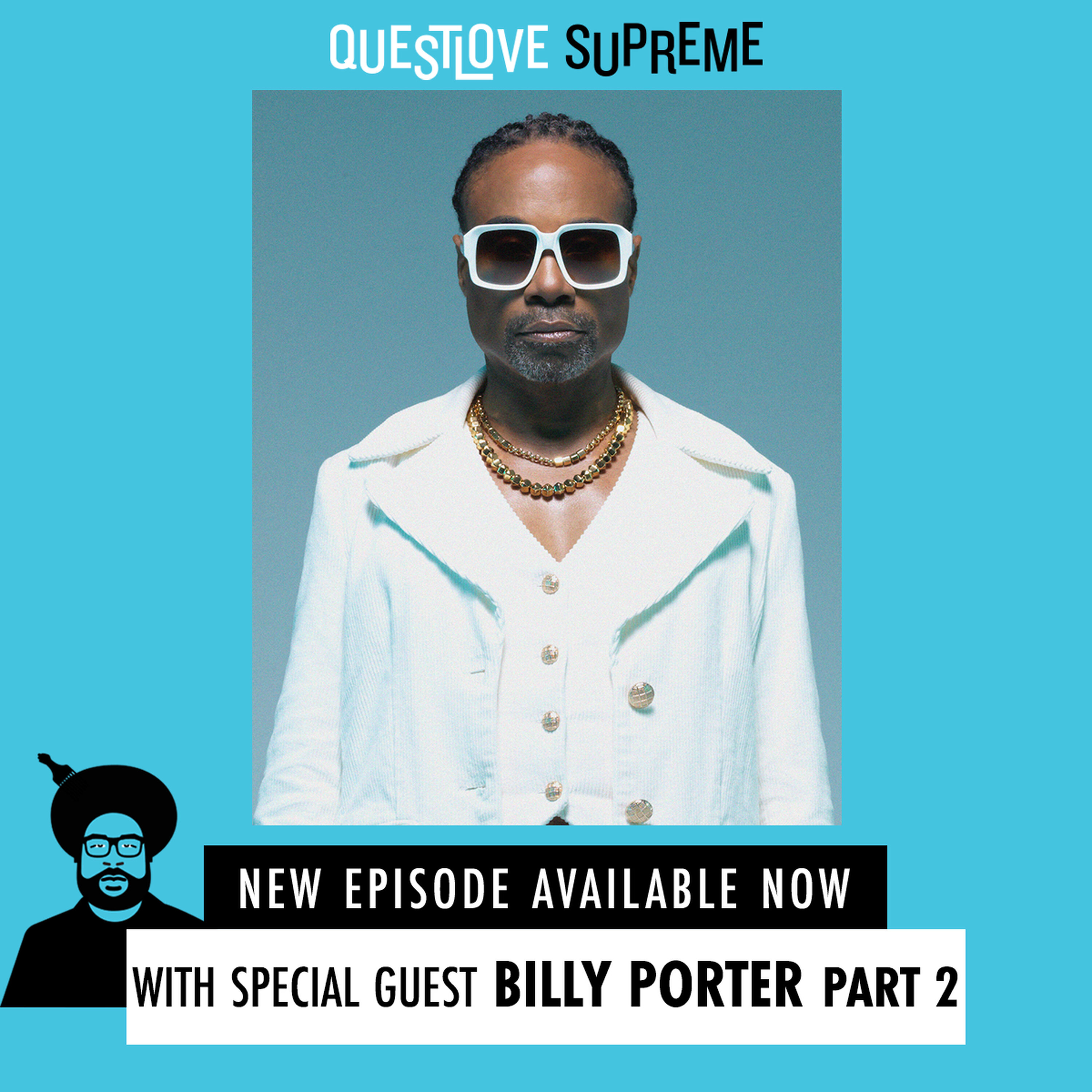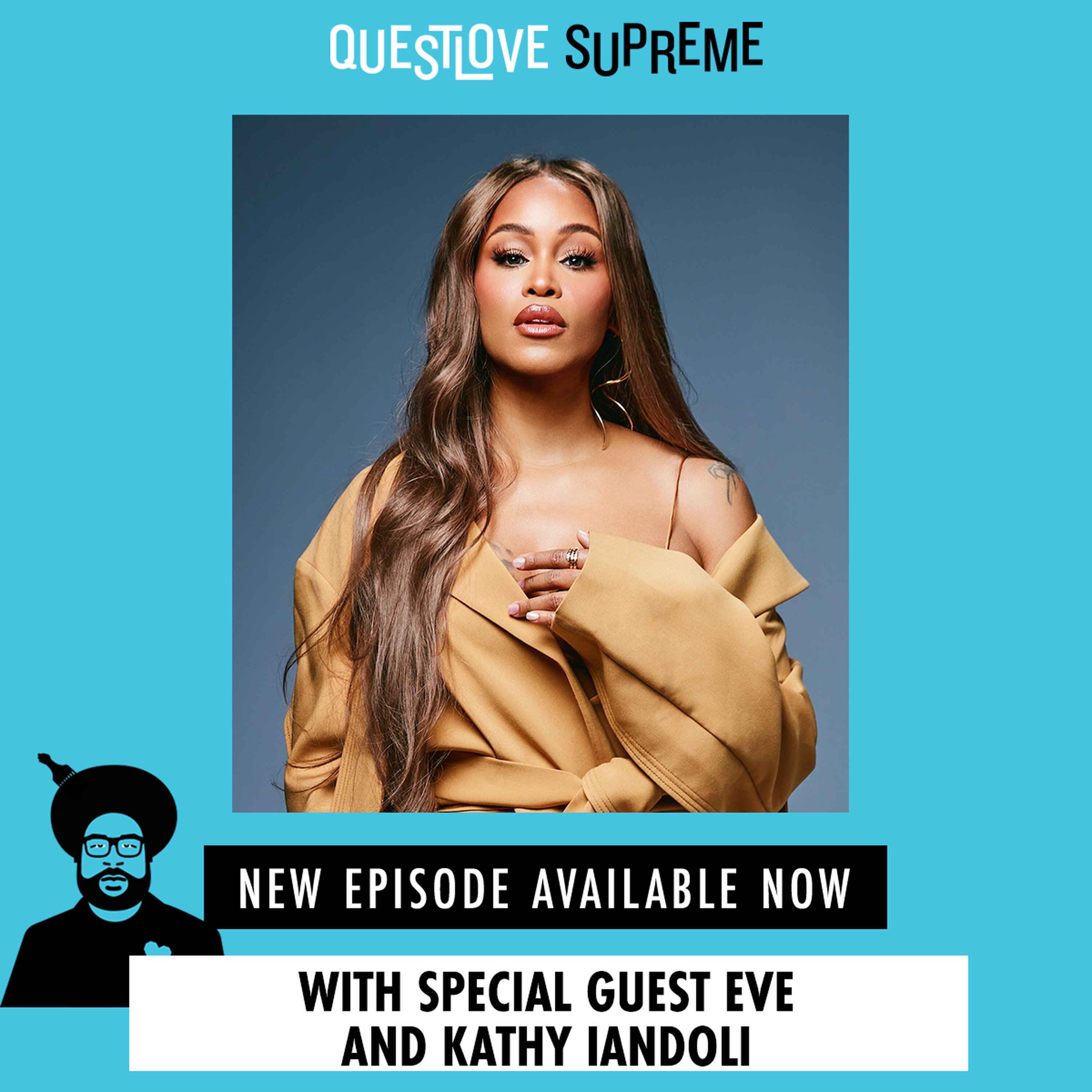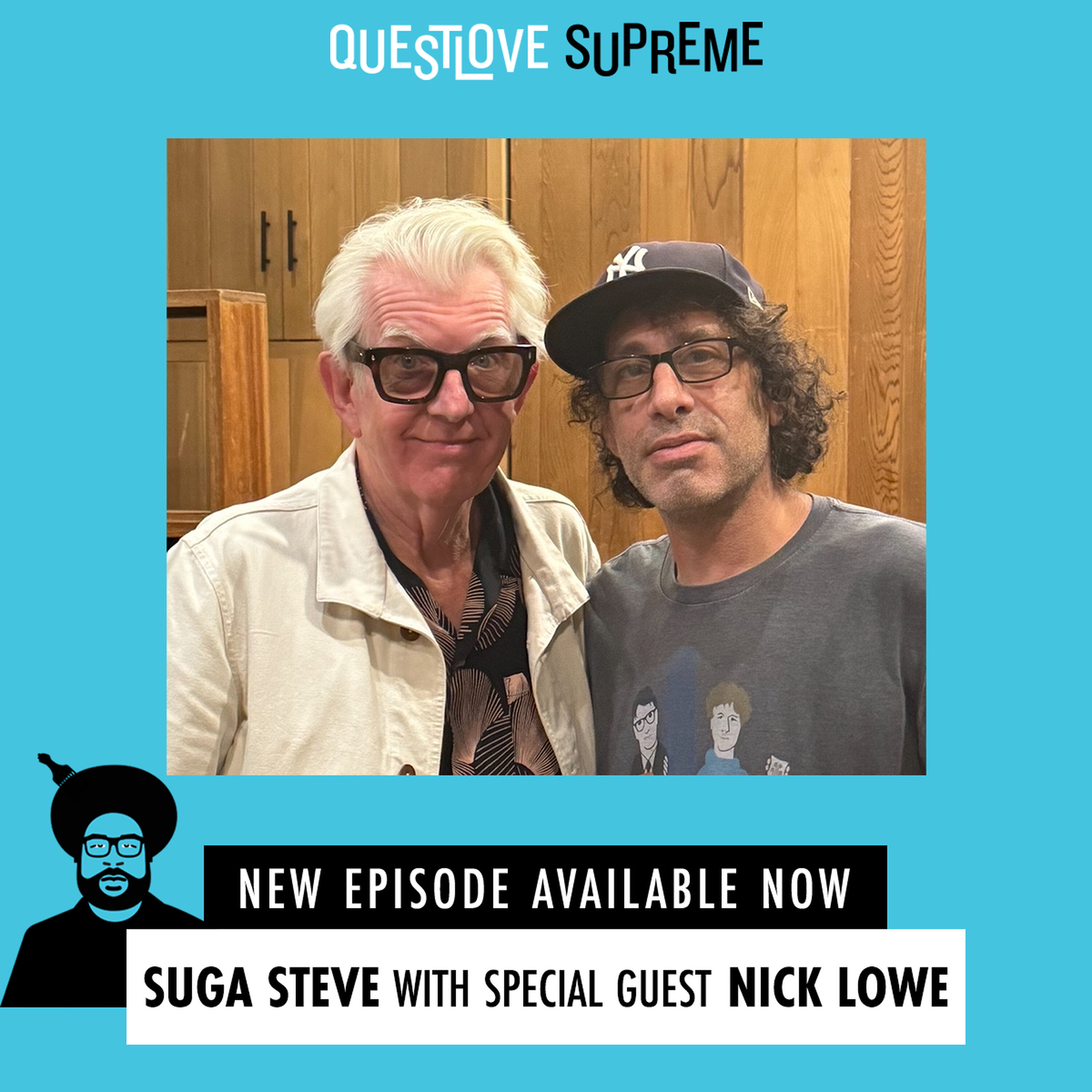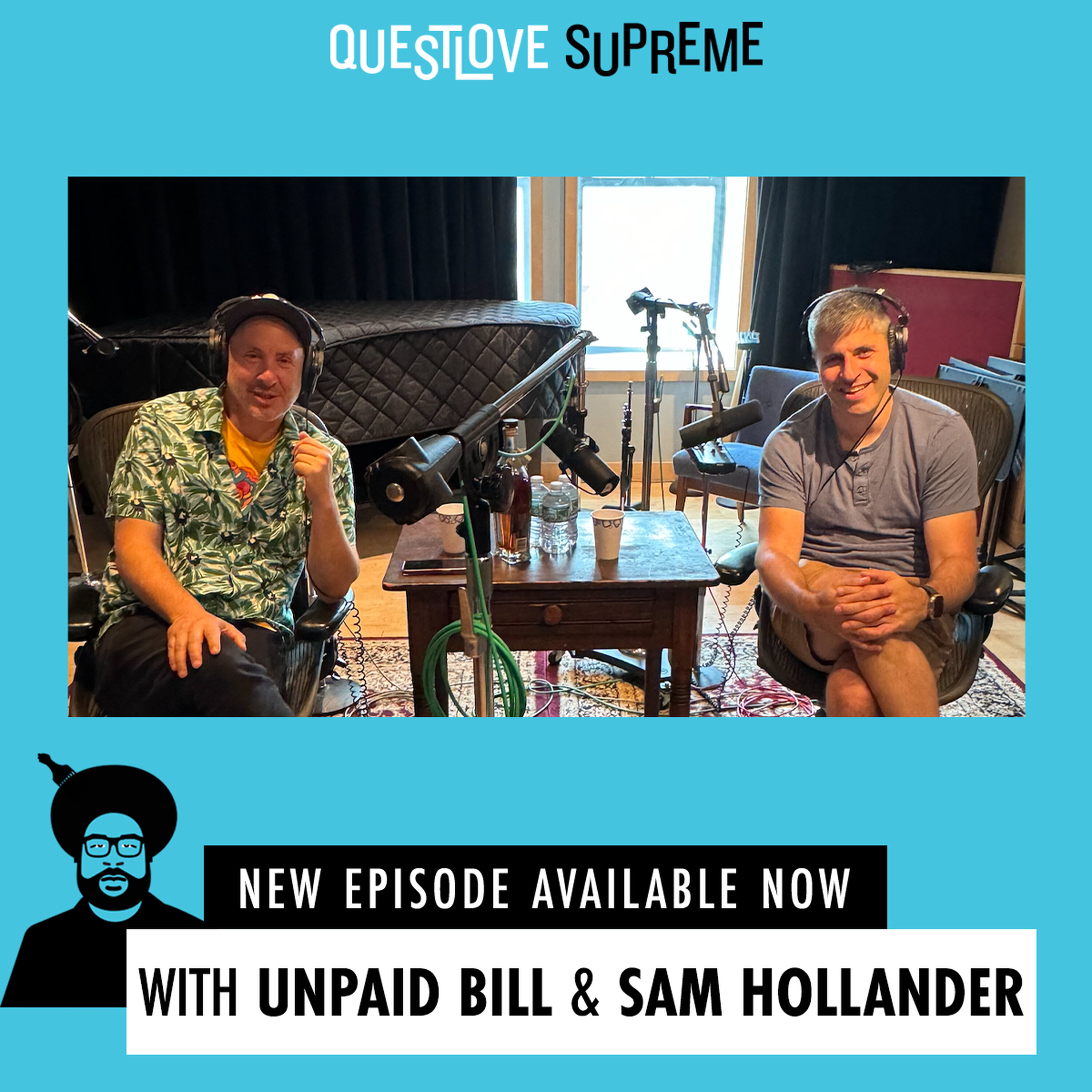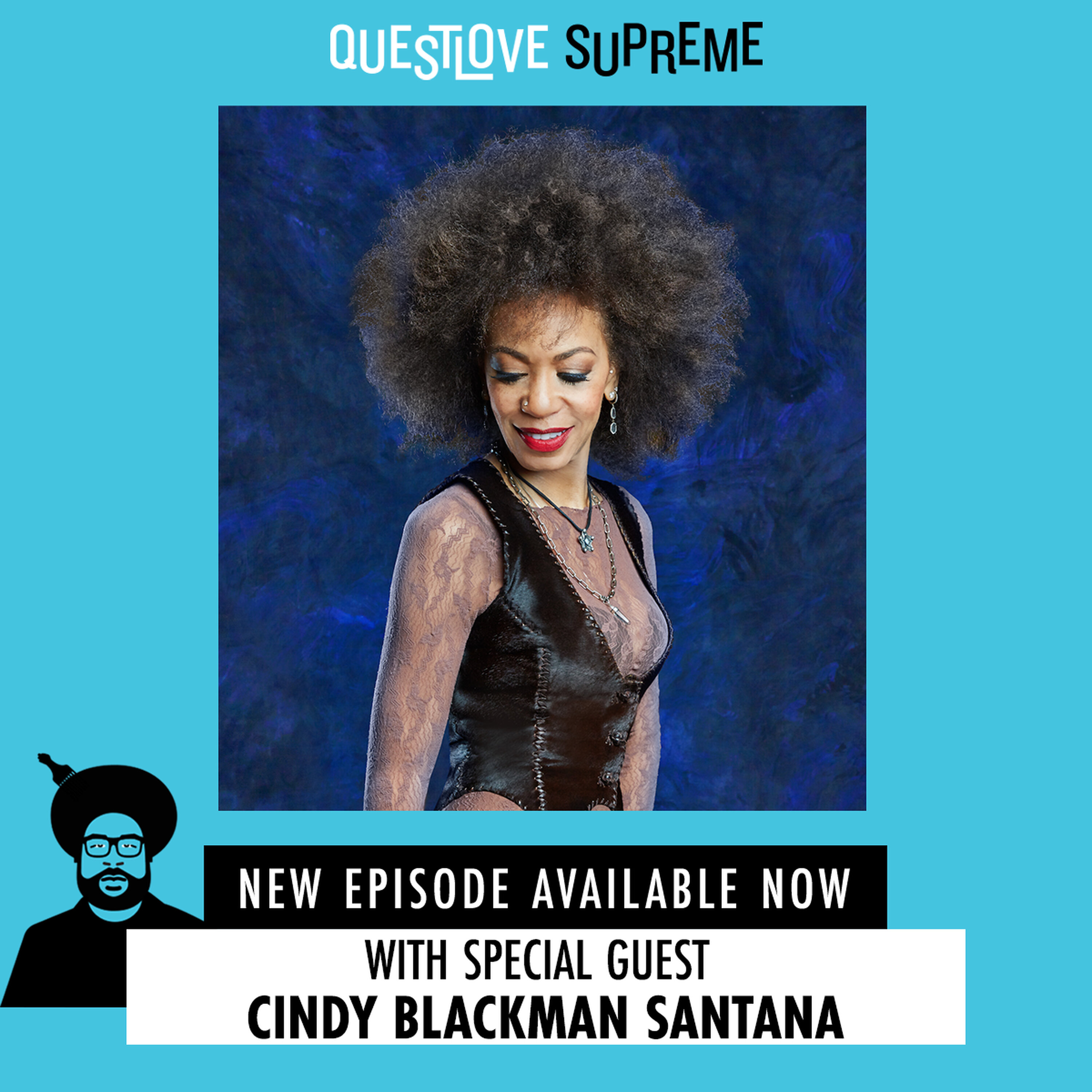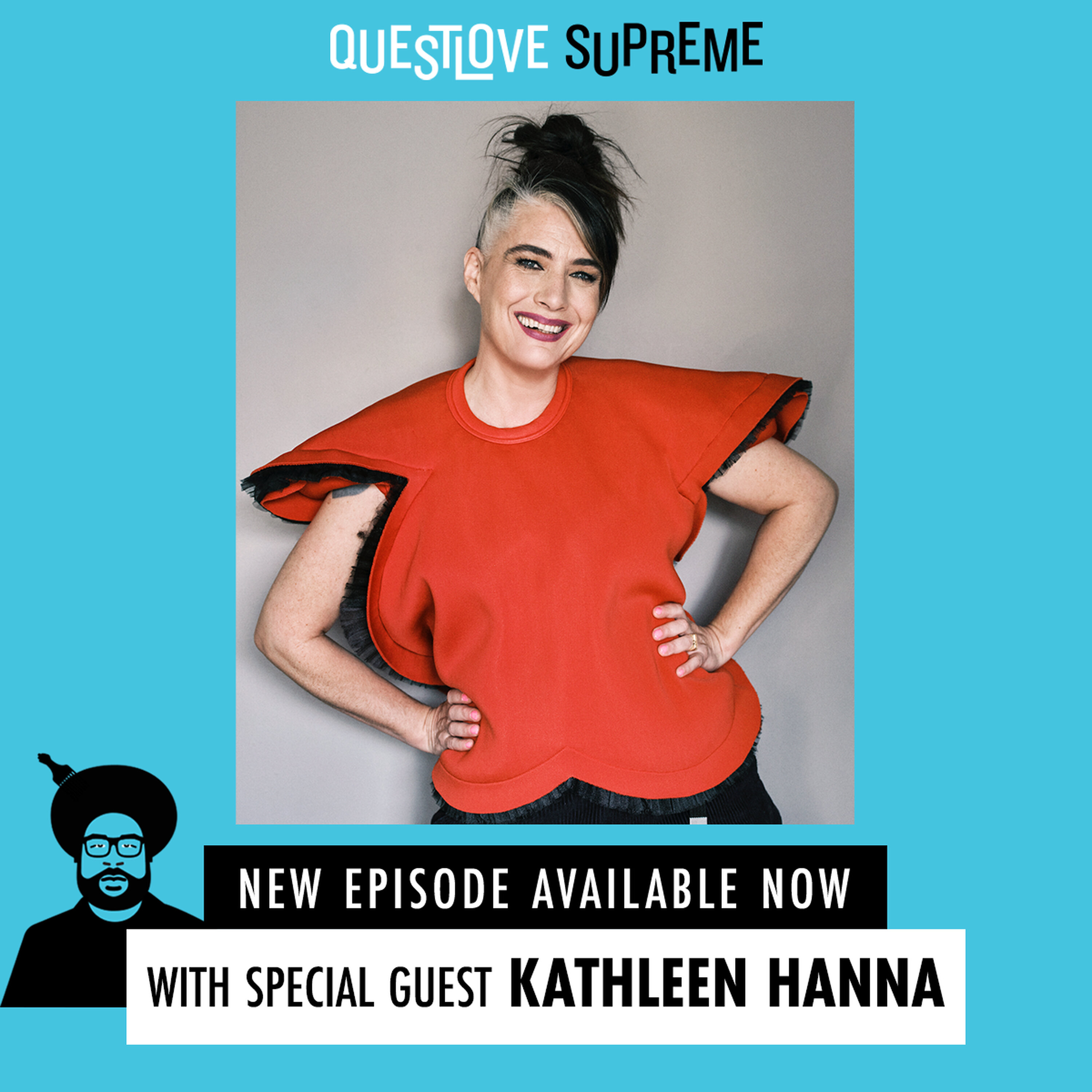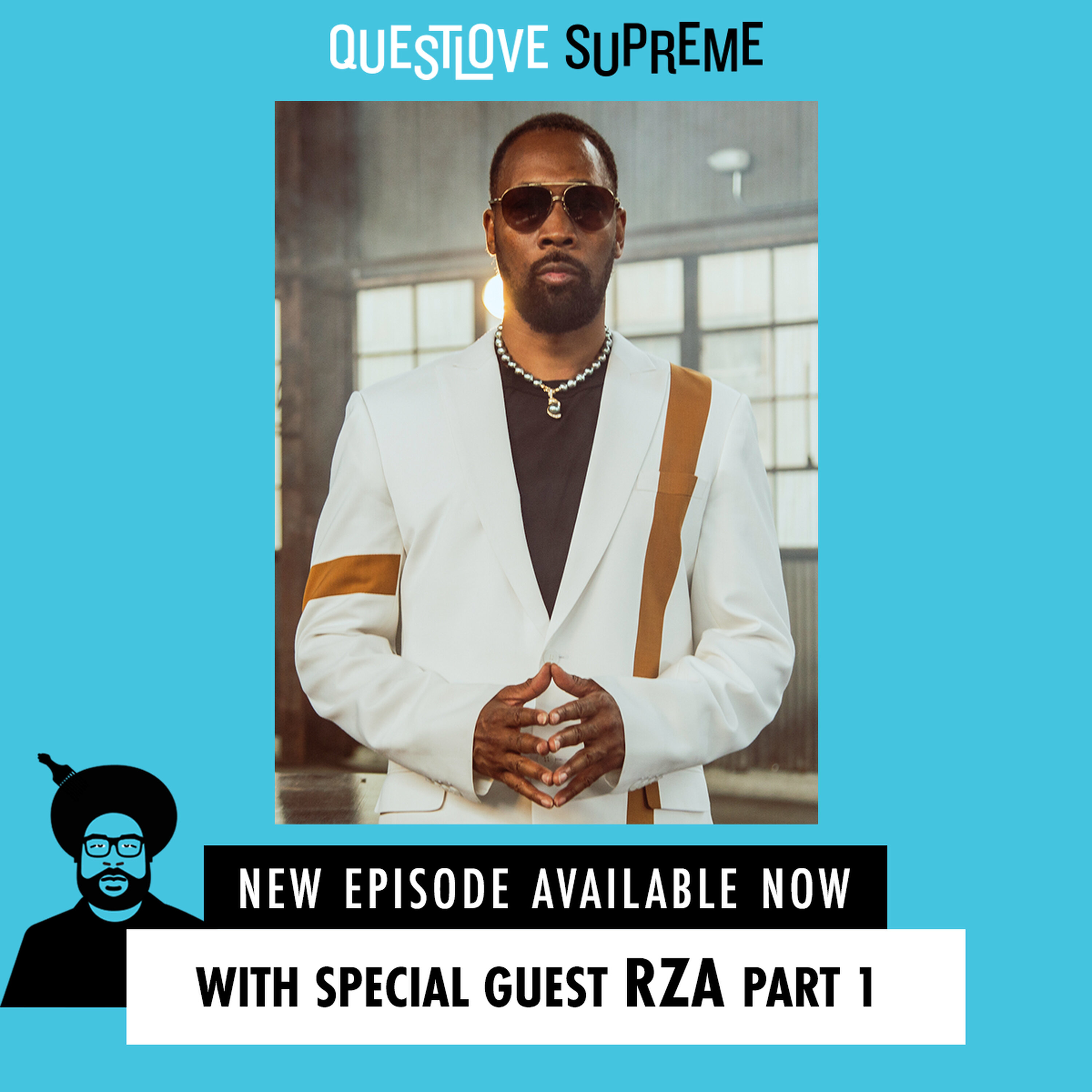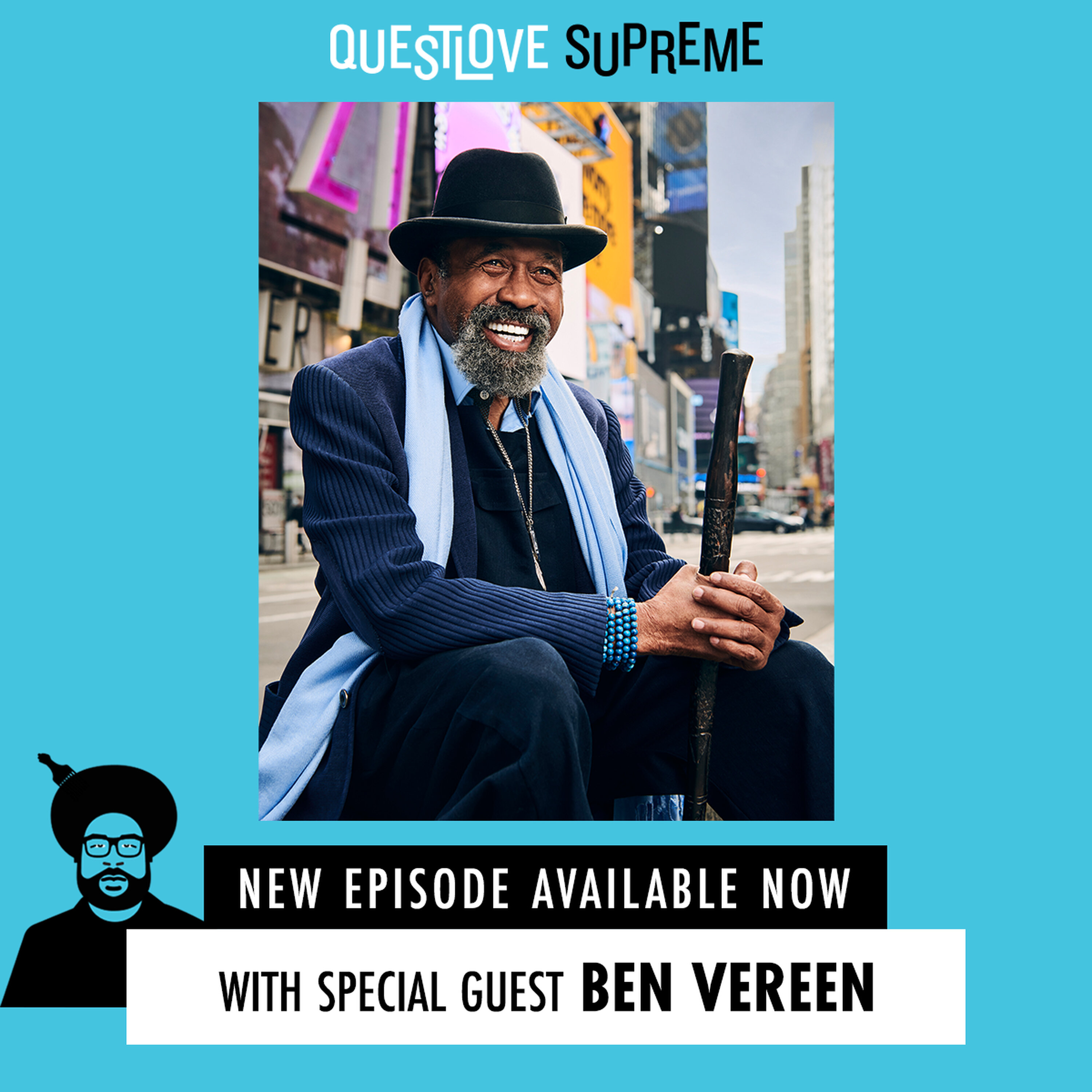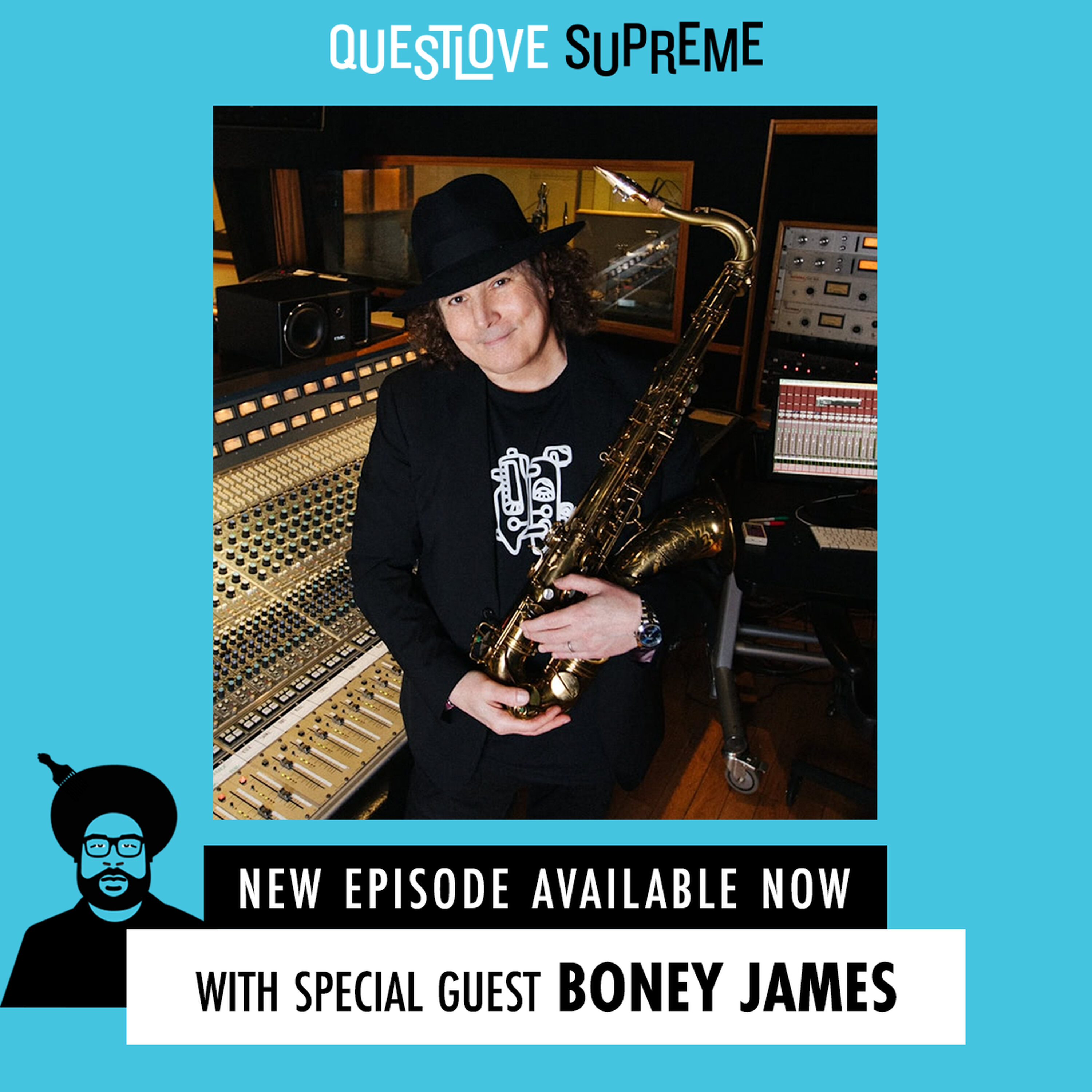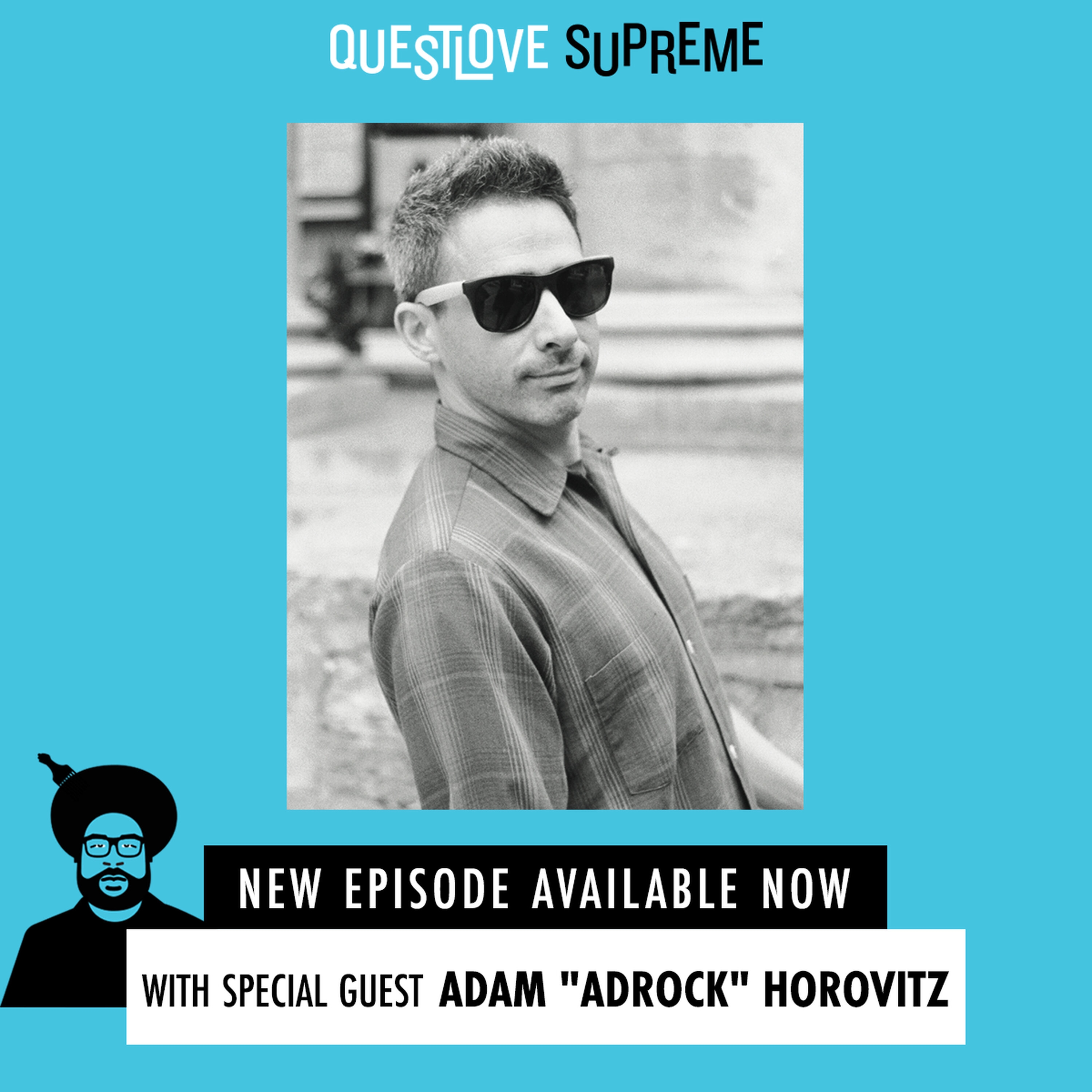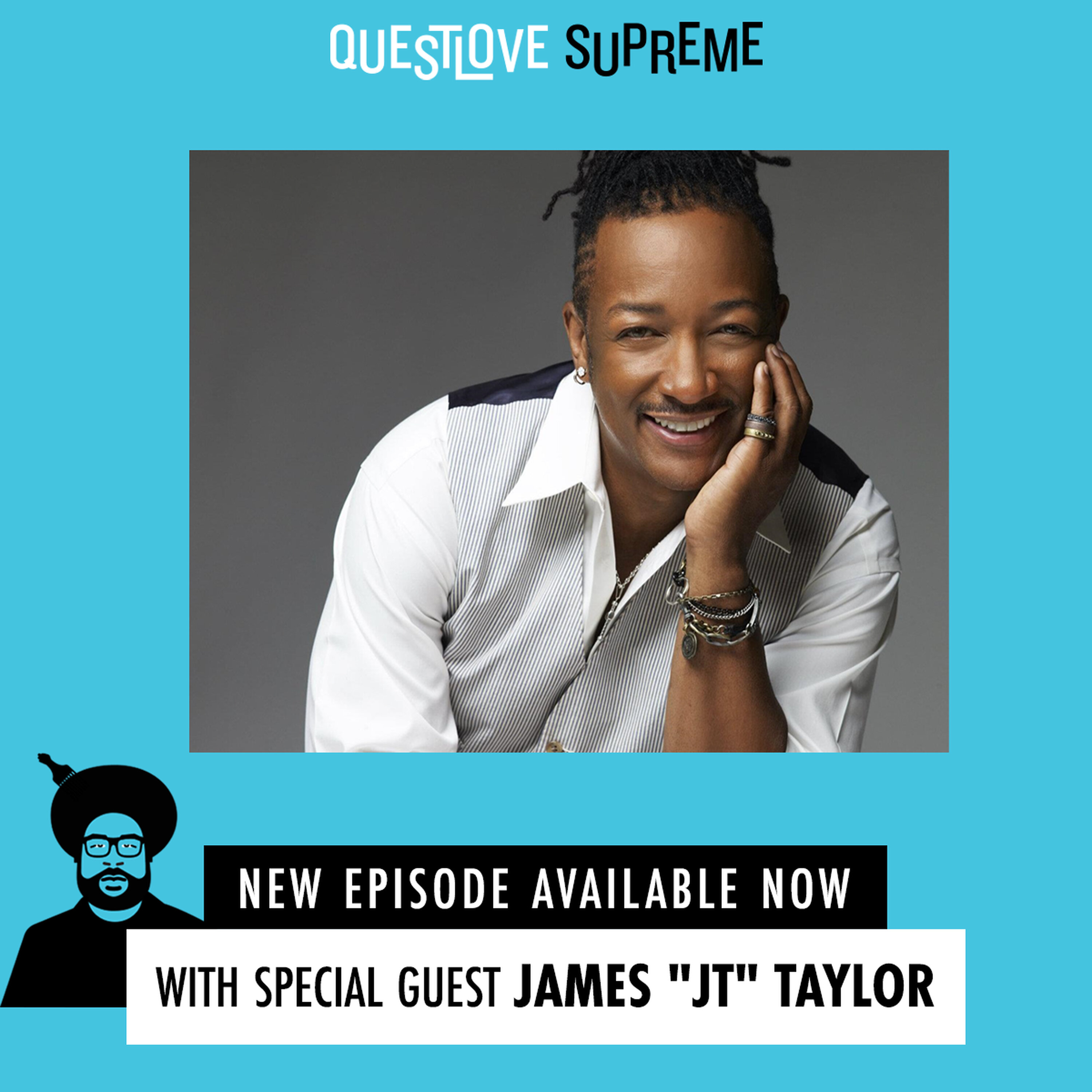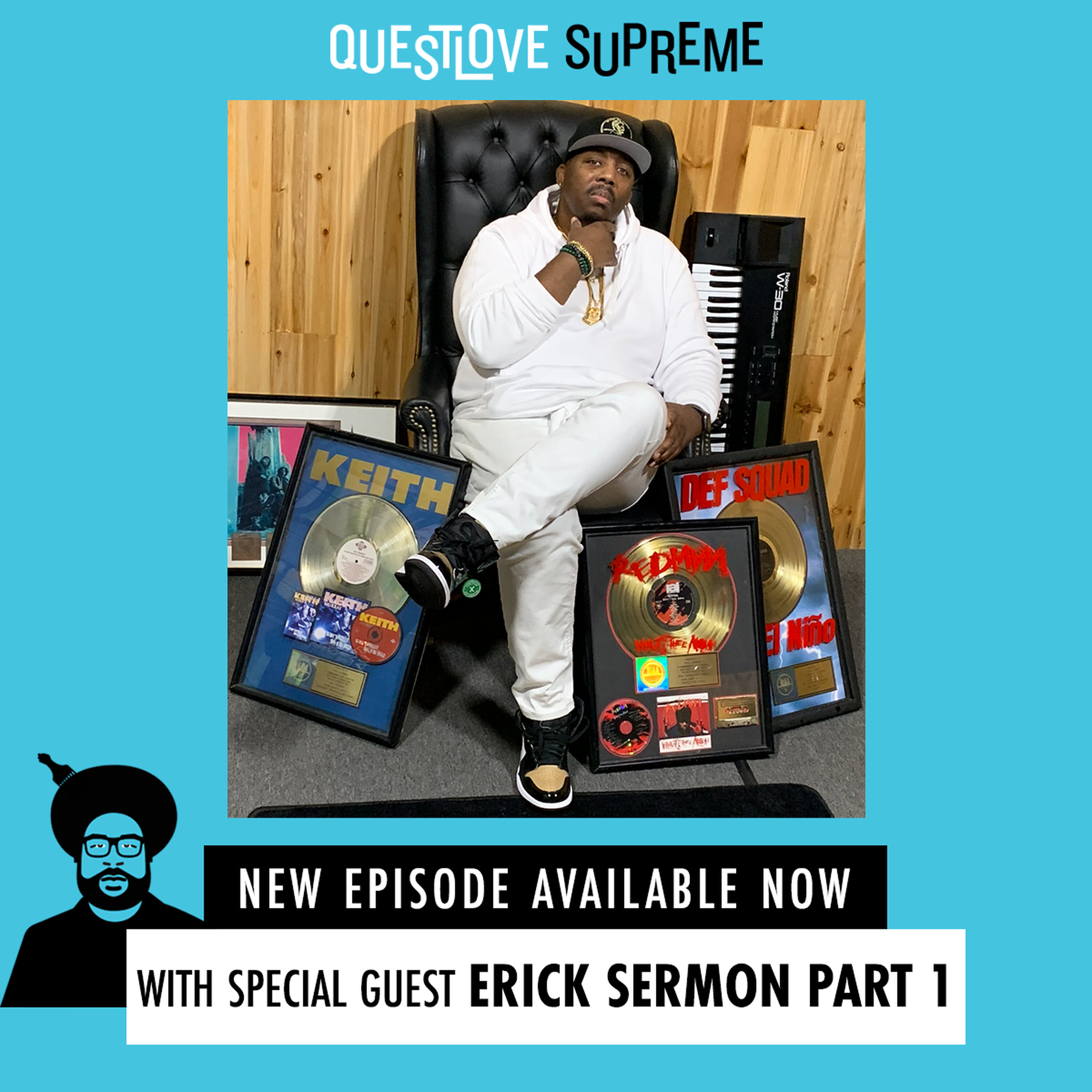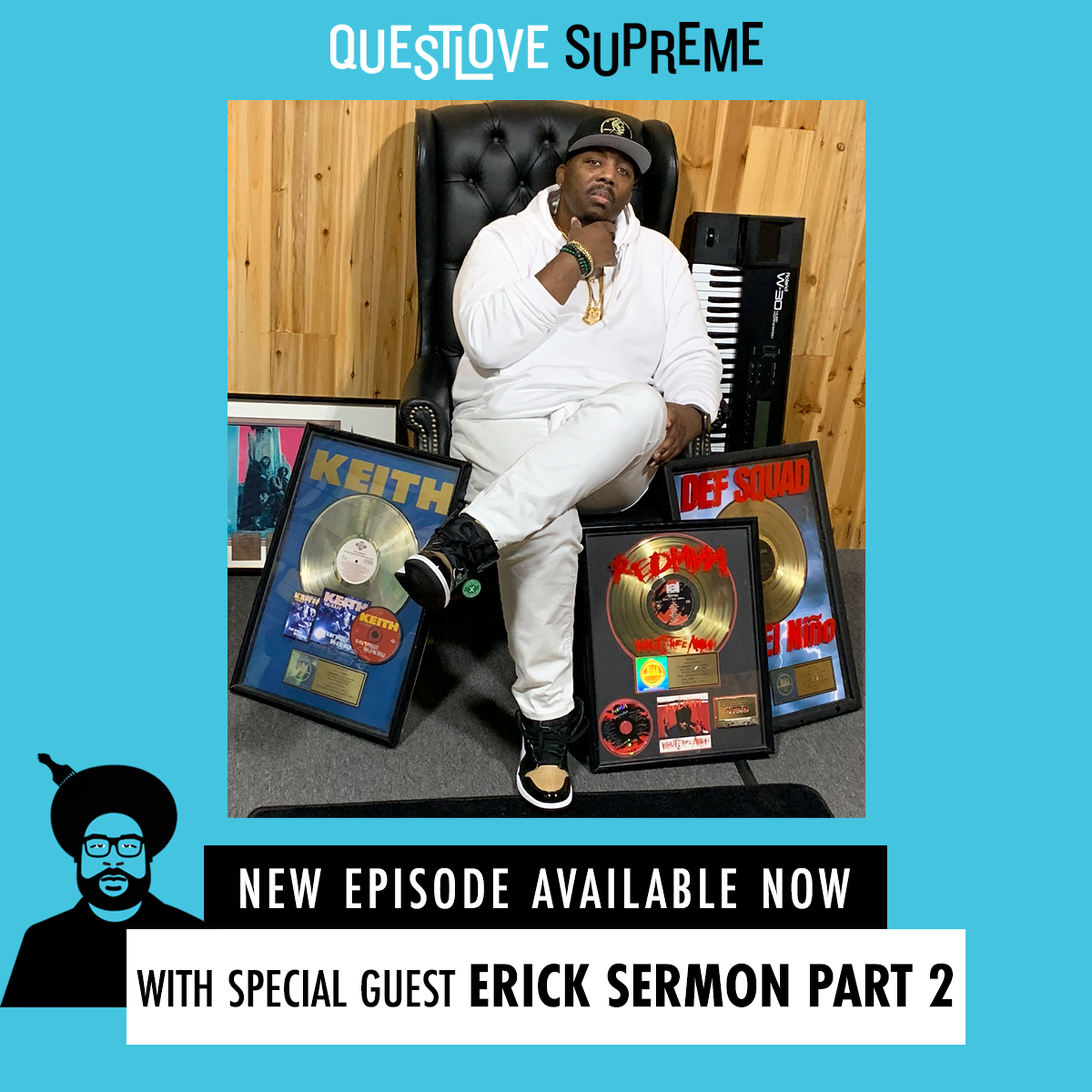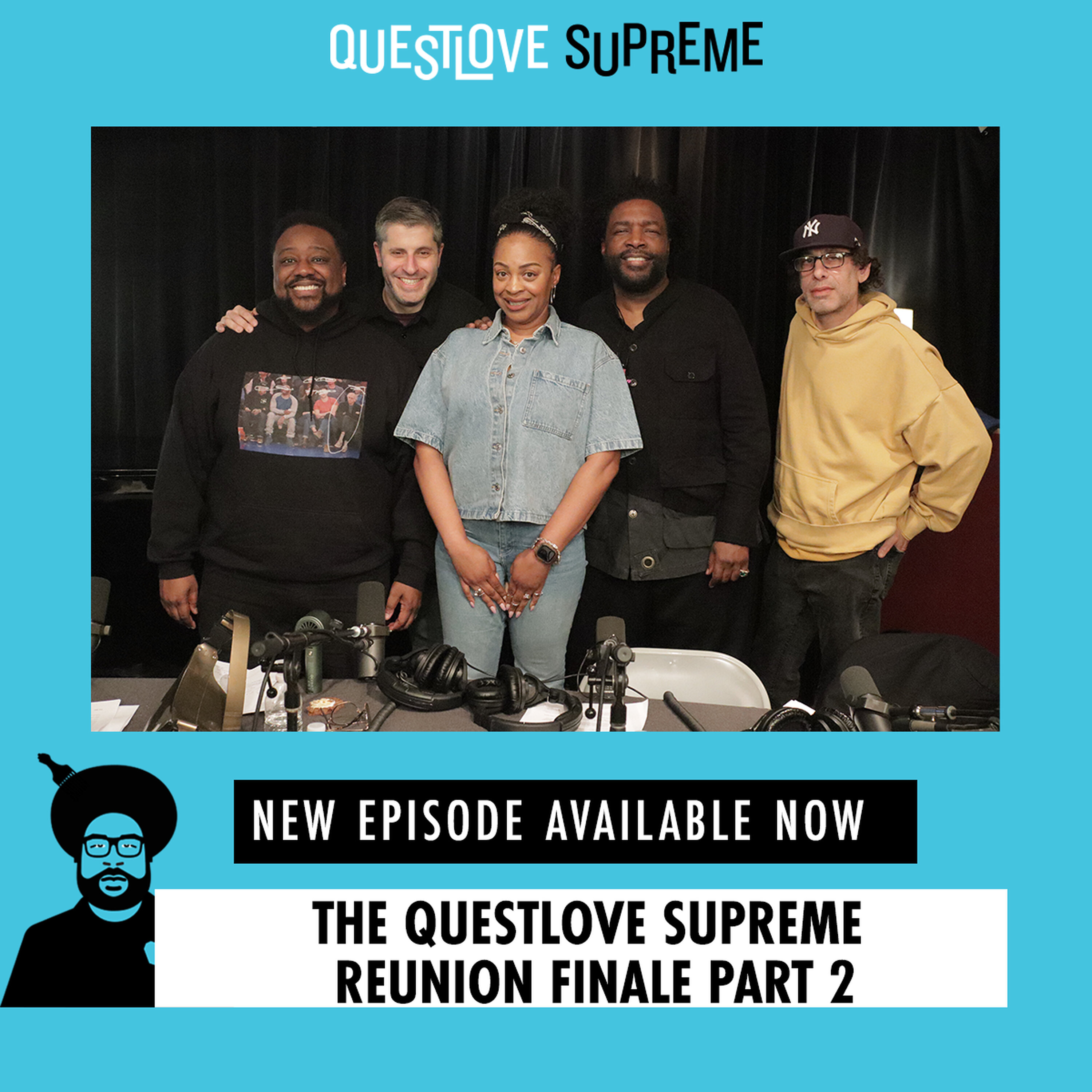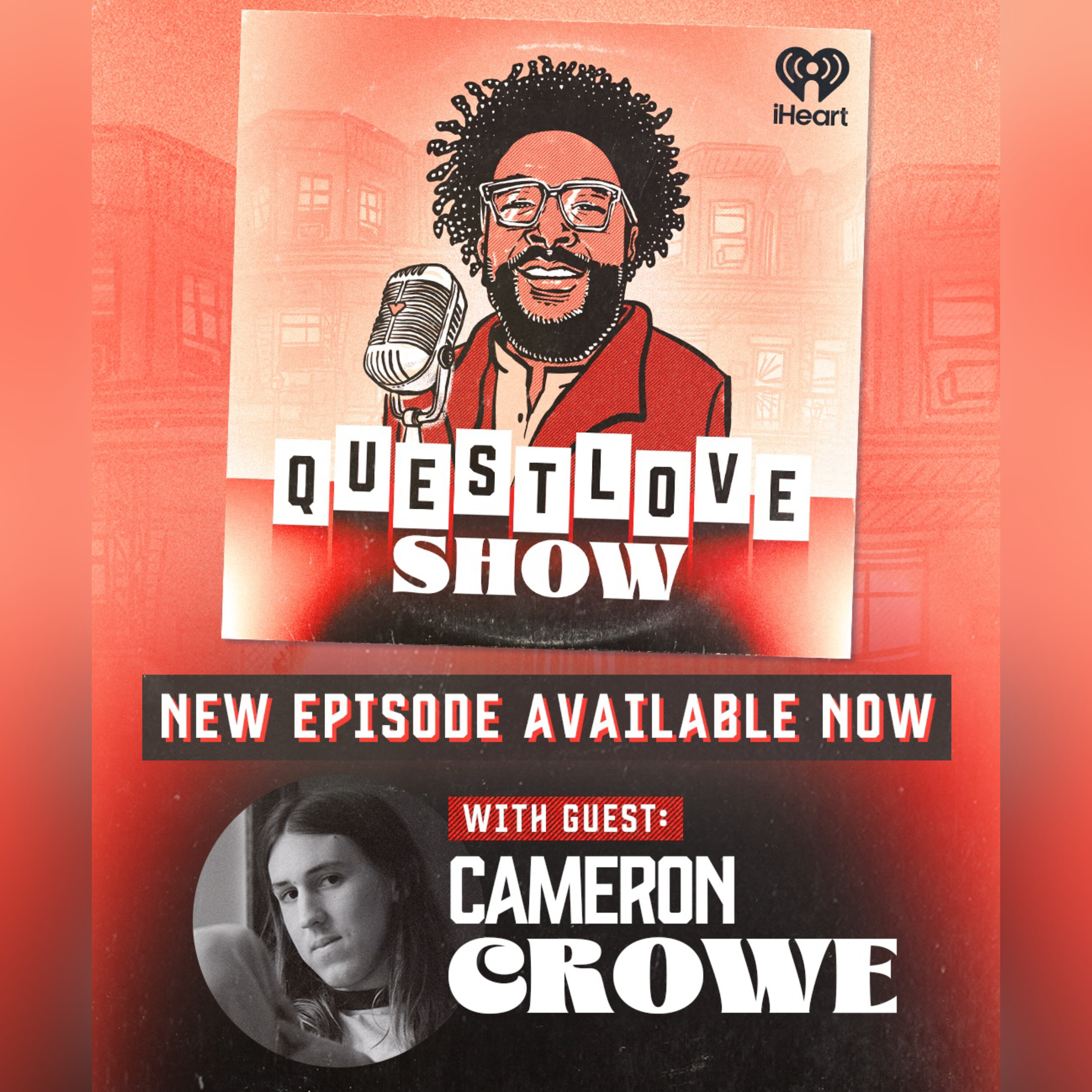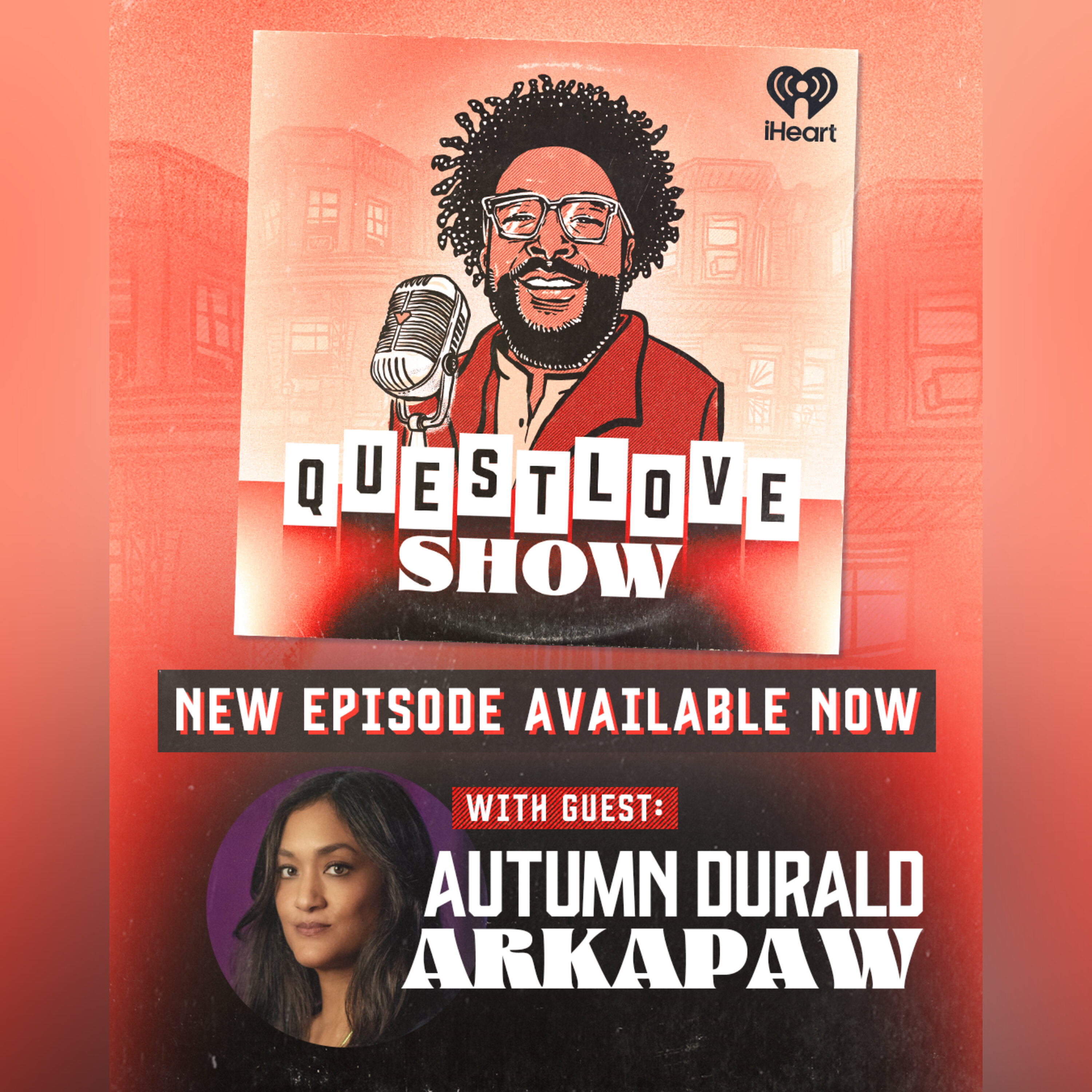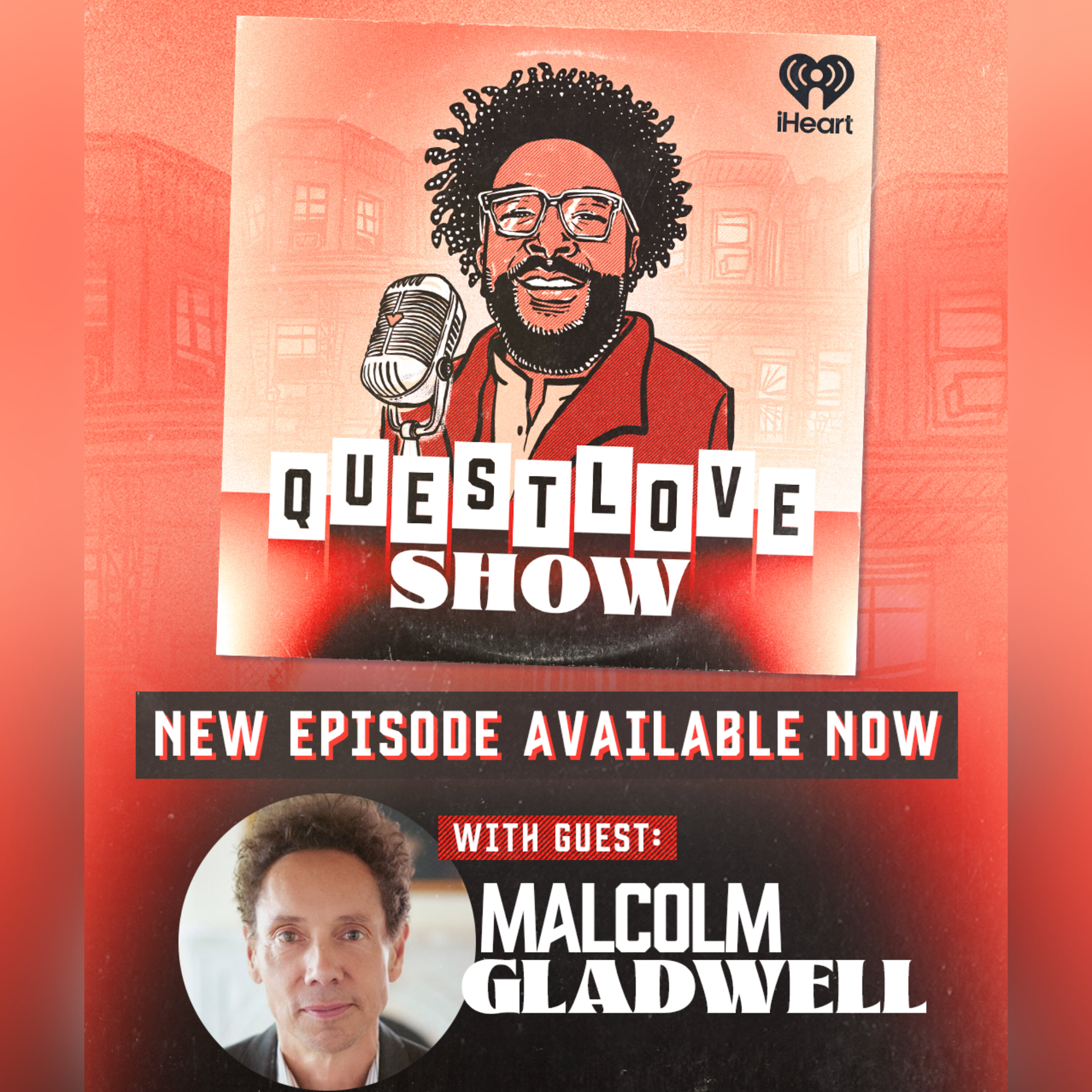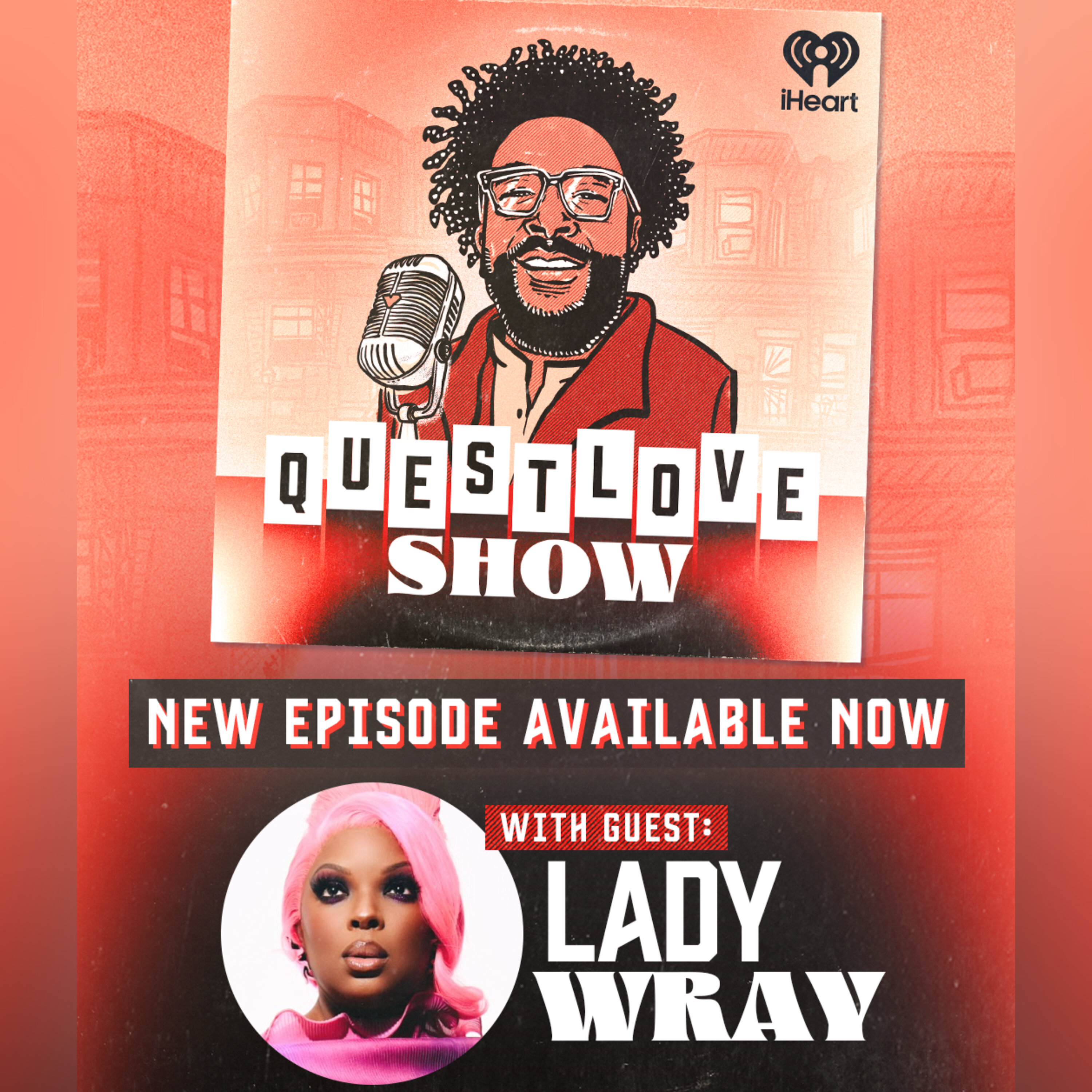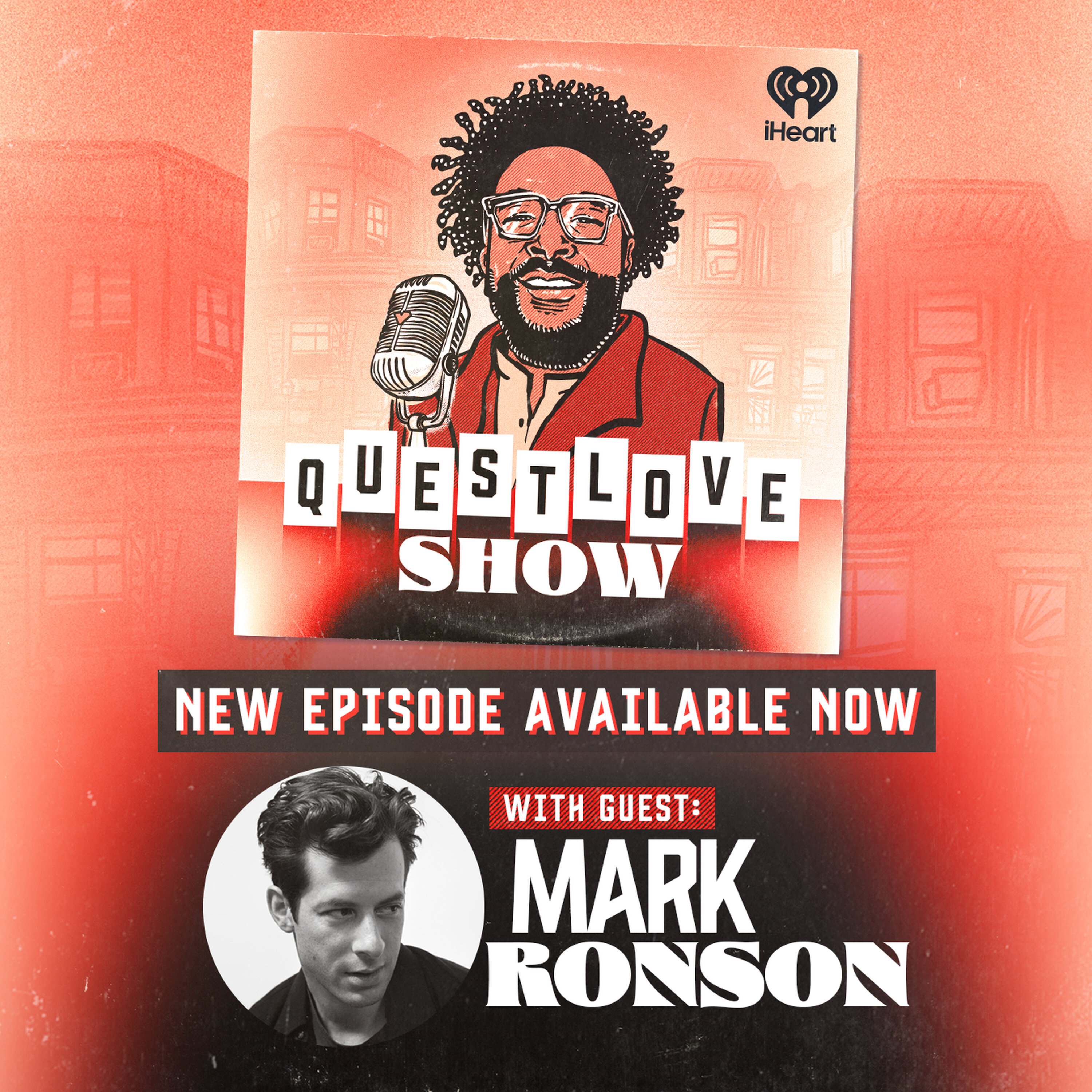George Faison
Class is in session! Questlove Supreme prides itself on bringing you stories from masters of their craft. George Faison's story derives from a time that established and birthed the beauty of diverse Black dance and dancers to provide the foundation for what we see on the world's stage, film, and music videos today. Dancing has remained at the epicenter of his career, but Mr. Faison is also an actor, director, composer, producer, essayist, playwright, and writer who is the first Black choreographer to earn a Tony Award for the original Broadway production of The Wiz. How did that lead him to work with legends like Aretha, Stevie, EWF, and Ashford & Simpson? Listen up!
00:00:00
Speaker 1: Quess Love Supreme is a production of iHeart Radio.
00:00:04
Speaker 2: Let's go Supremo sup Suprema roll Cabreema su Supremo.
00:00:13
Speaker 1: Role called Suprema.
00:00:15
Speaker 2: Suprema roll call Suprema because I'm roll call.
00:00:25
Speaker 1: Yeah, it's time to gym. Yeah, nasty girls. Yeah, dance, dance, dance roll.
00:00:35
Speaker 2: So Supremo role called Supremo sup Supremo role call.
00:00:42
Speaker 1: My name is Fante.
00:00:43
Speaker 3: Yeah, I handle my bez. Yeah. My favorite horror movie.
00:00:48
Speaker 4: Yeah call Suprema Suprema roll my name is Yeah, I love to dance.
00:01:03
Speaker 3: Yeah, I just need a choreographer. Yeah, you give me a chance.
00:01:09
Speaker 2: Supremo roll call, Suprima Subpremo roll call.
00:01:17
Speaker 3: Yeah, I'd like to say yeah, yeah, wha, yeah Frema.
00:01:26
Speaker 2: Some Supremo roll call, Suprema some some Supremo roll call.
00:01:33
Speaker 5: It's like em yeah, y'all know, I'm hYP Yeah, George is here.
00:01:39
Speaker 3: Yeah, we talk all night.
00:01:42
Speaker 2: Supremo Supremo roll call, Supremo Supremo roll call.
00:01:50
Speaker 3: Is faison Yeah, and I'm here to say yeah I got some news.
00:01:56
Speaker 6: Yeah, Supprima Supremo, Supremo su Subpremo roll.
00:02:17
Speaker 1: You get pissed when someone else's.
00:02:22
Speaker 2: You.
00:02:22
Speaker 3: Basically I thought mine was funny.
00:02:25
Speaker 1: I think you did well every time you guys were expecting me to h have a roll call. Yeah, yeah, be prepared for your radio show.
00:02:33
Speaker 3: Yes, you know, no, I think of different freestyles, freestyle.
00:02:37
Speaker 1: Freestyles and freestyle. Yes, this course loves Supreme and we are in person. We aren't live, but we can pretend it's live, but we are in person. Uh, in this very tight room. Every episode there's there's a little more nuance added to the scenery. Feels like between two ferns. If anybody knows that, it definitely has between two ferns to it.
00:03:00
Speaker 3: Right.
00:03:01
Speaker 1: So, yeah, we're in New York City right now. There's our logo and I guess a twenty fourteen version of me. I don't look like that in the minute. But uh no, we have teams Supreme unpaid Bill. I forgot what's your new name? Brand new Bill? No, No, you're it was just Bill. You're just a Bill, natural Bill. Right. Maybe maybe we should take a poll on our social media. It's a good idea, yeah, because I'll tell you because right now your name is not that exciting on Instagram or I think you want it that way?
00:03:38
Speaker 3: Do you want civilian Bill?
00:03:40
Speaker 5: Sherman.
00:03:41
Speaker 1: I'm not sure, Sherman.
00:03:43
Speaker 3: Bill just.
00:03:46
Speaker 1: Thank lying and you know who screams show vote this guy absolutely because he's just my Bill or I thought marvelous. Don't mess with milk, right exactly? All right, sugar, how's it going?
00:04:08
Speaker 3: It's good, man, it's good. I like this couch arrangement. I was. I'm sure.
00:04:12
Speaker 5: I was like, is this four?
00:04:15
Speaker 3: We got?
00:04:15
Speaker 5: We got time, we got space, you know, like men can sit together like this. This is nice.
00:04:19
Speaker 3: We all got we can man spreads, we got space. We're good.
00:04:24
Speaker 1: How's it going, path? I got my brothers and sisters with me. You know, yes, we're family. I got where you're going with that? Cool man, Welcome to New York. Yeah, man, how's it going? What's going on now? Like now that the documentary is complete and you know, you guys are musically, uh, sort of churning them out, or at least I assume that you're turning more out.
00:04:49
Speaker 3: I hope that you're turning more out, Like.
00:04:51
Speaker 7: What's what's the plans for the summer, for the summer, so we actually do Mayler watch.
00:04:56
Speaker 3: The Little brother Story is out now on YouTube.
00:05:00
Speaker 7: It out just working. More music is coming on the f e side. I'm producing, arranging, doing stuff, sessame Street. You know I'm working man.
00:05:08
Speaker 5: You know I followed the example, yes, diversify.
00:05:12
Speaker 3: Yeah, I'm trying to get out of it.
00:05:14
Speaker 1: So I ain't going as hard as you going.
00:05:17
Speaker 3: You know.
00:05:17
Speaker 5: It's like a Merre like Stage fifteen cerentification, like he's been there, done that, and now it is back to the hood again.
00:05:22
Speaker 3: Yeah, I'm trapped. I'm coming back home.
00:05:24
Speaker 1: Yes, yes, Oh I'm good.
00:05:26
Speaker 5: I'm trying not to just quote the Wiz all day.
00:05:33
Speaker 1: I feel like, more than anything, this is the episode that for the last and why can I not commit to how many years we've been acting?
00:05:41
Speaker 3: Eight eight.
00:05:44
Speaker 5: Granddaddy Podcast.
00:05:45
Speaker 1: Yeah, I feel like for the last eight years, this is the episode you've been hoping, wishing, praying and dying for. So I will say that our guest today has helped introduced, what I've like to say, the to the post modern generation, those that needed visuals to sort of navigate them through records eve the first generation of video watches or whatever, but or even television show performances. Our guest today helped introduce a postmodern generation to a level class through movement and choreography sort of in that tradition of his peers. Be it Charlie Atkins, Jeffrey Holder, Harold Nichols, Michael Peters, there's Lester Wilson. It might be forgetting the name or two Frankie Manning, Debbie Allen. We can't forget Debbie Allen was in Fatima Robinson even modern, Yes.
00:06:44
Speaker 3: At all that, Yes, exactly in a sense.
00:06:50
Speaker 1: I'm doing your build up. Yeah, this is some flowers you get. But more than like, our guest is Emmy Award winning choreographer. Way.
00:07:06
Speaker 3: Oh, I'm sorry, Tony, but wait for person?
00:07:10
Speaker 1: Were you nominated?
00:07:11
Speaker 3: Form nominated? But Josephine Bank Okay.
00:07:16
Speaker 1: By the way, Lynn and Grace Gracie given their regards to you, Lynn Wodfield and Grace.
00:07:23
Speaker 5: Was like, uncle, that's a good suggestion because they needed Yes.
00:07:28
Speaker 1: Yes, they're friends of the show and they're they're excited you're doing this as well.
00:07:32
Speaker 3: They gave their regards.
00:07:34
Speaker 1: But more than that, our guest today, uh I got excited, of course because of his association with The Whiz, which of course is getting a new lease on on Broadway with the Amber Ruffin's production of it, and a friend of the show, Wayne Brady, as The Whiz, and as Fonte said, yeah, The Whiz was a horror movie.
00:07:55
Speaker 3: Yeah, man, listen, the Wiz is.
00:07:57
Speaker 1: A horror movie, a metaphysical horror movie.
00:08:02
Speaker 3: You know. Interesting and even will hold nails rolled back even now the subway scene, yeah, oh my god.
00:08:13
Speaker 1: But more than that, man, just the idea of theatrics in concerts, especially when it comes to the work of Earth, Wind and Fire. Our guest today helped sort of facilitate a vision that turned that group from just an eleven piece soul review into this modern theatrical presentation. And we've been dying to pick your brain for a long time. And I'm glad you're here. Welcome George Faison two. Yes, yes, So can you tell me about your You grew up in d C. Yeah, your formative years in d C. What was that like?
00:08:57
Speaker 3: Well, DC at that time was a divide It's city. There was the racism. I think it still is. Oh, it very much is that same thing. But we had a life. We had the Howard Theater where our universe surrounded and for a lot of cities you have your black theater, the Howard Theaty. We had a lot of R and B starting with Roy Hamilton, and on and on and on. Gladys Knight, Jewel Box Review, Arn Baker and Edda James, you name it. They were. This is not the sophistication that you would see at Motown. We were still growing, but we at least we were out there. We could see the people and they brought us another kind of glamour. And it is the magic of our people that makes us do that, and that propels you through that. So if you are growing up without people knowing who you are are, you get tired of the labels and the stereotypes and you get busy with what can I do about that? And education and letting them know who you are because we love these people, you know, our mama's and daddy's biscuits and so forth. And I grew up. My father was in the awning business, and he put up ladders. I don't know, it's a metaphor for something in a sense, awnings on on the side of the buildings. So so I had I had to learn his business, you know. So I'm you know, I can go up two or three stories on a ladder that you push up, Okay, So I learned that. My father taught me that, but it was his business. And thank god I had a father. I had a father as long as I lived in DC until I left his house. So and you know, you have the discipline and all of that, and you go to school and you learn things and so forth. And then we had TV, you know, early TV, probably one of the first families to have the TV on the block. And we saw all of these things and explain to me.
00:11:12
Speaker 1: So the thing is is that, Okay, So me being born in the seventies and especially like the year I was born, like most people or historians will say, like sixty eight is the Mason Dixon line of pre civil rights and post civil rights period. So I came of age in which if you even had anything close to a passion for the arts, there were institutions that you could go to, Like there was a school in which you can come teach your kids ballet or tap dance or acting and that sort of thing.
00:11:51
Speaker 3: For you.
00:11:52
Speaker 1: Though, if your formative years are in the late fifties and early sixties, as far as like preteen and all that stuff, what was the environment like, Like, was art something that we took seriously or survival get a job, get money or pursue your death.
00:12:08
Speaker 3: Well, what I chose. Nobody at that particular time thought that was going to be the way you were going to be a doctor, a teacher or something. You're going to go survival. You have to have a little happiness. You have to have a little joy to survive, to have something that you're going to be reaching for. So you look left or right on your graduation day in nineteen sixty four. What you know are You're never going to see these people again? And what are you going to do that day that you even walk out out of the school or down those streets, You walk down those streets as somebody else like an adult, What are you going to do? You're going to go to college? Can you afford college? What you know? You got to break those barriers too. Well, at fifteen I had started going to Howard University, not going in school, but in their departments that were like developing. There was no dance department, so Mary Rose Allen started the dance department in the gym, you know what I mean? And I would go every day at three o'clock or something and change my clothes and go down there and meet Caroly and Tate who you don't know about. But she had worked with the choreographer Donnie Michale, who I would later meet when I came to New York. Owen Donson was the head of the drama department and he brought James Barmin myself blues for mister Charlie at Howard University when he was still working on that I saw in nineteen sixty four. Yeah, they were friends. They were friends. No, but everybody, I mean, ROBERTA. Flack was there, Donnie Athaway, Tony Morrison, it was in that bunch rightssance you know, so who else was there? I was fifteen fifteen.
00:14:08
Speaker 5: Why did you not even know to.
00:14:09
Speaker 3: Go to that particular time when we were trying to get educated that you went on school trips. So we went to Howard University.
00:14:18
Speaker 5: From Dunbar, not just the fires right because his high school that he went to was close to Howard anyway.
00:14:25
Speaker 3: Well, Dunbar was the first African American high school in right M Street High and everybody went there. Charles Drew also was who created the plasma, was a graduate of of that.
00:14:43
Speaker 1: But right, all of that.
00:14:45
Speaker 5: But you were dancing back then, so you were dancing.
00:14:47
Speaker 3: Oh no, we were know you were dancing at home. What are you talking about? You had forty fives and all of that. They played pecina cards, drank and they had We had a life, right, Okay, we did have a life. They did everything, you know. And also it was the migration. I saw people that were living in the alleys in garages, you understand what I mean, because they couldn't do They didn't have a house, they didn't have anything. And they took that shelter and moved on all the way across the country, you know, they until they found a place that they were going to settle in. That the Wilkerson book Warmth, Right, So I loved that book so much. I started, you know, like when I came to the last ten pages, I was turning a page because I did not want it to end. Because it's called The Warmth of other Sons. It's about like the great Migration and how people, you know, they picked up and they and they moved. That's how I guess my father, my mother and their families and so forth got to d c.
00:15:59
Speaker 5: Carolina, where North Carolina from.
00:16:01
Speaker 3: You're in North Carolina, d all day? And then they went on to other other cities. What city in North Carolina. Well Wallace.
00:16:12
Speaker 7: Wow, yeah, that's going just headed towards Womanton from me, I mean Raleigh.
00:16:17
Speaker 3: So it's like going back right and there's a face on North Carolina. There's all of that, and that's how pass, you know. So it's like you find yourself in an environment when you when you are, when you grow up. What am I going to do? Okay, you see the white on one side of town and you go back to wherever you're going. Everything is full. I mean you're not missing anything. I'm not missing anything. But you see, you're drawn to art, art, draws, art. It doesn't you know, it doesn't claim just one person. I mean it's open. It's universal, you know, and you can you can go and grow through all. And I was just curious, so I would wander to the other side of town. I would read the papers, auditions and so forth. But Howard was Mecca. But you know the musicians we had, you know, everybody was there. So I didn't miss that. But the caveat in our growing up to be whoever we're going to be, we were intersegregated with black people within. Yes, if you didn't pass the paper bag tests. No, this is what Jack and Jills went up the hill, but this was harder. Oh shit, damn. And you didn't get get over until James Brown say it loud, okay, wow.
00:18:00
Speaker 1: The seed that was planet for dancing, because I'm certain that no, I didn't.
00:18:04
Speaker 3: I didn't start with dancing. What did you start? I started with music and art and all of that, pictures and things. The stars that I really love were Fred Astaire and Gene Kelly and all of that. Nothing really happened till I saw Norma Miller and Frankie Manning in Hells of Popping, you know, doing that lind crazy Lindy that they were doing, yeah, and so forth. But I didn't do I didn't meet all of them until I came after I had been in New York and we were but Mama lou Parks and all of that dance history. You know. I was there making up dances, you know, not even thinking trying to turn in the hall was like thirty six inches wide, walked down right, and I taught myself how to pirouette in the hall so you don't hit the what thank you don't hit the walls? How straight can you be? So that was, you know, and think I was learning like that, and then somebody came up and said, oh, there's gonna be an audition. What is an audition? They say, you have to do this audition, go sing and dance and act, and you get into a play. So I said, okay, I'm going. This guy was a senior and everything, so I trusted that and I went through the whole audition and I hadn't ever been and so I come bouncing out, we got a job. We got a job, you know, like and so we're gonna start rehearsal and so and so I'm telling them all the business. He says, I didn't get it. Oh wow, sorry, but that was the beginning and end of that friendship. You know. So you're gonna you're gonna go alone, folks. You can take as big a crowd as you want. It's just gonna be on you.
00:20:05
Speaker 1: So what was the audition process like the back then? What was the process?
00:20:09
Speaker 3: Well, they gave us steps and you had to do them. Boone, you had to go up the scale. If you couldn't sing, you had sang Happy Birthday. And if you and you read a little bit, oh they're not gonna get a speaking part.
00:20:21
Speaker 1: So so when you go to an audition. Now, when I watch movies or whatever, and you know art, the arts are never accurate when showing it how it really is. But for the dancing part of it, when I see, like when they do five six seven, you're going to fuss and nothing and they pick it up instantly.
00:20:41
Speaker 3: They were moving like that. Well no, no, no, but they weren't moving like wait mine, let's get go back. Okay, they were not moving like that. You add the spice. A pot of beret is still a pot of beret unless you turn it into something. A pair of wet is a pair of unless you can turn it into something. I was I didn't have any any training until I heard some some guys talking about well gleisada and no, but that that's movement and you have to learn that language. I'm just like, I gotta get that. I didn't even know what our best but I got that job. I had not heard and so forth. So but I would do it. I would do it. You look and you do your IQ? Is how good are IQ?
00:21:30
Speaker 1: You're a musician that plays my ear?
00:21:32
Speaker 3: Yes?
00:21:33
Speaker 1: Now is it not respected? But like from those that did train at the blah blah blah institute. Are they looking down on you? Are they?
00:21:44
Speaker 3: Well, you have to conform to all that, because that's that's what it is. It's just like a musician playing notes and and all of that. And I had played the french horn and the trumpet in uh, you know, while you grow up, and that's what we had in school to do. So I was trying that sang in the glee club saying, you know, did all of the things that I really liked, you know what I mean? And do you remember I was hanging awnings with my father and hanging out the third window, putting them on the mansions that were out in Silver Spring and Spring Valley and all of those other neighborhoods, and ducking down in the seat if I was riding through through uh, the neighborhood because I didn't know. I didn't. I didn't want anybody to see me with my father with the lattice you know, up there, and I was doing but it was work, and it was his work. What does your mother do you mess with us? Okay? Gotcha?
00:22:45
Speaker 5: So and raised us and the middle class family in a.
00:22:49
Speaker 3: Sense, Yes, yes, I think you if you would take it like that. And we had dinner every day together and free day. So yes, ain't required you just you know, have it anyway. I got that part.
00:23:09
Speaker 5: He was the part the part.
00:23:12
Speaker 3: I became the lead dancer for kiss Me Kate, Wow. And guess where we did it. We did it at Howard University, at the newly built Cramporia that had not that, you know, and then the new Magical and you know, but I don't know in your dreams you have every part. You know, dreams don't you know, aren't segregated in a sense. You dance through this, you feel that and so forth. I mean, it's just real life and then that you have to deal with and how you interpret that and how you take that and uh, how do you survive that to go on and have a career. I never have not done anything but work with my father and been in the theater. Nothing And who can say that at that time?
00:24:10
Speaker 5: All right, just that his life was the same he has not.
00:24:16
Speaker 1: All the way through.
00:24:18
Speaker 3: I had a you know, I had a theater job, you know, so I became the first dancer and led this. I'm like one of two maybe people. No, they had three black characters, Queenie, Joe and me. I was I was a dancer, and I let the dancers out there. I didn't know anybody at hours, so I met all those guys, the Howard players, Doug cut Froat, best players in the world. They went and majored in bedwid and oh no, they were wild, wild, wild, well, and they were going to school and so forth.
00:24:59
Speaker 1: Beget.
00:25:00
Speaker 3: But let me tell you, getting through that level of discrimination among your own people was a part of that, you know what I mean. That was a part of that. Because so my mother was very light skin and my father was black, you know what I mean. So it's like here we are, you know what I mean. So here we here we are. And they raised us best they could, you know, as well as they did the best they could, as well as they did Christmas and Easter, and you did all of the traditional things. You got clothes, new clothes, and you went to church and and so forth. And so I just stepped out there, Howard when you got that, I was in high school, so it was you know, I did all of this before I was in I was like in the tenth grade when I got that gate with the atsity, Right, I met Jesse Dorman, she was fifteen, right, But I had never heard a voice like that.
00:26:09
Speaker 1: You know, we went on a trip to this.
00:26:12
Speaker 3: It was scary. She opened her mouth and we had not never heard a sound like that come from anybody, anybody. And then you know all of the other people, ROBERTA. Flack on Capitol Hill, you know, singing it, mister Henry's and doing all.
00:26:30
Speaker 5: Of that, just tripping as you we still in high school when all this was happening, and you're still at Howard.
00:26:35
Speaker 3: Right, And I went there, they allowed me to go there and so forth, and you know, I, you know, work with Ted Shine. I did the Zoo's Story with him, you know, you know, the plays and things like that.
00:26:47
Speaker 1: Was Howard the first institution that let you study your craft. And like, at what point are you choosing dance and movements?
00:26:57
Speaker 3: I think it all kind of meld together that, I mean, I was kind of looking at dance. I was still fifteen. I hadn't graduated, so it was like I still had to go, you know through that point.
00:27:09
Speaker 5: That's what we're saying. So like, Howard, did you say I'm gonna be there?
00:27:11
Speaker 3: No? I was. I know, I wandered at to Howard, but I'd never been into the Baynas department I was over there with Mary Rose Allen in the gym.
00:27:21
Speaker 5: But you ended up at Serving Howard right, yes, so what was your major then?
00:27:25
Speaker 1: That was drama?
00:27:28
Speaker 5: So no dance still so I'm a you are Howard.
00:27:30
Speaker 3: No, no, no dance, but I'm dancing.
00:27:33
Speaker 5: But you're dancing but not okay. But when you graduated, you graduate.
00:27:37
Speaker 3: No. And the Lewis Johnson another choreographer from that era. He's the only black dancer in that Damn Yankees movie. If you if you look at Damn Yankees with back in the days, the movie no you can see you can see, you can see it, you know. But he was that. But he grew up in Washington at the Jones and Haywood School and that was where Cheeta Rivera came out of Sylvester Campbell, who danced in Europe. He was able to dance the Prince in Swan Lake and all of that in Europe, and they trained those kind of dancers. I did not go to that school.
00:28:21
Speaker 1: Where would you say the epicenter of the great were is this?
00:28:27
Speaker 3: It's no Kennedy Center, There is no any of that. And in that I opened Kennedy Center with a couple of pieces. But that was when I was you know old, I've done workshops there, done you know, just.
00:28:41
Speaker 1: Everywhere, you know, everywhere that was right.
00:28:45
Speaker 3: But you could read in the paper where there were certain auditions you had to go to, and you had to go to, you know, out of out of ou sphere. You know. The people that were going to those houses were maids and cooks and and so forth. They are working in that neighborhood. But I'm saying that the whatever institution. I did liturgical dance with Mary Craig Hill, who was at the Johnson and where Johnson worshiped, so I started, you know, I'm dance for all of that. So the s's still d C. And I worked at the at My summer jobs were the library, Congress in I h and all of all of that, right, And I didn't want to, you know, you don't want to work. But Louis Johnson came to Howard. He puts something on. We did one of those, one of the musicals, and I asked him to call me if there are any or just diishes, because I wanted to be out in New York someone's putting a production on.
00:29:51
Speaker 1: Is it just assume that all the students at Howard, are season enough to do that, like and I'm thinking of production, heights, pacing, staging.
00:30:02
Speaker 3: But Howard and that the finance department was advanced to that point. They had great teachers and you could get a real full, well rounded, you know, theater experience going to Howard because later on they were Debbie and Felicia, all of them, all of them will have passed through those doors. And the teachers progressed the stuff, and you know, they made costumes. They did. The first production I saw there was Medea in Africa, so it had that African flavor, but here it was still media, you know, and and the legend and and all of that, and so you got a feeling and the kids and the actors were studied that and and strive for that. The rigor was really hard, you know how you still got have to be the best, you know, and if you're a fool of enough like me. So when I went to New York, I auditioned, you know, for Arthur Mitchell, and they were going to go to Africa for the Festival of Two Worlds in Senegal, and I was like step I made that audition. I got into that company. But the first day of rehearsal. I saw Paula Kelly, I saw No, I'm chilled. I get chills right now. I saw Paula Kelly, you know, beyond the dances I saw in Alvin's company down there, who were excellent. I saw Judis Jamison down there, Miguel Goadro Takako Asakawa, all of and dancing works by Talli Beattie and all of That's what really inspired me to want to go. So I get the job. So it's like I see the all of these guys. Then you got Tommy Johnson, the the uh they did a nightclub act dancing with along with Sandy Macpheerson and uh another.
00:32:07
Speaker 5: Day New York is such a beautiful danccene back then, like that's.
00:32:10
Speaker 3: Just you know, sexy and all of that. No, she danced, Paula Kelly danced at MoMA with Gene Kelly and some other dances, and we would watch so intensely. The choreographers were on, you know, on TV doing specials with Duke Ellington and so forth, and they were absolutely the best. Claude Thompson, Jimi Rogers, who had been you know in West Side Story and all of that. And you had to fight to be on the front line. You know, they give you know you lines, live live, you know, so sometimes you be hiding because so difficult.
00:32:51
Speaker 1: But that was specific with fighting on the front line.
00:32:53
Speaker 3: What do you mean like trying to get to the front line, trying to be in the first chair, trying to be first trumpet.
00:33:00
Speaker 1: Dance? How does one achieve that you own all of your stuff?
00:33:04
Speaker 3: So when I got into I see all these stallions and thorough breds walk into the into the room. I'm like, I'm not having we haven't even started dancing. I'm looking at these human beings that are poised ready and had danced all of the stuff of Catherine Dummom had danced to Tally Betty, had danced Donny McHale and you know the whole you know, all of that that works. I'm looking at these gods and goddesses, you know, like that, so I know which leg is the best. So I go to.
00:33:45
Speaker 1: Wait. So you're telling me in your first two decades ten years, there was not an ally sort of institution or.
00:33:55
Speaker 3: No, he was struggling. Everybody didn't love it. We got thrown out of restaurants and and and denied, uh that we were a black dance company. I was on the road when they killed King and we still had the dance and we did Revelations or any of those those pieces. It was it.
00:34:15
Speaker 1: But I mean, for as far as training is concerned, you know.
00:34:19
Speaker 3: On the job training, if you're lucky and I took it, that's the rigor can you do it? You know, you know your body is rebelling because you're you're trying to stand in fifth and fourth and pirouette and you're trying to do all of that clearly and cleanly because you're judged by that every time you step.
00:34:50
Speaker 5: At these auditions?
00:34:51
Speaker 3: Is it like? So?
00:34:52
Speaker 5: Is it like Michael Peters there and are you?
00:34:55
Speaker 3: Oh, thank you for putting me with Michael.
00:34:58
Speaker 5: Michael, he's younger, he's older, older, he's get out you. You're younger than all the other one So it's weird, right because you're younger.
00:35:07
Speaker 3: I was born right in the middle of all of them.
00:35:10
Speaker 5: So like James is eighty, okay, so she's older than you.
00:35:15
Speaker 3: All of them are older of them okay, okay, So they were all older, Debbie Allen, Michael Peters and all of them came later. She was in her they were babies, it was in my company. I gave Alicia the job of being a munchkin and the wiz and she was two times two time telling the award wedding actress. Okay, that's when she said she was a bunchkin and she did it.
00:35:40
Speaker 1: Okay, okay, But for you, at any point, are you looking at the major institutions like are you even looking at like auditioning for White Valley companies or are they even looking at us?
00:35:55
Speaker 3: Alvin Ailey was my goal. That was the hardest dancing you could possibly do.
00:36:00
Speaker 1: What it was, that was the top.
00:36:03
Speaker 5: Alvin Ellen been doing his things sixty okay, because I'm trying to put everybody's.
00:36:07
Speaker 1: Eighty sixty years now eighty.
00:36:09
Speaker 5: But when you get to New York, Alvin Aley company, Alvin Ali is right, this.
00:36:14
Speaker 3: Is the first ten years. That's the first ten years, and then I left, and then from graduating from high school to nineteen seventy five, it's ten years. I won the Tony then wow, going through it like that. But my first job Broadway show was Don't Bother Me. I can't cope.
00:36:39
Speaker 5: But what is that even about?
00:36:41
Speaker 3: I don't don't bother me, I can't cope. That's Vanette Carol and Mickey Grant, then bradforst And and the Bradford Singers and and.
00:36:51
Speaker 1: All of that.
00:36:52
Speaker 3: I hadn't read those reviews until maybe a couple of years ago. Okay, right now, I'm with you. You were in Parly before that, Oh, and I was when I left Aley in seventy I opened and Little as well.
00:37:10
Speaker 1: Okay, so how did you get that audition in well, Louis.
00:37:15
Speaker 3: You know, like this frustration of trying to be a leader and guide people and so forth, you know, kind of came to a head when we were working with Hugh Maseequila with and Maseequila Langage with Alvin Ailey. That was a piece that Alvin did. It's the piece I left on. I left in sixty nine and seventy. Uh. I opened with Pearly, but that was my last season and I danced like Stephen beego role. But I had read about all of this. You know, news is going around. Where are you getting your inspiration from the people? You know what I mean? So it's you know when they say, oh I'm gonna remake the wisdom and remake it, don't fuck around with it, remake it, you know, what I mean, don't play every You are different people. You are living in this century, in this decade. This is your time. And then you know, and that was what you know. I'm sitting up here, I wondry how old is everybody in this room? We can do that.
00:38:28
Speaker 1: Fifty three, I'm forty three.
00:38:31
Speaker 3: Minute, I'm forty five.
00:38:35
Speaker 1: Meet for a six for six minus twenty i am seventy eight.
00:38:40
Speaker 5: Okay, wow, okay.
00:38:47
Speaker 3: So it's like all of that. So I've lived this life in real time, so all of the changes. I saw all of them get shot and murdered because I live right there in DC, you know, and they would that was in a row d C was something is Margaret Mitchell. And I'm saying, this is the background I'm growing up in that trying to go to Howard. You know, they're they're drafting people for the Vietnam War, the people, you know, it was a time.
00:39:15
Speaker 1: It was a time. Who were your contemporaries around this time? Like who else I was young I didn't know, but not you, Like who else of newt was in your circle? As far as like legendary dancers that we might have heard of, That was.
00:39:32
Speaker 3: Who you were hanging with the new children, the last new children, you know, Eleo Palmari. But Eleo was a choreographer, a great choreographer too. When all those people in I was, I was trailing the Aley company. See I was born in between. There was nothing behind me, you know what I mean, There was nothing behind me. So I had to keep moving forward. So that's how you know. And then I would be leading people they weren't going, Where were they going? Scooped up Debbie Allen's and all of them, Michael Peters and all he was my roommate with Ailey.
00:40:06
Speaker 1: Before nineteen seventy five comes and your thirtieth comes, what was your end game, your your dream or your destination that you wanted to.
00:40:16
Speaker 3: I was, you know, I started as a dancer and then I started dance, you know, dancing between shows at Pearlely, you know, working out a few things. I had gone to Africa and uh to all of those countries with Aley doing sixty seven. Was in Israel six days after the Sixth Day War, all of that, what's happening, and we were teaching people.
00:40:46
Speaker 5: Think you didn't look at it like that, you didn't look at like you know, in twenty years, I'm gonna be I want.
00:40:52
Speaker 3: To do this. That was no, But that was like ten years after that, and then I left Ailey And how many years did you do Aley? Three? And how I started in sixty seven? Sixty three?
00:41:04
Speaker 1: Would you say that's probably the most difficult, rigorous training that you've done.
00:41:09
Speaker 3: No, it was before that because I didn't you know, when I first went, I didn't tell you that the Arthur Metrial Company was back disbanded because we didn't go. And since Alvin was I meant to meet Alvin, he was already in Europe, so the State Department decided to send him to Senegal because it was easier for them. And also then I was left on the street. I couldn't and didn't want to go back. You can't go back home, not to DC, not to not to face those people, and not the how it plays. Oh no, it day and Night of ridicule. I had already appeared in the Jet magazine with Lauren VI and the Apple and all of the papers. How can My mother was saying, oh, the Star is boring. So I had all of that, so I couldn't go back to d C. So you know, you buckled down, and that's where the rigor really happened with all of those choreographers that were at the wide That's Thelma Hill, Charles Moore, Jimmy Truett, Pepsi Bethel, all of them.
00:42:24
Speaker 1: Can you talk about the impact that going to Africa for the first time had on you.
00:42:28
Speaker 3: I found out how small I was, how infantastically small we are and nothing. And because I was nothing, I had to do something about that. We flew over the Kilimanjaro Mount Kilimanjaro a couple of times. You know, in the plane you could look down, look in the crater, you know, Victoria Falls. I'm talking about going all the way to Madagascar. So I didn't even know that I had been there until I saw Walt Disney and the Lemur that's where it was, Madagascar, you know what I mean. And there they were, you know, crawling around and we did that. And then they had like a stina like this long and I mean twelve inches long, I mean big as a lobster. I was right, Oh, delicious and food. And then you know on the banks in Tanzania, that's a star salam on the banks, they had a a campfire. They've built a huge campfire and the natives were dancing. Okay, so I'm oh, I can dance with them. But you know, there's a rhythm I discovered, you know, how it's circular. You don't know how long it is, but you begin to recognize when you jump into it, how the cycle ultimately comes back around, and how you recognize that what is that? What is that? You know, poly rhythm? It has to do with understanding that the rhythm, and so did you bring that all of that into your dance once you were finished with that trip? Well, my first ballet is in the in the Smithsonian, the Gazelle, because I had seen them, Yeah, I had seen them, you know, in in the camp. What is that the on the reserve, on the reserve, you know, going down a hill and they and they moved in like almost a chain kind of thing. And that's where I got the movement for the for the gazelle and so forth, And so that became the prelude to a ballet that I later did called Slaves. It was the hunters become the hunted, and so the so the mass I were out hunting and they captured gazelle and we took it back to the village and so forth. And then you hear shots in the in the distance, I desire.
00:45:09
Speaker 5: The ones that do the leak too, right right straight?
00:45:11
Speaker 1: Yeah?
00:45:12
Speaker 5: Yeah, So did you use any.
00:45:14
Speaker 3: No? No, I had techne.
00:45:23
Speaker 1: Having dealt with choreographers in the post nineties. You know, oftentimes they'll come to the site where musicians are and they'll record it. Now, you know, people just take out their phones and record whatever. But how are you able to thoroughly absorb the pieces that you have to choreograph if there isn't a walk man or an iPhone or some sort of device that tells you what the music is. Because I know people that just listen to music and see, all right, where does it take me? Take them?
00:46:03
Speaker 3: Where were you see? I worked with usef latif and all of that.
00:46:07
Speaker 1: Yeah, but th band's not set up in your living room playing live.
00:46:11
Speaker 3: But we used to have radio, and that was w b LS and and w l i B and all those jazz stations that played all of these artists that didn't get any kind of stations and all of that. That music was epic enough for me to set the drama to it.
00:46:32
Speaker 5: You know.
00:46:32
Speaker 3: But because but we have to take the lead from what you're playing it that you know, the music is kind of first as far as that and what you not what you were thinking of. But what universally is that you give it a name, you give it, you give you know you've done something. You're composer.
00:46:53
Speaker 1: You know you start with the were there cassettes out back then? Like how are you?
00:46:57
Speaker 2: No?
00:46:57
Speaker 1: It doesn't listen back and forth, rewind, listen to that part when this change comes.
00:47:02
Speaker 3: In some in some uh, in some instances, you could buy we had colony, We had all of those things where you would you were working with vinyls. See I'm from that. I can get that music. All of those artists were on those labels, and most of the artists I worked with had that music. They weren't an earth Wind and Fire. We're not gonna put fantasy on that. And in the show what No. But that's that's choreographable. That is music. You can not everything. Can you put a dance? So this is not TikTok, you know what I mean?
00:47:43
Speaker 1: It's not that. I just want to know generally, when someone asks you to put a piece together for them, what's your creative process in figuring out what it is that you want them to do.
00:47:57
Speaker 3: It's what they said, I did as Simon, and that's all romantic. They had mics with chords and stuff like that, so I had to grab the cord. I had to wrap them up in those loving embraces and unwrap them too.
00:48:11
Speaker 1: So you didn't notice that. No, No, I'm not very theatrical.
00:48:15
Speaker 3: No, but I'm saying no and falling in their arms and they are groaning and doing all that that stuff.
00:48:23
Speaker 1: Yeah, before, but what I'm saying is, before you get to that place, I'm certain that you have to sit with the music and absorb it.
00:48:31
Speaker 3: Remember I studied the French horn and the trumpet. I could count. I could read music too, So it's not they come they don't even know what you're talking about. They danced right through the bridge or they don't even recognize the bridge as some sort of release or anything like that. And then you're coming up to another chords and then they'll start their routine over again. But that's another level of where what you're trying to express you know, and and and you learned it in that shorthand when you do those little rock and roll records, you know like you got you know, you got the intro, you got the verse, first second chorus bridge, you know, verse bridge and out. That's a form, that is technique.
00:49:21
Speaker 1: How did all this experience and knowledge funnel into what you did with the Wiz.
00:49:27
Speaker 3: Well, I had everything. I went to different lands. That's a that's a great question.
00:49:32
Speaker 1: I went to write thank you.
00:49:36
Speaker 3: No, you had munch You had Munchkin lands. They had to be you had dancing crows. I thought the Glady's Night and the pips. Ah okay, now, everybody breathe. I had to hook it onto something. Jesus, you know you understand what I mean. And that's why it lives today.
00:50:00
Speaker 1: At the time, when Charlie Smalls is approaching you about his redoing of the Wizard of Oz, are you thinking like you're crazy, this will never fly or no, Sami, But.
00:50:11
Speaker 3: I imagine myself in everything that I saw that you grew up with. Anybody grew up the Filipinos, Chinese, that any anybody.
00:50:23
Speaker 5: So this is what you saw, what you saw the Wizard of Oz.
00:50:25
Speaker 3: Yes, we loved you. Julie Gland was ours. Yeah, I know that. It was like yeah, right, and all those other scary monsters were out there scary you know what I mean? It was right, isn't that America DoD I own that.
00:50:47
Speaker 5: You remember those first creative moments of the Whiz like that, like, no, no, no.
00:50:51
Speaker 3: We were going through it together and I changed it every night until it got right.
00:50:58
Speaker 1: Wait what they brought me?
00:51:00
Speaker 3: They tried to bring the dances?
00:51:02
Speaker 1: They got mad. They had a meeting with me.
00:51:04
Speaker 3: What you don't look good or you don't sound good? You fucked up that goddamn that solo that you was supposed to be and you acting like you're being the boss of the conductor. You would call him on that. That wasn't right. Let's go back.
00:51:21
Speaker 5: So who's in the room? Can you set the scene? Because I mean, I know.
00:51:23
Speaker 3: Nobody's in the room, Me and the dances. This is in air. Where does the music come? It's in the air? Come on?
00:51:31
Speaker 5: Did you have to also tell Charlie that when it came to some of the songs or.
00:51:34
Speaker 3: It did that, it didn't work. Yes. Yes, that's why I'm still collecting royalties.
00:51:39
Speaker 5: Right because you actually added to one of the songs.
00:51:41
Speaker 3: On the Whiz. Right. No, he said what he thought was gonna pass for Emerald City. I said, no, I can't do this, sounds like a dirge. We're coming into sparkling Emerald City. So I had to be and then a pop of fans and the ladies in Chaffan and moving like and moving like that. Come on, we're in Emerald City. Storytelling, storytelling. That's why they can't get by it.
00:52:09
Speaker 5: And George were you you were involved in the play and the movie, Diana Ross, okay, so then can you tell people because people don't realize too that, like there was differences between the stage and the movie.
00:52:21
Speaker 3: They had no tornado.
00:52:23
Speaker 5: She was that was the woman. That's the the tattoo.
00:52:26
Speaker 1: This is what I have.
00:52:28
Speaker 5: This is the tornado that.
00:52:30
Speaker 1: I was like, that's a tornado. That's a tornado.
00:52:33
Speaker 3: Let me tell you how that came about. We wasn't really satisfied with where he was going and I needed something that would really do the terror of the tornado. So you know, we started out the Doom Doom. We were through a lot of tapes, you know, you know Harold Wheeler, Yeah, how a Wheeler was? I went to was at Howard with and he was the uh he was the orchestrator, right, and they didn't know I had this younger guy that Timothy Graff and read who actually did the dance arrangements. They said, well we have I said, I want this guy. So I was taking on all of that because they had all it all played. Charlie Coleman was going to be the conductor and uh her Wheeler was going to be They said, oh no, I got my man here. I didn't know that you couldn't do that or I was I was cross sea boundary sorry, and he is an unknown. And we got in there and we did the tornado, you know, like I come in I don't even remember from the side after the girls with the umbrellas and the I stirred it up with the guides, you know what I mean. Boom boom boom boom boom boom boom, and he floated some the eerie kind of music over that, and then there we were in a storm.
00:54:06
Speaker 5: So wait, do you feel like because most of us most people have not seen the production that you put together in that way, right, the Stephanie Mills original production, So most people have seen the movie with so do you feel like the choreography?
00:54:19
Speaker 3: But that was Mondanye, That's not magic.
00:54:22
Speaker 5: So you're saying, so it had even influenced.
00:54:25
Speaker 3: We're gonna roll down Linoleum all night, yellownolium. What were we gonna do? No, we had the guides. Those guys became the yellow brick rop so I could dance all over the stage and they had to follow it. And the audience said, and we had those big afro yellow afros and the tails that were you know, So.
00:54:47
Speaker 5: How did y'all do the scene in the play, like, for instance, it was so large in the movie when they did they went to Emerald City. And of course the whole red gold, green, gold, gold and red that was a part of the play as well. No, no, no, that's what I'm trying to figure out because I saw it at the very young girl, I was so little.
00:55:03
Speaker 1: So well, you saw the eighty revival version.
00:55:07
Speaker 5: I saw the Stephanie Mills, right, she.
00:55:09
Speaker 1: Came back in eighty one, eighty two.
00:55:11
Speaker 5: Yeah, that's when I probably saw it, right.
00:55:13
Speaker 1: So I saw the seventy seven.
00:55:16
Speaker 5: No, I forget, So I'm trying.
00:55:17
Speaker 3: To remember that's what you were in Emerald City.
00:55:21
Speaker 8: Wait, she has a whiz tattoo on her shoulders.
00:55:27
Speaker 3: Silver.
00:55:27
Speaker 5: Yeah, my wins tattoo is because Charlie wrote these songs. Any songs still translated.
00:55:31
Speaker 1: And if we remember in the much talked about but extremely defunct Quincy Jones episode when he started introducing us to the Alpha whatever one am thing, someone told Sidney like, dude, you don't have a big dance number for Emerald City, and so they had to that was that whole gold, red yellow thing was a last minute addition.
00:55:55
Speaker 3: To and that didn't you didn't have an Emerald City and we were just in green and it had to be fierce and it had to be sparkling, and that's why it's just magical, you know, to start with, and you needed something like that. Charlie came through a dirge of some some sort. We were we were collaborating you and so what I mean, So I had to win him over to that and he had to see that and it had to change all of that. And then they had characters, you know, they were snooty and all of that, and Jeffrey put all kinds of things and then he put traps. I mean, getting back to Broadway was a bitch. No, we were forty second Street for real. The Blackbird version of forty second Street is the wiz. You know, traps in costumes and shit, I don't understand traps. No, if my leg has to go up higher. Why no, I I discovered I did sure lock discovering. I had to have all of that taken out of those CAUs I was like, why aren't they moving like in a certain way.
00:57:09
Speaker 5: Jeffrey Holder beef is this is this? How this happens?
00:57:12
Speaker 3: That's what? No, but that's that was the business. I mean, yeah, they no, I'm standing my ground. But see I had been a dancer in front of them. Everybody sold it to me.
00:57:22
Speaker 5: It's like, who were you to tell me what?
00:57:25
Speaker 1: Yeah, but I had cut it before he could come back and ought. I only gauge in everything.
00:57:33
Speaker 3: I can only gauge everything by applause, how loud. The applause was not that hitting the note, just got to hit the note. But I'm talking about the dancing.
00:57:44
Speaker 1: So are we basically hearing that? There was a sort of battle of the control between him and Jeffrey in terms.
00:57:50
Speaker 3: Of the producer didn't want to put all the power in one person's hands.
00:57:55
Speaker 5: And I'm computed about Jeffrey Holder's role in that way because Jeffrey Holder at the time, what was his role?
00:58:00
Speaker 3: Jeffrey walked out on the first day of rehearsal because he wasn't going to be the director choreography, so he was just he was. He did the costumes. We went out on the road.
00:58:16
Speaker 1: Jeffrey Holder.
00:58:18
Speaker 3: Yeah, is there another one? Oh no, the Colon.
00:58:23
Speaker 1: Here's the thing I knew of Jeffrey Holder as an actor because I saw Annie first and my mom was like this.
00:58:35
Speaker 3: You know, he was from Trinidad. He did Baron Sandy, you know, the island guy half white, half black. You know, he was in one of the Double seven movie. He was, he was an character. But that was his acting side. Oh no, he did dance. He did great pieces like Doogler for for the Dancer of Harlem and his own company. He did Prodigal Prince was which was about the painter and I and I was, why.
00:59:07
Speaker 5: Are you doings? And you're doing choreography.
00:59:10
Speaker 3: Because the guy hired me after they saw Sweet Odors in the park in delacort and they came up to me and asked me what I do this this piece called the Wiz and it was the black version of the Wizard of Oz and so forth and so on, and I said, when you get the money, call me and that part. And because I had a dance company and I didn't know I was going to do that. I didn't know it was going to be, you know, but I put my best foot forward. I did the best that I could for the piece. I was serving the piece. It's not like that. But you say you come in with them, they come in with a microphone. It takes more. You got to go to books, You got to do some research, you got to do all of that.
00:59:57
Speaker 5: How was it teaching Stephanie to dance?
00:59:59
Speaker 3: You could dance. She was a kid fifteen years old, right. And hint in Battle was a trained ballet dancer that I found on the street at eighty fifth Street. And Hint Battle was the scarecrow. Yeah, he was a scarecrow. He just died not too a couple weeks after Cheetah. Cheetah died too, right, So all of that went on. So Jeffrey wasn't going to be the director in Gilbert Moses who did ain't supposed to die a natural death and worked for nec Negro Ensemble Company. What's going to be the director? Jeffrey walked out, I'll see you in Baltimore and he came with the costumes and all of that. And that was a nightmare because you know, we hadn't nobody had tried on anything. And then he made the yellow brick road again with trying to make the road, you know, And so the tails were like dragging the floor, and I'm saying, how could you let fifteen dollars a yard silk and like that dragged the fort I'm feeling like that, that's not gonna last eight shows. And then I have to put another step in there to keep the tails out. So I had them put it over their arm and carry like that and cut them the excess off. And that's how we got that costume, just like we cut the first costume.
01:01:39
Speaker 1: So with all the hoopla or the Wiz and of course I can't even convey to our audience how much of a force. I mean, the Wiz was the Wizzes run in nineteen seventy five to seventy seven, the first two year period. I meant to me, maybe the whole hoopla over Hamilton, like you couldn't get tickets, none of that stuff. Maybe for this generation, if you had an opportunity to see Beyonce's homecoming in the flesh, that's what it was like to see the Whiz back in the mid seventies when it and yeah, we saw twice as like even I mean I barely remember it was like five or six, but I still just remember everyone's reaction to it, and it was nothing like I've ever seen before, with all the hoopla, with all the celebrities.
01:02:33
Speaker 3: I remember.
01:02:34
Speaker 1: I think Michael Jackson came to see it like at least six times, I believe where he said in an interview he kept coming night after night after night at the night to see it. How did it feel to see something at that magnitude really hit the hard. Yeah, the target and all the subsequent Tony's and all the accolote It.
01:02:55
Speaker 3: Was really unbelievable to have, you know that happen to experience all that. But also it's a personal journey too because we all land. And I remember a stage manager saying, you know, to me, when all of this turmoil was going on, just do your job, Just do your piece. And that's what I did, and did it the best I could. I know some people didn't like it because I changed it, and you had to change the arrangement too, and the copyists were sitting in the hotel room copying it.
01:03:40
Speaker 1: That's why I was asking the question about music and choreography, like if.
01:03:44
Speaker 3: You have to change something right, but we were making this up, okay, you know, and then you tell how Wheeler that okay, it's so many bars, say sixty four bars or thirty two or in the increments, so that we could keep track of what with technique, it's all down to that, not what you hear and what you feel. You know all of that, you make all of that.
01:04:13
Speaker 1: So this obviously leads to you getting a lot more work with the professional musicians. So who was your first client in terms of like, hey, can you stage our hill like Simpson?
01:04:29
Speaker 3: Okay?
01:04:30
Speaker 5: They the video to all of them like solid this is like.
01:04:37
Speaker 3: It was.
01:04:39
Speaker 1: Okay for thirty years.
01:04:40
Speaker 3: I keep telling could you just give me a royalty?
01:04:43
Speaker 1: We need so when they're like looking at each other and then from each other, and.
01:04:51
Speaker 8: Told them how to do that, that's you, right, and you know that groaning one where they are like to hang on yes.
01:05:05
Speaker 9: Yes, yeah, right righting, And I told you to walk over here and do this and the audience is going to.
01:05:22
Speaker 1: Oh the audience when crazy? And I said no, and then you go over here. See I didn't think like that took I just thought that was their natural chemistry, his husband.
01:05:34
Speaker 3: That's how it was supposed to be, and that's how it was supposed to look. With earth wind the fire, I'm not you don't change. You used what the person has. So when do you enter the earth wind and fire spear?
01:05:46
Speaker 1: What year? Oh God? So you're here for all in all? Yeah, I saw phil the Philadelphia show in which.
01:05:55
Speaker 3: Yeah, the tubes, the tubes came down.
01:05:57
Speaker 1: One of them couldn't get out of the tube and Filliladelphia.
01:06:02
Speaker 3: Then all ten of them on the front line wanted we had one trick where they all came out in suits that you suits, and they all wanted them to rip off and disappear, and there they were.
01:06:15
Speaker 1: I know we had that trick.
01:06:17
Speaker 3: So how did you work? He's like, but if you know, but if it you know, you got dates and things to make. And if it doesn't work, you know, we got him there. But it's here. All nine of them want to go up in the pyramids. In the pyramid, then the pyramid takes off and then it explodes and they're not there.
01:06:40
Speaker 1: And then verdein no Verdine.
01:06:45
Speaker 3: It is really enthusiastic, and yes he has a spirit. Three times in this interviewer. Yeah, we owe he said, owe him here.
01:06:58
Speaker 1: Yeah, are you working with Doug Henning and or Copperfield who was first? Dug Hanning or Doug Henning? Okay, so Copperfield was his apprentice, No, just separate. Okay, so Henning was first, and because that were different tricks. Yeah, but this is like unheard of magical. Well, yeah, Dave got their start the magicians, oh my okay, yeah, like Maurice White was not playing.
01:07:34
Speaker 3: Been with me.
01:07:36
Speaker 1: So basically, Maurice wanted to figure out how to really introduce metaphysics to the black audience, make them believe in magic. So but literally that's how the Jackson is like they would be in the audience like taking notes, we want to levitating. It started with Verdein was floating first.
01:07:54
Speaker 3: Are you kidding? I didn't realize all that. Yes, well you were there.
01:07:59
Speaker 1: You helped facility ate it.
01:08:00
Speaker 3: I know, Richard giving me information. I didn't. I didn't know they were.
01:08:06
Speaker 1: Marius's whole plan was through the music and through the presentation to introduce metaphysics, and he figured magic tricks are a sure fire away, like you know, like that sort of thing, and it worked.
01:08:21
Speaker 5: So he sounded like a puppet man.
01:08:23
Speaker 1: First Verdein started levitating in the air and all that stuff, and then then.
01:08:28
Speaker 3: I saw them after after I didn't work on that show, okay, because they had it was sparse, but I worked on all of the subsequents.
01:08:37
Speaker 1: Well, you worked on the first show that they stepped their game up and did his presentation?
01:08:42
Speaker 3: And how long did you stay with them? Weeks?
01:08:46
Speaker 1: Yeah, I'm in the project. The project.
01:08:48
Speaker 3: Then I went on tour. We went to Egypt, we went to Paris. Wow, we went to We played with Notcimento in Brazil. Right, all of that really? Wow?
01:09:01
Speaker 7: What are some of your favorite dances like or styles of dance like tango.
01:09:06
Speaker 3: Or all of you know, I did the Josephine Baker's story with them, but you know, it takes a little it takes a little bit of time. You got to have all the time to learn them.
01:09:19
Speaker 5: Real, you know, like what's your most fun Like did you have really had a good time doing?
01:09:25
Speaker 1: Like if you go out to a club and your song come on, what are you doing? No?
01:09:28
Speaker 3: What am I doing? I'm doing what the people are doing? Oh no, I can clear the floor? Oh no? Still know when I went to Brazil, you know, you go to you know, the club. I work with Fannie Mickey down there in uh Colombia. She had the International Theater down there, and I did it. I did a stint with them. But then they would go out to the clubs at night and people are just dancing, and then they some of the club the people are playing salsa clubs, he and stuff like that. I just jumped in there with them, and then then the crowd happened. Yeah, you know, when you're doing it, when we are doing it, we're not showing off. When we are doing it and you love it and you're in it and you can feel it, ain't nothing like it.
01:10:21
Speaker 1: Have you ever been to the Latin Quarter?
01:10:23
Speaker 3: Yeah? No, the original, not when the rappers was there.
01:10:34
Speaker 1: No for for a lot of us that are into that have the knowledge of at least my knowledge of this really came because I'm an MTV generation person, So watching those Michael Jackson Michael Peters videos, then I was like, oh, choreograph. And then you know, I realized like, Okay, this is a Gene Kelly reference or Freda Staire reference or whatever. But what was your feeling towards that whole like early eighties rush for now. Everybody wants choreography and their videos and all.
01:11:09
Speaker 3: If you remember, Michael Jackson was the first one to have that. So that left Stevie, Maurice and all of them feeling left out. See, MTV was not creative for you. Okay. You got to remember that Michael Jackson broke that color line. Okay, so you know that's how we weren't. So you gotta you know, embrace all of that. So yes, and that sparked a whole lot of it stepped everybody's game up, you know, to want to you know, do that or to be recognized that MTV was all over, that was around the world, all over the world.
01:11:50
Speaker 1: But for you, like, did you see it as like finally the world's opening up?
01:11:55
Speaker 3: Oh no, no, no, I was different. I did something else. I worked with the artists. It's what they do. It's what you do, Marie. No, i'd be we still be, you know, working on a combination that I could give Maurice. No, they had their own sexiness, they had their own moves. You just work on that. So if their own grooves, you work on that person and yeah, I fight that and then you could use his sexiness, you know, serpentine fire and all of that, and then the music then it's the Phoenix horn. I mean, I have never in my life heard anything as great as and the rhythms that they were, you know, playing that was it was magic. It was just like you know a Wretha Franklin here and her singing or all of that, if you took them separate and apart. Phil Collins tried to take them up them on we know, I know, so you know that was all all of that, but uh no, but that's what he was doing. And then he was already a fantastic drummer, you know, from Ramsey Lewis and so. But you know, I think that the great thing was that I had. I had Miles Davis. See I started with Miles when I'm one of my first.
01:13:29
Speaker 5: How you care?
01:13:31
Speaker 3: How do you do my diffusion? When he with Joe's Avenue and all of that, when they were breaking into.
01:13:37
Speaker 1: The the corner, you know, like you gotta and you gotta find your way in there.
01:13:47
Speaker 3: You know. I did a piece not with Miles on stage, but I did a piece that I used his music in which I in which I did uh poppy you know the drug you know, and then and that was the street and so I became I became the character you personified, personified it with my with his with his music. Now I like to really do it and then get one of these hip hop freaks to really.
01:14:17
Speaker 5: Don't know.
01:14:20
Speaker 3: But I'm but I need you need to get all of that, all of that, because they're thinking that they're feeling that, but they don't have a narrative. Yeah.
01:14:30
Speaker 5: I really wish you and I wish you and like Fatima knew each other because who knew that y'all had such parallel stories and the fact that y'all are both kind of y'all self taught.
01:14:37
Speaker 3: Like y'all know you know I've gone to school albert A.
01:14:42
Speaker 1: Well, no, no, I'm talking about way.
01:14:44
Speaker 5: Back before when you started in DC. That's what I was talking right, yes, yes, yes, yes, yes.
01:14:50
Speaker 3: Yes, that's what But you got to continue to know the school.
01:14:53
Speaker 5: Yes, well, then maybe you and Fatima to me later for each other. Y'all know each other?
01:14:59
Speaker 3: Okay? Good? Right? Good? You know she know everybody?
01:15:02
Speaker 1: So before we wrap, could you tell me what it was like to choreograph the inauguration of ninety one of the Clinton White House.
01:15:12
Speaker 3: I'm a director and a choreographer. That was all history. And what I had to do was bring all that together to bring a through line. So there was a there was either a Dorothy height that went through all of them. I'm talking about from the women not being able to speak in nineteen sixty three all the way they're still struggling. You know, when you look at it now, you know it was that story and that all of that takes over even now. So whatever struggle they had, it was integration. It was so forth and then the men fighting, you know, Wilkins fighting a stokely Carmichael over what they were going to do. All of that is part of that, you know. So all I have to do is just follow that trail. And then you know, we used to substitute. You know, whenever you did a white person, you had a white mask or something like that. No, take off the masks. Everybody's going to do their part. No.
01:16:21
Speaker 1: Yeah.
01:16:21
Speaker 3: We had songs about protests and then we don't want them in here. We had the flag when the flag you know, I have three big Confederate flags, and they sang that song in front of them.
01:16:35
Speaker 7: You know, you know how y'all reacted, and that's what I was wanted and you're a provocateur, did it right?
01:16:43
Speaker 3: And then this had to be the sheriff that sang the song, so you know, you got what it was. The struggle, the confrontation, all of that, and then we could have those moments we shall overcome and all of those other things. But why were we singing all of that? Why were we why were we doing that? There was a purpose and there was a purpose for that show, you know, So what are we doing? You know, like I think that we'll we'll find ourselves, you know, you know where we should be if we stop denying the truth, you know and sharing the truth. Okay, all of these are periods that we are going through then, you know. And what we're going through right now, the reintroduction, this is what is this? This is a retelling of something that we had overcome, that we had we had been passed all it. We still have to come together. We still have to share all of these wonderful things that we have, you know what I mean, the technology and so forth. Our kids are sitting over there with computers that can't work, but there is so much let's beyond that that you know, other people can teach you we are there, you know, I did. I have a piece that I'm doing with Ai, and I have Gandhi telling his story. But I have Cutter and all of the techniques, you know, the dance techniques opposing it. The British attacked dancing and the other people are doing cutter and stuff like that. I want to go there. That's where we are, you know.
01:18:27
Speaker 1: And we're vamping right now. Why are we going back to the whiz.
01:18:32
Speaker 3: Especially?
01:18:34
Speaker 1: No, no, you're not gonna have a memory over there.
01:18:36
Speaker 3: I don't know how we get we were.
01:18:41
Speaker 1: I mean part of the human experiences looking ahead and occasionally looking at.
01:18:48
Speaker 3: This is fifty years ago. Just have.
01:18:53
Speaker 1: I have some memories.
01:18:55
Speaker 5: I would like a nice documentary at some point though, like between the original play and the movie. I think that would be dope. If I missed that.
01:19:00
Speaker 3: Already, you haven't missed that. That's what That's what you could do.
01:19:04
Speaker 5: That's what another thing on the back of I done, done done.
01:19:11
Speaker 1: I was there with the with the first movie.
01:19:14
Speaker 5: In that crowd used to dance on that stage.
01:19:17
Speaker 3: You were in Harlem, really that you that's what that's when they were doing it. Equal opportunity, you know that.
01:19:27
Speaker 1: All of that wait, you were in the park as a spectator because there were dance troops there that we had to drop out cut out the film.
01:19:37
Speaker 3: But I thought you were about to tell me that you were one of the dancers.
01:19:40
Speaker 5: I was like, God on the stage.
01:19:43
Speaker 1: You are a burst of energy and education and history, and I thank you for doing our podcast with us.
01:19:53
Speaker 3: We're going to do all this. Wow, it's amazing.
01:19:57
Speaker 1: Actually, I was going to play the fanfare theme because is the way you were speaking about our history and everything. It just felt like I needed diploma after that. But yeah, on behalf of Unpaid Bill and uh Sugar Steve and pont Diegelo and Laya. But thank you brother Faison for doing this for us, and we appreciate you and your art and this Quest Love Supreme.
01:20:23
Speaker 3: We'll see you next week.
01:20:27
Speaker 1: This is Sugar Steve.
01:20:28
Speaker 3: Thank you for listening to Quest Love Supreme.
01:20:30
Speaker 1: This podcast is hosted by a mere Quest Love Thompson, Liya Saint Clair Ponte Coleman, Sugar, Steve Mandel and Unpaid Bill Sherman.
01:20:38
Speaker 4: The executive producers are a mere Quest of Thompson, Sean g and Brian Calhoun, produced by Britney Benjamin Jake, Payne and Liah Saint Clair.
01:20:48
Speaker 1: Edited by Alex Conroy. Produced for iHeart by No Brown. What's Love Supreme is a production of iHeartRadio. For more podcasts from iHeartRadio, visit the iHeartRadio app, Apple Podcasts, or wherever you listen to your favorite shows.
















